Author: Linh Chau
台灣的國慶日是該國最重要的節日之一。台灣人參加許多豐富多彩的活動,與 ELSA Speak 學習有關國慶日英文詞彙吧!
國慶日歷史
台灣,或者中華民國,於 1912 年 1 月 1 日建國。導致其形成的一個關鍵事件是1911年10月10日開始的武昌起義。這次起義最終導致中國清朝的垮台,為台灣的建立鋪平了道路。
孫中山領導的武昌起義是為了回應中國人民對清朝權力和控制以及日本和西方影響力崛起的不滿。由於起義的成功,中國其他城市也開始了其他幾次起義。結果,滿清被打敗了。武昌起義領袖被選為新共和國臨時大總統。
國慶日英文是什麽?
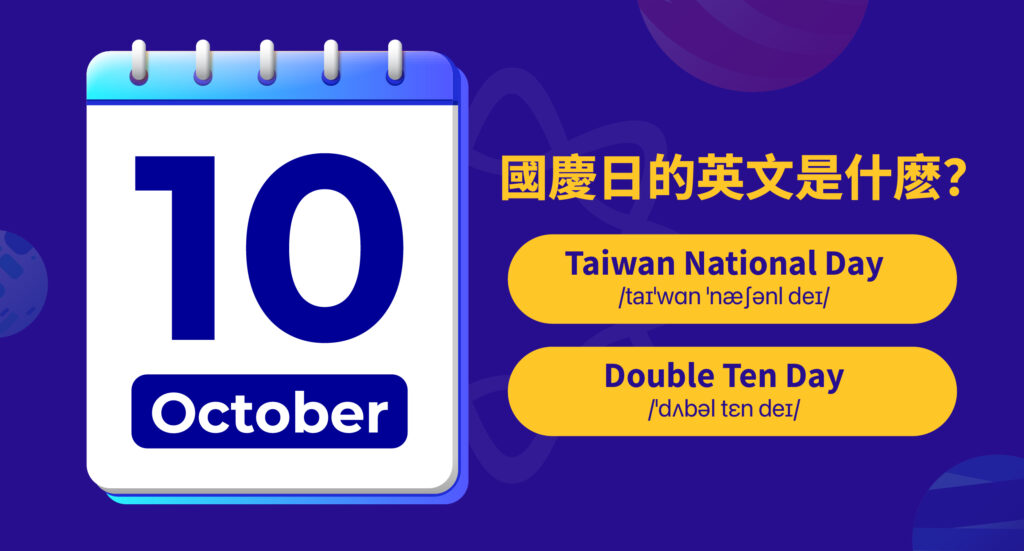
台灣的國慶日英文有3個不同的名稱,包括:
| 詞匯 | 拼音 | 翻譯 |
| Taiwan National Day | /taɪˈwɑn ˈnæʃənl deɪ/ | 台灣國慶日 |
| Double Ten Day | /ˈdʌbəl tɛn deɪ/ | 雙十日 |
| Double Tenth Day | /ˈdʌbəl tɛnθ deɪ/ | 雙十日 |
>>更多節日:
- 有創意的英文新年祝福語,代替 “Happy New Year”
- 中秋節即將來臨!精選 10+ 有意義又簡單的中秋節英文祝福語,兩分鐘立即學會中秋節相關英文詞彙以及中秋節英語話題
- 聖誕節英文祝福語與英語詞彙的最好、最有意義合輯

有關國慶日英文詞彙
| 詞匯 | 拼音 | 翻譯 |
| National Day | ˈnæʃənl deɪ | 國慶日 |
| Republic of China | rɪˈpʌblɪk əv ˈʧaɪnə | 中華民國 |
| Double Ten Day | ˈdʌbəl tɛn deɪ | 雙十日 |
| Celebration | ˌsɛlɪˈbreɪʃən | 慶典 |
| Flag-raising ceremony | flæɡ ˈreɪzɪŋ ˈsɛrɪmoʊni | 升旗儀式 |
| Parade | pəˈreɪd | 遊行 |
| Fireworks | ˈfaɪərˌwɜrks | 烟花 |
| National pride | ˈnæʃənl praɪd | 民族自豪感 |
| Revolution | ˌrɛvəˈluːʃən | 革命 |
| Historical significance | hɪˈstɔrɪkəl sɪɡnɪfɪkəns | 歷史意義 |
| Unity | ˈjuːnɪti | 統一 |
| Patriotism | ˈpeɪtriətɪzəm | 愛國主義 |
| Decorations | ˌdɛkəˈreɪʃənz | 裝飾 |
| National flag | ˈnæʃənl flæɡ | 國旗 |
| Community celebration | kəˈmjunɪti ˌsɛlɪˈbreɪʃən | 社區慶典 |
| Official ceremony | əˈfɪʃəl ˈsɛrɪmoʊni | 正式儀式 |
| Cultural activities | ˈkʌltʃərəl ækˈtɪvɪtiz | 文化活動 |
| Commemorative event | kəˈmɛmərəˌtɪv ɪˈvɛnt | 紀念活動 |
| Civic participation | ˈsɪvɪk pɑːrtɪsɪˈpeɪʃən | 公民參與 |
| Military salute | ˈmɪlɪtəri səˈluːt | 軍禮 |
| Public holiday | ˈpʌblɪk ˈhɒlədeɪ | 國定假日 |
| Local traditions | ˈloʊkl trəˈdɪʃənz | 當地傳統 |
| Historical context | hɪˈstɔrɪkəl ˈkɒntɛkst | 歷史背景 |
| National anthem | ˈnæʃənl ˈænθəm | 國歌 |
| Flag raising ceremony | flæɡ ˈreɪzɪŋ ˈsɛrɪmoʊni | 升旗儀式 |
| National Day Speech | ˈnæʃənl deɪ spiːʧ | 國慶日講話 |
| Military parade | ˈmɪlɪtəri pəˈreɪd | 閱兵 |
| Honor guard | ˈɒnər ɡɑrd | 儀隊 |
| Marching band | ˈmɑrʧɪŋ bænd | 步操樂隊 |
| Air Show | ɛr ʃoʊ | 航展 |
| Fireworks | ˈfaɪərˌwɜrks | 烟花 |
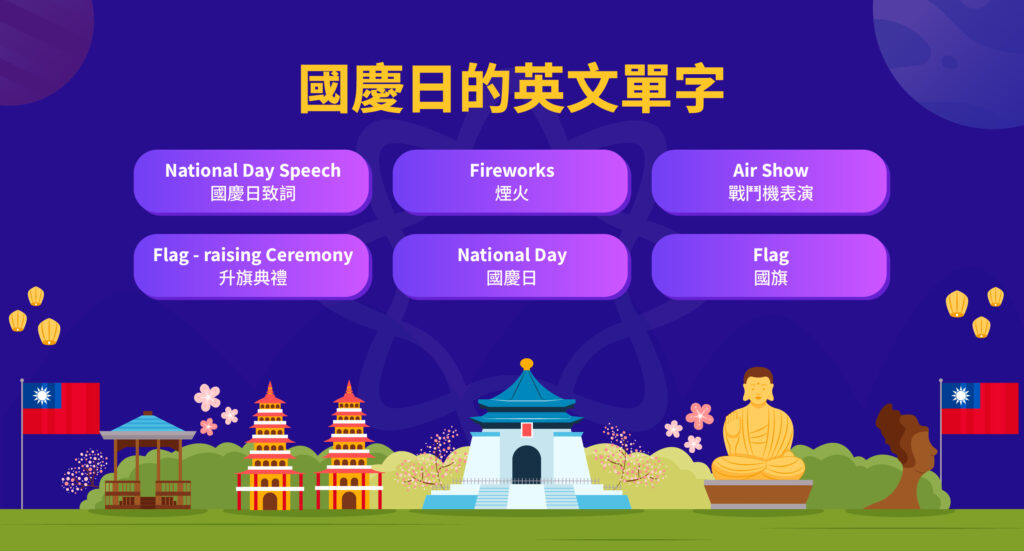
國慶日快樂英文祝福語
| 祝福語 | 翻譯 |
| Joyful Double Ten Day! May the nation continue to thrive in peace and unity. | 雙十節快樂!願祖國繼續和平團結,繁榮昌盛。 |
| Happy National Day! Celebrating the spirit of freedom and democracy that defines the great nation. | 國慶節快樂!頌揚定義偉大國家的自由和民主精神。 |
| On this special day, may there be pride in heritage and optimism for the future. Happy National Day! | 在這個特別的日子裡,願人們對傳統感到自豪,並對未來感到樂觀。國慶節快樂! |
| Happy National Day! Honoring the past, celebrating the present, and embracing a bright future together! | 國慶節快樂!緬懷過去,慶賀現在,共同擁抱美好未來! |
| Wishing peace, happiness, and prosperity on this National Day. Together, building a better future for Taiwan! | 祝國慶節國慶平安、幸福、繁榮。攜手共創台灣美好未來! |
| Happy National Day to the beautiful land and its wonderful people. Wishing you a day filled with pride, joy, and gratitude. | 祝美麗的土地和優秀的人民國慶節快樂。祝您度過充滿自豪、喜悅和感激的一天。 |

有關國慶日英文句型
| 英語句 | 翻譯 |
| National Day in Taiwan is a moment to reflect on the courage and determination of those who fought for our freedom and democracy. | 台灣的國慶日是反思那些為我們的自由和民主而奮鬥的人們的勇氣和決心的時刻。 |
| On this significant day, we not only celebrate our heritage but also commit ourselves to preserving the values of unity and resilience that define our nation. | 在這個重要的日子裡,我們不僅慶祝我們的傳統,還致力於維護定義我們國家的團結和堅韌的價值。 |
| Double Ten Day serves as a powerful reminder of the struggles endured by our forefathers, and it inspires us to continue building a brighter future for Taiwan. | 雙十日有力地提醒了我們先輩們的奮鬥歷程,也激勵著我們繼續為台灣建立更美好的未來。 |
| This National Day, let’s honor the legacy of those who paved the way for our freedom, while also recognizing the responsibilities we hold to ensure a better tomorrow. | 在這個國慶日,讓我們向那些為我們的自由鋪平道路的人的遺產致敬,同時也認識到我們為確保更美好的明天所承擔的責任。 |
| This National Day, let’s come together to celebrate the rich culture and history that make Taiwan unique. | 在這個國慶日,慶祝台灣獨特的豐富文化和歷史。 |

關於國慶日英文範例段落
範例段落一
The National Day of Taiwan, also known as Double Ten Day, commemorates the Wuchang Uprising that began on October 10, 1911, marking the start of the Xinhai Revolution. This day symbolizes the struggle for independence and democracy, as it led to the overthrow of the Qing Dynasty and the establishment of the Republic of China. Celebrated annually, Double Ten Day serves as a reminder of the sacrifices made by the forefathers in their quest for a free and democratic society. It is a time for reflection on the journey toward nationhood and the values that define Taiwanese identity.
翻譯
台灣國慶節,又稱“雙十日”,是為了紀念1911年10月10日爆發的武昌起義,這場起義標誌著辛亥革命的開始。這一天象徵著爭取獨立和民主的鬥爭,因為它導致了清朝的推翻和中華民國的建立。每年慶祝的「雙十日」是為了紀念先輩們為追求自由民主社會所做的犧牲。現在是反思建國歷程和定義台灣身分的價值觀的時候了。
範例段落二
Each year, Taiwan comes alive with vibrant celebrations on National Day. Festivities typically include a flag-raising ceremony at the Presidential Office, followed by a grand parade showcasing the nation’s military prowess and cultural diversity. Various performances, including traditional dances and music, are held in cities across the island, engaging citizens and fostering a sense of community. Fireworks light up the night sky, creating a festive atmosphere that unites people in joy and pride. These celebrations not only honor the past but also inspire hope for a prosperous future.
翻譯
每年的國慶節,台灣都會舉辦熱鬧的慶祝活動。慶祝活動通常包括在總統府舉行升旗儀式,隨後舉行盛大的遊行,展示國家的軍事實力和文化多樣性。島上各城市都會舉辦各種表演,包括傳統舞蹈和音樂,吸引民眾參與並增強社區意識。烟花照亮了夜空,營造出歡慶的氛圍,讓人們團結在一起,充滿歡樂和自豪。這些慶祝活動不僅緬懷過去,也激發了對繁榮未來的希望。
範例段落三
National Day is more than just a public holiday; it embodies the spirit of unity among the people of Taiwan. On this day, citizens from all walks of life come together to celebrate their shared heritage and aspirations. The event emphasizes the importance of solidarity in building a brighter future for the nation. As families and friends gather to partake in various activities, they express their gratitude for the freedoms enjoyed today and reaffirm their commitment to protecting these rights for future generations. This sense of belonging is what makes National Day a cherished occasion for all Taiwanese people.
翻譯
國慶日不僅僅是一個公共假期;它象徵著台灣人民的團結精神。在這一天,來自各行各業的公民齊聚一堂,慶祝他們共同的傳統和願望。這項活動強調了團結一致共同建設國家光明未來的重要性。當家人和朋友聚集在一起參加各種活動時,他們心懷感恩,珍惜當今享有的自由,並重申保護子孫後代權利的承諾。這種歸屬感讓國慶日成為所有台灣人珍惜的節慶。

常見問題
中華民國國慶日英文是什麽?
中華民國國慶日的英文是 National Day of the Republic of China。
雙十節英文是什麽?
雙十節的英文是 Double Ten Day。
以上就是 ELSA Speak 為你帶來的所有國慶日英文知識,希望你能和家人一起度過一個愉快的國慶節,請關注 ELSA Speak 的溝通交流英語專欄裏的其他文章吧!
在日常英語交流中,「Have a nice day」是一個非常普遍且熟悉的社交問候語。一起來和 ELSA Speak 探討have a nice day意思、使用方式、回應方式以及替代「Have a nice day」的短語吧!
Have a nice day意思

「Have a nice day」是常見的問候語,意思是祝你有美好的一天。
如果在說再見時你已經對「Goodbye」很熟悉了,那麼可以試著使用「Have a nice day」。
Have a nice day用法
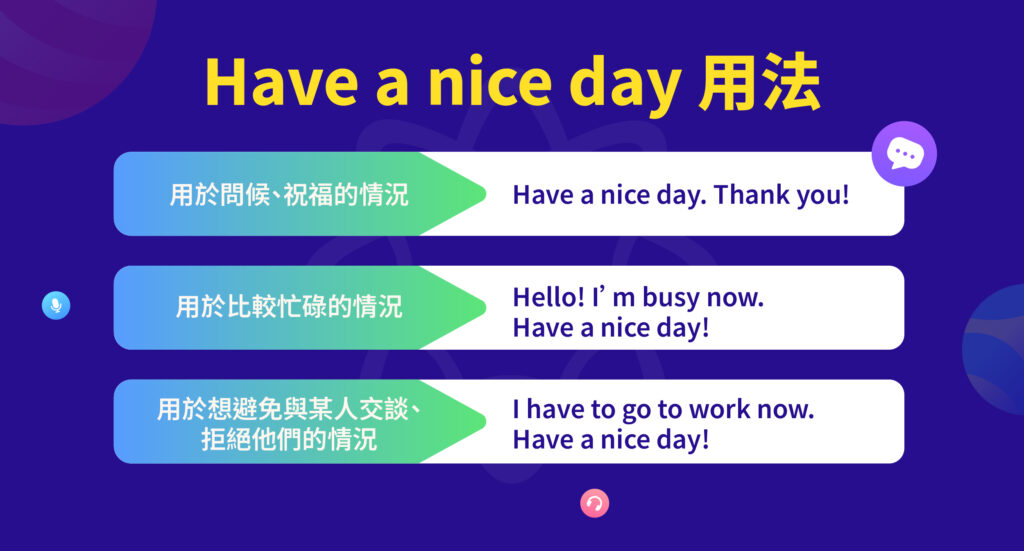
- Have a nice day 通常用在告別時,當你離開商店或餐廳時,員工會用這句話來代替再見。
例子: Have a nice day. Thank you!
大致翻譯: 祝你有美好的一天,謝謝你。
- Have a nice day 也用在你比較忙碌時。當你沒有時間與對方交談時,可以使用這句話作為一個禮貌的告別。
例子: Hello! I’m busy now. Have a nice day!
大致翻譯: 你好,我現在很忙。祝你有美好的一天。
- Have a nice day 還可以用在你不想與某人交談,或拒絕他們時。
例子: I have to go to work now. Have a nice day!
大致翻譯: 我現在必須去工作,祝你有美好的一天。
Have a nice day 回應方式
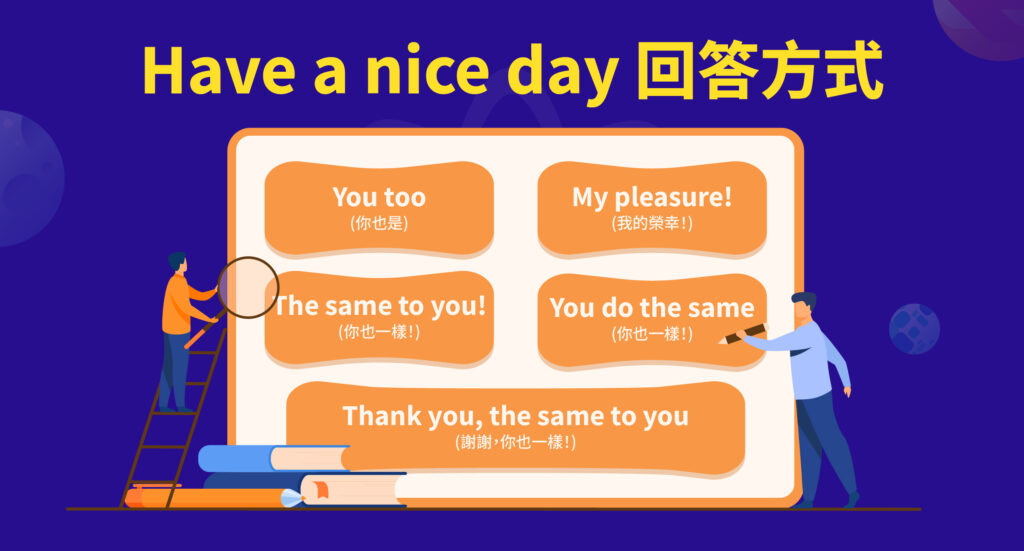
在交流中使用「Have a nice day」時,你可以用以下常見和通用的句子來回應這個問候:
- You too (你也是).
- The same to you! (你也一樣!).
- You do the same (你也一樣哦!).
- My pleasure! (很榮幸!).
- Thank you, the same to you (謝謝,你也是!).
一些替代 have a nice day 的問候語
除了使用「Have a nice day」來說再見之外,你還可以參考使用其他一些問候語,如:
- Goodbye/Bye (再見): 這是一個非常普遍和大家熟悉的問候語。它通常用於對等、較為親密的關係。
- Have a good evening / Have a good night (祝你晚上愉快): 這句話適合用於不太熟悉的人、員工、同事或客戶。它比較正式,可以替代謝謝。
- Farewell: 這是一個非常正式且富有情感的告別語。
- Take care: 這不如「Have a nice day」那麼正式,並且較少使用。
- See you later (期待再次見到你).
- Have a good one: 這是一個友好且輕鬆的告別語,通常在非正式場合使用。
- Good day: 這是一個正式的告別語,通常用於正式場合,如與客戶或高級同事見面時。
- Have a pleasant / happy day ahead: 這句話表達了對未來的關心與美好祝願,適合在禮貌的場合或你想表達特別關心時使用。

使用 have a nice day 的對話
| 說話者 | 對話 | 翻譯 |
| Rose | It’s been great talking to you, but I’ve got to get back to work. | 與你聊天很愉快,但我必須回去工作了。 |
| Patrick | That’s alright. Shall we meet another day? | 沒關係。我們改天再見面,好嗎? |
| Rose | Sure! How about a coffee this weekend? | 當然了!這週末去喝咖啡吧? |
| Patrick | Sounds great! I’ll text you later. | 聽起來不錯!我晚點給你發短信。 |
| Rose | Great! I have to leave now. See you! | 太棒了!我現在得走了。再見! |
| Patrick | See you! Have a nice day! | 再見!祝你有美好的一天! |
| Rose | You too! | 你也是! |

常見問題
Wish you have a nice day 中文是什麼?
Wish you have a nice day 中文是:祝你有美好的一天。
魏如萱 have a nice day 是什麼意思?
Have a nice day 是魏如萱的音樂專輯。
Good morning have a nice day 中文是什麼?
Good morning have a nice day 中文是:早安,祝你有美好的一天。
Hope you have a nice day 中文是什麼?
Hope you have a nice day 中文是:希望你有美好的一天。
May you have a nice day 中文是什麼?
May you have a nice day 中文是:願你有美好的一天。
Have a nice rest of the day 中文是什麼?
Have a nice rest of the day 中文是:祝你今天剩下的時間愉快。
I wish you have a nice day 中文是什麼?
I wish you have a nice day 中文是:我祝你有美好的一天。
閲讀更多:
以上是有關「Have a nice day」的所有知識,由 ELSA Speak 整理彙編,希望這篇文章能幫助你更輕鬆地瞭解have a nice day意思以及正確的 have a nice day 用法。請繼續關注 ELSA Speak 的後續文章就在溝通交流英語專欄裏!
新年來臨,春天將至,這是人們互相傳遞健康、平安與幸福祝福的時刻。與ELSA Speak一起參考2024年最簡短、有創意且有意義的新年快樂英文祝福語吧!
本文中的新單字
| 英文單字 | 發音(IPA) | 翻譯 |
|---|---|---|
| Prosper | /ˈprɒspər/ | 繁榮 |
| Custom | /ˈkʌstəm/ | 習俗 |
| Festive | /ˈfɛstɪv/ | 節慶 |
| Tradition | /trəˈdɪʃən/ | 傳統 |
| Harmony | /ˈhɑːməni/ | 和諧 |
| Revelry | /ˈrɛvəlri/ | 派對 |
| Reconciliation | /ˌrɛkənsɪlɪˈeɪʃən/ | 和解 |
| Ritual | /ˈrɪtʃuəl/ | 儀式 |
| Reunion | /rɪˈjuːniən/ | 團圓 |
| Customs | /ˈkʌstəmz/ | 習俗 |
| Exchange | /ɪksˈtʃeɪndʒ/ | 交流 |
| Blessing | /ˈblɛsɪŋ/ | 祝福 |
| Celebration | /ˌsɛlɪˈbreɪʃən/ | 慶典 |
| Hospitality | /ˌhɒspɪˈtæləti/ | 好客 |
| Greeting | /ˈɡriːtɪŋ/ | 問候 |
| Festivity | /ˌfɛstəˈvɪti/ | 活動 |
| Fireworks | /ˈfaɪəwɜːrks/ | 煙火 |
| Resolutions | /ˌrɛzəˈluːʃənz/ | 決心 |
| Joyfulness | /ˈdʒɔɪfələs/ | 喜悅 |
| Midnight | /ˈmɪdˌnaɪt/ | 午夜 |
| Toast | /təʊst/ | 舉杯 |
| Welcoming | /ˈwɛlkəmɪŋ/ | 迎接 |
| Rejoicing | /rɪˈdʒɔɪsɪŋ/ | 歡樂 |
| Gathering | /ˈɡæðərɪŋ/ | 聚會 |
| Mirth | /mɜːrθ/ | 喜悅 |
| Rituals | /ˈrɪtʃuəlz/ | 儀式 |
| Festive spirit | /ˈfɛstɪv ˈspɪrɪt/ | 節慶精神 |
| Family reunion | /ˈfæmɪli rɪˈjuːniən/ | 家庭團聚 |
| New Year’s resolution | /njuː jɪəz ˌrɛzəˈluːʃən/ | 新年決心 |
| Firecracker | /ˈfaɪərˌkrækər/ | 爆竹 |
| Appreciation | /əˌpriːʃiˈeɪʃən/ | 感激 |
| Celebration of life | /ˌsɛlɪˈbreɪʃən ʌv laɪf/ | 慶祝生命 |
| New Year’s Eve party | /njuː jɪəz iːv ˈpɑːrti/ | 除夕派對 |
| Year-end review | /jɪə-ɛnd rɪˈvjuː/ | 年終總結 |
| Traditional food | /trəˈdɪʃənl fʊd/ | 傳統美食 |
| Decorate the house | /deˈkɔːr.eɪt ðə hɑʊs/ | 家居裝飾 |
| Sweep the floor, clean the house | /swiːp ðə flɔːr, kliːn ðə hɑʊs/ | 打掃家裡 |
| Go to pagoda to pray for… | /ɡoʊ tə pəˈɡoʊdə tə preɪ fɔːr/ | 到廟祈求… |
| Go to flower market | /ɡoʊ tə ˈflaʊər ˈmɑːrkɪt/ | 逛花市 |
| Visit relatives and friends | /ˈvɪzɪt ˈrɛlətɪvz ənd frɛndz/ | 拜訪親友 |
| Exchange New Year’s wishes | /ɪkˈsʌndʒ ˈnjuː jɪrz wɪʃɪz/ | 新年祝福 |
| Dress up | /drɛs ʌp/ | 穿戴漂亮 |
| Prepare five-fruit tray | /prɪˈpɛr faɪv ˈfruːt treɪ/ | 擺放五果盤 |
| Ask for calligraphy pictures | /æsk fɔːr kælɪɡræfi ˈpɪktʃərz/ | 請書法字 |
| Expel evil | /ɪkˈspɛl ˈiːvəl/ | 驅邪 |
| Family reunion | /ˈfæmɪli rɪˈjunɪn/ | 家人團聚 |
| First visit | /fɜːrst ˈvɪzɪt/ | 進家門 |
| Give lucky money to sb | /ɡɪv ˈlʌki ˈmʌni tuː ˈsʌmbədi/ | 給人壓歲錢 |
| Honor the ancestors | /ˈhɒnər ði ˈænsɛstərz/ | 追思祖先 |
| Worship the ancestors | /ˈwɔːʃɪp ði ˈænsɛstərz/ | 祭拜祖先 |
| Watch the fireworks | /wɑːtʃ ði ˈfaɪrˌwɜːrks/ | 觀賞煙火 |
| Receive red envelope | /rɪˈsiːv rɛd ˈɛnvəloʊp/ | 收紅包 |
| Avoid doing sth | /əˈvɔɪd ˈduːɪŋ ˈsʌmθɪŋ/ | 禁忌事項 |
| To make offerings | /tuː meɪk ˈɒfərɪŋz/ | 祭拜 |
| Watch Tao Quan show | /wɑːtʃ ˈtaʊ ˈkwɑːn ʃoʊ/ | 觀看《灶君》節目 |
| Release fish/birds back into the wild | /rɪˈliːs fɪʃ/bɜːrdz bæk ˈɪntu ðə waɪld/ | 放生魚/鳥 |
| Burn joss paper/gold paper | /bɜrn ˈdʒɑːs ˈpeɪpər/ | 燒紙錢 |
| Buy new clothes/new shoes/new household items | /baɪ nuː ˈkluːðz/ | 購買新衣/鞋/家庭用品 |
| Depart | /dɪˈpɑːrt/ | 出門拜年 |
| Send the Kitchen God to heaven | /sɛnd ðə ˈkɪtʃən ɡɑd tə ˈhɛvən/ | 送灶神上天 |
| Picking buds | /ˈpɪkɪŋ bʌdz/ | 摘取新年的第一片福葉 |
| Play chess | /pleɪ tʃɛst/ | 下棋 |
| Visit ancestors’ grave | /ˈvɪzɪt ˈænsɛstərz ɡreɪv/ | 掃墓 |
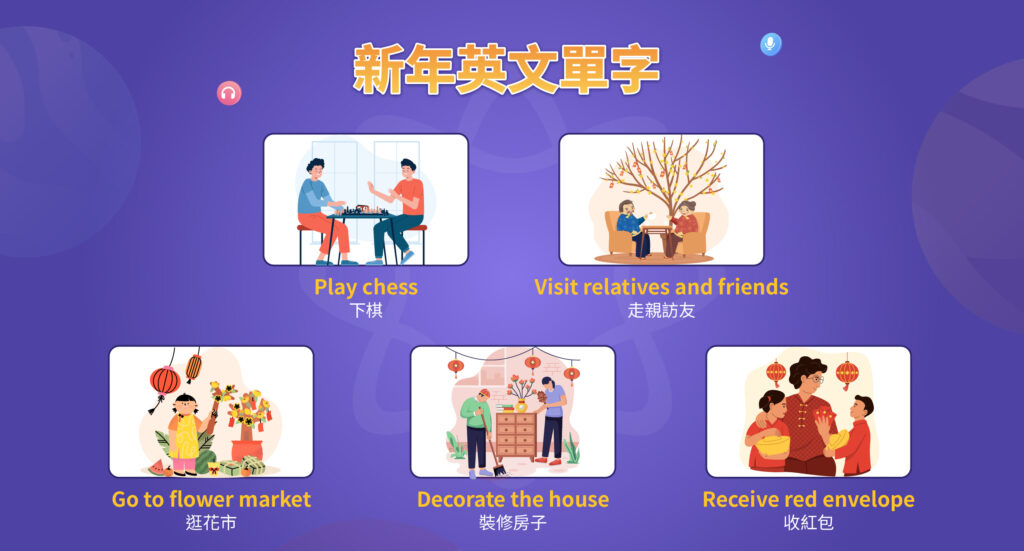
簡短的新年快樂英文祝福語
| 祝福語 | 翻譯 |
| Happy New Year! | 新年快樂! |
| Happy Lunar New Year! | 祝賀農曆新年。 |
| May all your new year wishes come true. | 願你在新的一年裡,所有的願望都成真! |
| Wishing you all the magic of the new year. | 希望新的一年裡,好運常伴你左右。 |
| Security, good health and prosperity. | 安康繁榮。 |
| A myriad things go according. | 萬事如意。 |
| Congratulations and be prosperous. | 恭喜發財。 |
| Plenty of health. | 祝你在新的一年身體健康。 |
| Money flows in like water. | 財源滾滾。 |
| Wishing you health and happiness in the year to come. | 祝你在新的一年身體健康,幸福美滿。 |
| Live up to 100 years. | 長命百歲。 |
| I hope that the coming year brings you peace and prosperity. | 希望新年能為你帶來平安與繁榮。 |
| Cheers to the New Year! May 2024 be an extraordinary one. | 新年快樂!希望 2024年對你來說是特別的一年。 |
| Life is short. Dream big and make the most of 2024! | 人生短暫,夢想無限,請在 2024年勇敢追逐夢想吧! |
| It is time to forget the past and celebrate a new start. Happy New Year! | 是時候放下過去,迎接新的開始了。新年快樂! |
| Happy New Year! I hope all your endeavors in 2024 are successful. | 新年快樂,願你在 2024年所有的努力都能取得成功。 |
>>相關内容:總結 100+ 最經典、最有意義的英文短句唯美關於生活、愛情
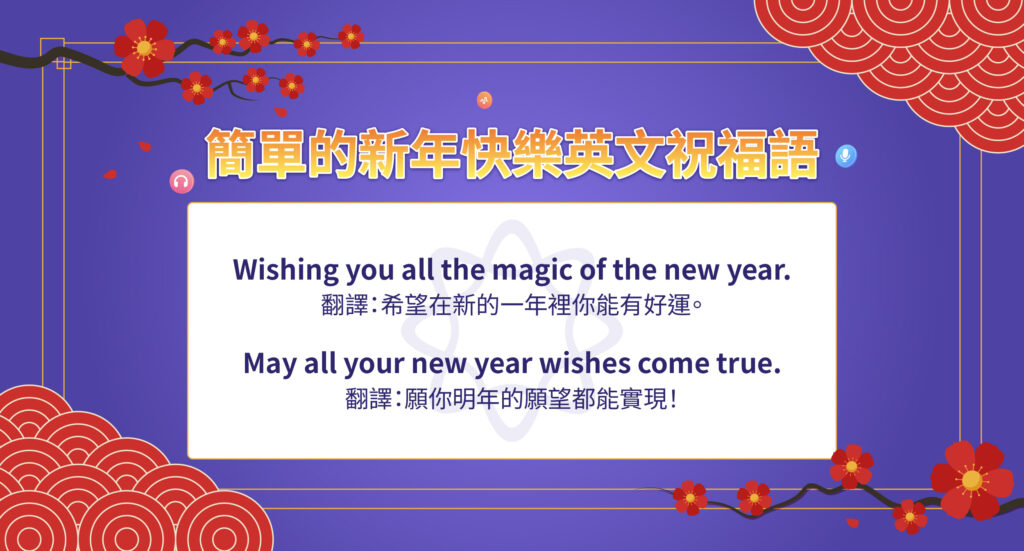
好聽且有意義的新年快樂英文祝福語
| 祝福語 | 翻譯 |
| May you and your family have happiness and prosperity in the New Year. | 祝你和家人新年快樂,幸福繁榮。 |
| Have a great New Year’s celebration with your family. | 祝你度過一個美好且與家人在一起的新年假期。 |
| To be with you, every moment is a special time. I wish you a very happy New Year. | 有你在身邊,每一刻對我來說都是特別的。祝你新年快樂。 |
| An old year passed, a new year has come. I hope you will achieve your dreams. | 舊年已過,新年將至。願你的夢想在新的一年裡得以實現! |
| May you and your beloved people have a wonderful time in the new year. | 祝你和你的親人在新年裡度過美好的時光。 |
| I hope that in years you will have good health, plain sailing in your work and your life. | 祝你新年健康,工作和生活一帆風順。 |
| Every dream comes true with you on new year days. Happy New Year, with my love. | 願你在新年裡的所有夢想都成真。新年快樂,我的愛! |
| May the new year bring to you love and luck on your path towards your choice. | 願新年為你帶來愛情,並在你選擇的道路上一路順風。 |
| In this New Year, I wish you to achieve all your goals in life, and get success at every step of life, enjoy a wonderful 2024. | 在新的一年裡,願你實現人生目標,在每個階段都取得成功,享受 2024年的美好時光。 |
| Forget the pains, sorrows, and sadness behind, Let us welcome this New Year with a big smile, Wishing you a Happy New Year! | 讓我們忘掉所有的痛苦、煩惱和悲傷,帶著燦爛的笑容迎接新年吧。新年快樂! |

送給家庭的新年祝福語英文
| 祝福語 | 翻譯 |
| I feel very lucky because my family always supports me. I want to wish you a happy new year for my fantastic family! | 我感到非常幸運,因為得到了家人的支持。我想祝福我的家人新年快樂,幸福美滿! |
| I waited a whole year just for this time to return to my lovely home to celebrate New Year’s Eve with my dear family. Happy New Year everyone! | 我等了一整年,終於可以回到溫暖的家,與我親愛的家人一起迎接新年。大家新年快樂! |
| Thank you everyone for always loving me. Wishing our family a happy new year, peace and prosperity. | 感謝大家一直以來的愛護。祝福家人新年安康繁榮。 |
| It’s great that I’m a part of my family. I love you all. Happy New Year! | 能成為這個家庭的一員真是太好了。我愛你們每一個人。新年快樂! |
| Happy New Year to my family! Here’s to a year full of joy and laughter! | 祝我們家在新的一年裡,永遠快樂幸福! |
>>相關内容:中秋節即將來臨!精選 10+ 有意義又簡單的中秋節英文祝福語,兩分鐘立即學會中秋節相關英文詞彙以及中秋節英語話題

送給父母的新年祝福語英文
| 祝福語 | 翻譯 |
| I wish you happiness, good health, and well-being from the bottom of my heart! | 從心底祝福爸爸媽媽永遠幸福,身體健康,平安如意。 |
| I’d like to thank you for lifting me every time I am down and encouraging me to move forward. Have a beautiful year! | 感謝爸爸媽媽每當我跌倒時都扶我一把,並且總是鼓勵我向前進。祝我的親愛的父母新年快樂! |
| I hope our New Year celebrations are full of love and laughter. Wishing you all a fun-filled and healthy life! | 希望我們的家在新的一年裡,永遠充滿愛與笑聲。祝爸爸媽媽永遠快樂幸福! |
| Happy New Year! Thank you for everything you do for me. Wishing you good health! | 新年快樂,爸爸媽媽,感謝你們為我所做的一切。願你們身體健康! |

送給祖父母的新年快樂英文祝福語
| 祝福語 | 翻譯 |
| Wishing you a joyful and prosperous Lunar New Year, grandma and grandpa! | 祝爺爺奶奶新年快樂,繁榮昌盛。 |
| May the new year bring happiness and good fortune to my grandparents! | 願新的一年為爺爺奶奶帶來更多的幸福與好運。 |
| Wishing you a healthy and joyful Tet, grandpa and grandma! | 在這個新年,我祝爺爺奶奶身體健康,幸福美滿。 |
| Sending my warmest wishes to my beloved grandparents on this Lunar New Year! | 值此農曆新年,敬上我最美好的祝福給爺爺奶奶。 |
| Happy New Year, grandparents! Wish you many more healthy years ahead, living to a hundred years old. | 新年快樂,爺爺奶奶!祝你們身體健康,長命百歲! |

送給愛人的新年祝福語英文
| 祝福語 | 翻譯 |
| We spent a wonderful year together. I hope my love will always be happy and be with you forever! | 我們一起度過了一個美好的年頭。願我的愛人永遠幸福,與我長相廝守! |
| Wish you a more beautiful new year and always love me like now! | 願你在新的一年裡更加美麗,永遠像現在這樣愛我! |
| You don’t know how important you are to me. Happy New Year my honey. I love you! | 你不知道你對我有多麼重要。新年快樂,我愛你! |
| You helped me feel the true love of life. Happy New Year, I really love you! | 你讓我感受到了生活中的真愛。新年快樂,我愛你。 |
| Another year filled with sweet memories and joyous time has passed. You have made my year very special, and I wish for you to continue to do so. With you around, every moment is a special occasion for me. I love you, and wish you a very Happy New Year. | 又一個充滿甜蜜回憶與快樂的年頭過去了。你讓我的一年變得如此特別,我希望這能一直延續下去。有你在身邊,每一刻都是特別的。我愛你,祝你新年快樂! |
| We spent a wonderful year together. I hope my love will always be happy and be with you forever! | 我們一起度過了一個美好的年頭。願我的愛人永遠幸福,與我長相廝守! |
| You made all my wishes come true last year. For the coming year and all the years after that, my only wish is that you will be with me forever. Happy New Year! | 你在過去的一年裡,實現了我所有的夢想。在新的一年和未來的歲月裡,我唯一的願望就是你能永遠陪伴在我身邊。祝你新年快樂! |
| I want to give you all the best wishes in the new year for you. Hope that we will be together and have a nice new year! | 老公想要送給老婆新年的美好祝福,願我們永遠相伴,共度幸福新年。 |
| New year, I just wish you lots of health. As for happiness and joy, I hope that I will be the one to bring those things to you. Love you so much! | 在新的一年裡,我只希望你有健康的身體,至於幸福和快樂,我會為你帶來。愛你! |
| One year being with you is the best thing in my life. Hopefully we will hold hands together for 365 more beautiful days. I wish you a warm new year! | 能與你共度一年是我生命中最美好的事情。希望我們能再攜手走過美好的 365天。祝你新年溫暖幸福! |
>>相關内容:

送給朋友的新年快樂英文祝福語
| 祝福語 | 翻譯 |
| A New Year, a new start and way to go! Wish you a successful and glorious New Year! | 新的一年,新的開始,新的道路,祝你取得成功,輝煌燦爛。 |
| Wishing you much prosperity, good health and good luck! | 祝你新年繁榮昌盛,身體健康,萬事如意! |
| I wish that you achieve all your life goals and find success at every step. Happy New Year! | 祝你實現所有人生目標,並在每一個步伐中取得成功。新年快樂。 |
| All I treasure is our friendship and wish you find the coming year as wonderful as our friendship. | 我們的友誼是我最珍惜的一切。希望你能有一個像我們友誼一樣美好的新年。 |
| Wish you and your family a joyful, healthy, prosperous and happiest new year ahead! Happy New Year. | 祝你和家人新年快樂,健康,繁榮,幸福。新年快樂! |
| May the new year bring to you warmth of love, and a light to guide your path towards a positive destination. | 希望新年能帶給你愛的溫暖,並有光明指引你走向美好的事物。 |
| I hope that the new year will be the best year of your life. May all your dreams come true and all your hopes be fulfilled! | 希望新年成為你人生中最好的一年。願你的夢想成真,所有希望都能實現。 |
| Remember all the good memories you have made and know that your life will be so full of wonders in the coming year. Happy New Year! | 請永遠記住那些美好的回憶,並記得你的人生在新的一年裡將充滿奇蹟。新年快樂。 |
| The past year has been a special year in my life because I met you. Wish you and your family a happy new year! | 過去的一年對我來說很特別,因為我遇到了你。祝你和家人新年幸福快樂! |
| I am fortunate to have friends who bring so much joy to this life. I can’t imagine what it would be like without you cheering me on. Have a great New Year’s celebration. | 我真的很幸運有你這樣的朋友,帶來許多歡樂。如果沒有你的鼓勵,我無法想像會怎樣。祝你有一個美好的新年假期。 |
>>精彩内容:總結50+最有意義的生日快樂英文祝福

送給上司的新年祝福語英文
| 祝福語 | 翻譯 |
| Happy New Year my boss! May your leadership continue to guide us to success. | 新年快樂,老闆,希望您的英明領導能繼續帶領我們走向成功。 |
| Wishing you a Lunar New Year filled with prosperity, health, and great success. Happy New Year! | 祝老闆新年繁榮昌盛,身體健康,事業有成。新年快樂! |
| May the New Year bring you endless opportunities and many new achievements. Happy Lunar New Year! | 希望新年能為老闆帶來更多的機會和新的成就。新年快樂! |
| Looking forward to another year of professional growth under your leadership. Happy New Year! | 期待在老闆的領導下,又迎來一個蓬勃發展的新年。新年快樂! |
| Happy New Year! Wishing you a year of tremendous success in your career and an abundance of happiness and peace at home with your family. | 新年快樂!願您在新的一年裡事業蒸蒸日上,與家人共度幸福安康的時光。 |
| Happy Lunar New Year! May your year be as wonderful and inspiring as you are. | 祝賀農曆新年!希望老闆度過一個與您同樣富有靈感的美好新年。 |
| Wishing you a prosperous and joyful Lunar New Year. Your leadership is a true inspiration to us all. | 祝老闆新年繁榮昌盛,笑口常開。您的領導力是我們的靈感來源。 |
| May this Lunar New Year bring you success, health, and happiness. Thank you for your guidance and support through the past years. | 希望新年為您帶來更多的成功、健康和幸福。感謝您在過去一年中對我們的指導和支持。 |
| May this New Year bring you more happiness, health, and prosperity. | 希望新年能為老闆帶來無盡的快樂、健康和繁榮。 |
| The past year working with the Boss has been a blessing for me. Wishing you boss a warm and meaningful Tet holiday. | 能和老闆共事的一年是我的幸運。祝老闆新年溫暖而充滿意義。 |

送給客戶與合作夥伴的新年快樂英文祝福語
| 祝福語 | 翻譯 |
| From the bottom of our hearts, we would like to wish you a New Year filled with good health, success in business and new achievements. Happy New Year! | 從心底裡祝願我們尊敬的客戶在新的一年裡身體健康,事業有成,並取得更多的新成就。新年快樂! |
| Thank you for being our customer. We look forward to serving you in 2024 and wish you peace, happiness, and abundant good health in the new year. | 感謝您成為我們的客戶。很榮幸在2024年為您服務,並祝願您新年平安、幸福、健康。 |
| Thank you for all the work and trust in us. We are looking forward to a New year filled with more work and opportunities from you. Happy New Year! | 感謝您對我們的工作以及信任。新年快樂! |
| We sincerely wish you a wonderful and happy new year! Let the coming year be filled with prosperity and contentment! We wish you good luck and reach your goals in 2024! | 真誠祝願您有一個美好而幸福的新年!願新年充滿繁榮與圓滿!我們祝願您在 2024年幸運連連,實現所有目標! |
| May this 2024 bring you and your company success, happiness and prosperity. May all your dreams and plans turn into reality and all your efforts come into great achievements. Happy New Year! | 希望 2024年能為您和您的公司帶來更多的成功、幸福與繁榮。願您所有的夢想和計劃都能實現,所有的努力都能收穫成果。 |
| [Company name] wishes you peace, joy and prosperity throughout the coming year. Thank you for your continued support and partnership. We look forward to working with you in the years to come. | 【公司名稱】祝您新年平安、快樂與繁榮。感謝您持續支持和與我們合作。我們期待在未來的日子繼續與您合作。 |
| Thank you for using our company’s services/products. Wish you all the best in the new year! | 感謝您選擇我們公司的服務/產品。祝您新年萬事如意! |
| Thanks for being such a wonderful customer the entire year. May prosperity and blessings come your way this new year! Happy new year! | 感謝您過去一年中成為我們的尊貴客戶。祝您新年繁榮昌盛,福氣滿滿。新年快樂! |
| Your support has been the key ingredient to our success. Thank you for being our customer and for all your cooperation. We wish you a happy new year! | 您的熱情支持是我們成功的重要一環。感謝您成為我們的客戶和合作夥伴。祝您新年安康、繁榮! |

送給老師的新年祝福語英文
| 祝福語 | 翻譯 |
| Happy New Year to my dear teacher. Hope this New Year you succeed, prosper and be happy forever! | 親愛的老師,新年快樂!願新的一年帶給您成功、事業興旺和永遠的幸福! |
| I hope that in the new year, you will have many more achievements in your teaching career! | 希望在新的一年,老師能在教學事業上取得更多的成就! |
| On the occasion of New Year, wishing your family happiness in the New Year and everything is the best! | 值此新年之際,祝願老師和家人新年快樂,萬事如意! |
| Dearest teacher, you provided me with knowledge that lights the way to success. Blessing for the New Year | 敬愛的老師,您給了我很多知識,照亮了我通往成功的道路。祝老師新年平安! |
| I’m lucky to have a wonderful teacher like you. Hope your New Year is as wonderful as you are. | 我很幸運能成為一位如此了不起的老師的學生。祝您新年充滿幸福! |
| May your New Year be as rewarding as my time in class with you has been. Best wishes to an awesome teacher. | 祝老師新年和美好時光一樣精彩,就像我在課堂上跟您一起度過的時光。送上我最美好的祝福給我最敬愛的老師! |
| Thank you for teaching me so many things. Happy New Year! | 感謝您教會我這麼多。祝您新年快樂! |
| Before you were my teacher, I found school boring. Then you came along and filled me with enthusiasm. Thanks and Happy New Year. | 在遇到您之前,我一直覺得上學很無聊。您讓我對學習充滿熱情。非常感謝您,老師,新年快樂! |
| As the New Year approaches, I thank all those who made a difference in my life. Thank you, teacher. | 新的一年來臨,我要感謝老師,您讓我的生活變得不一樣。非常感謝您,老師! |
| Wish my teacher a new year full of health and prosperity to your family! | 祝老師新年健康,闔家幸福,萬事如意! |
>>相關内容:happy teacher’s day:100+ 種最美,最有意義的祝福語

一些優美的英文诗句祝賀新年
| 詩句 (English) | 作者 (Author) | 翻譯 |
| Stir the eggnog. Lift the toddy.Happy New Year, everybody!Ring out the old, ring in the new,Ring, happy bells, across the snow:The year is going, let him go;Ring out the false, ring in the true. | Alfred Lord Tennyson | 攪拌雞蛋酒,抱起孩子,新年快樂,向大家致以祝福!讓舊年逝去,迎接新年,快樂的鐘聲穿透厚的積雪:舊年已去,讓它隨風而逝;讓錯誤過去,迎接正確。 |
| Another fresh new year is hereAnother year to live!To banish worry, doubt, and fear,To love and laugh and give! | William Arthur Ward | 又一個光明的新年來臨,又一個新的一年要活!驅散憂慮、懷疑與恐懼,去愛、去大笑、去付出! |
| Congratulations! Today is your day.You’re off to Great Places! You’re off and away!You have brains in your head. You have feet in your shoes.You can steer yourself any direction you choose. | Dr. Seuss | 恭喜你!今天是屬於你的日子。你已經到達了偉大的地方!你將繼續前行!你的腦海裡裝滿了智慧,你的雙腳合適鞋子。去走你所選擇的路吧!~蘇斯博士 |
| Tonight’s December thirty-first,Something is about to burst…Hark, it’s midnight, children dear.Duck! Here comes another year! | Ogden Nash | 今晚,12月31日,某些東西準備好要轟然作響……聽著,孩子們,午夜已至。快來!又一個年頭即將過去!~詩人奧格登·納什 |

一些關於新年的英文範文
範文 1
Chinese new year is a traditional Chinese festival. We also call it the spring festival. It is on lunar january 1st. On New year’s eve, all the people sit around the desk and have a big family dinner. There are some vegetables, some fish, some meat, some fruits and some drinks like juice, coke, pepsi and some nice wine. Overall, this is a good and delicious dinner.
After dinner, we always watch tv new year programmes. We had a wonderful evening on New year’s eve. On the first day of the spring festival, most people get up early and say “happy new year” to each other. For breakfast, people often eat dumplings and baozi. After breakfast, people often make many delicious foods, and children often play cards, computer games and fireworks. On the second and third day, we visited friends and relatives. Everyone is busy on chinese new year, and everyone is happy, too.
翻譯
農曆新年是中國人的一個傳統節日,也被稱為春節。它在農曆正月初一慶祝。在除夕夜,大家圍坐在餐桌旁,一起享用豐盛的家庭晚餐。晚餐包括多種菜餚,如蔬菜、魚、肉、水果,以及果汁、可口可樂、百事可樂和一些美酒。總的來說,這是一頓美味又精彩的晚餐。
晚餐後,我們通常會觀看春節電視節目。我們在除夕夜度過了一個愉快的晚上。在春節的第一天,大部分人早起並相互祝福“新年快樂”。早餐時,大家通常吃餃子和包子。早餐後,人們開始準備更多的美食,而孩子們則玩紙牌、電子遊戲和放鞭炮。在第二天和第三天,我們會拜訪朋友和親戚。每個人在春節期間都非常忙碌,大家都很開心。
範文 2
Amongst the special holidays in my country, New Year is my favorite one. New Year is an occasion for everyone to get together in a warm and exciting atmosphere. Before New Year, everyone prepares many things like plants or foods and decorates their house. I plant a lot of beautiful flowers in front of my house and buy clothes, foods in preparation for New Year. Besides, most of the streets are beautifully decorated with colorful lights and flowers. During New Year, I spend much time visiting my relatives, friends, and colleagues, especially in the first 3 days. I give them sincere wishes for the new year. New Year is also a period when children can receive lucky money. There is a funny thing that people try to avoid arguments or saying any bad things throughout New Year, which makes the New Year atmosphere like heaven to me. I love New Year!
翻譯
在我國眾多的節日中,我最喜歡的是農曆新年。新年是一個讓大家聚在一起的機會,氛圍既溫馨又激動。在新年前,大家會準備很多東西,比如盆栽和食物來裝飾家園。我會在家門前種上漂亮的花朵,並購買新衣和食物來迎接新年。除此之外,幾乎所有的街道也都裝飾得五彩繽紛,掛滿了彩燈和鮮花。新年期間,我會花很多時間拜訪親朋好友,特別是在前三天。我誠心地祝願他們新年快樂。新年也是孩子們收到壓歲錢的時候。有趣的是,大家在新年期間都盡量避免爭吵或說壞話,對我而言這讓新年的氛圍像天堂一樣美好。我愛新年!
範文 3
Lunar New Year is a special occasion when all family members gather to celebrate the beginning of a new year.. New year is mostly held at the end of January and the beginning of February. People usually prepare special traditional food, clean, repaint the house and spend time with family and friends. Almost all families buy peach or apricot blossoms to decorate the house. People visit relatives’ houses on the first day of the new year and give lucky money to children or the elderly. All Taiwanese love this period of time so much and look forward to it every year.
翻譯
農曆新年是一個特殊的時刻,所有的家庭成員會在新年初聚在一起。農曆新年通常在一月底或二月初慶祝。大家會準備特別的傳統美食,清掃、粉刷房屋,並與家人和朋友共度時光。幾乎每家每戶都會買桃花或梅花來裝飾家中。在新年第一天,大家會拜訪親戚,並給孩子或長輩發紅包。所有台灣人都非常喜愛這段時光,並期待著每年的農曆新年。
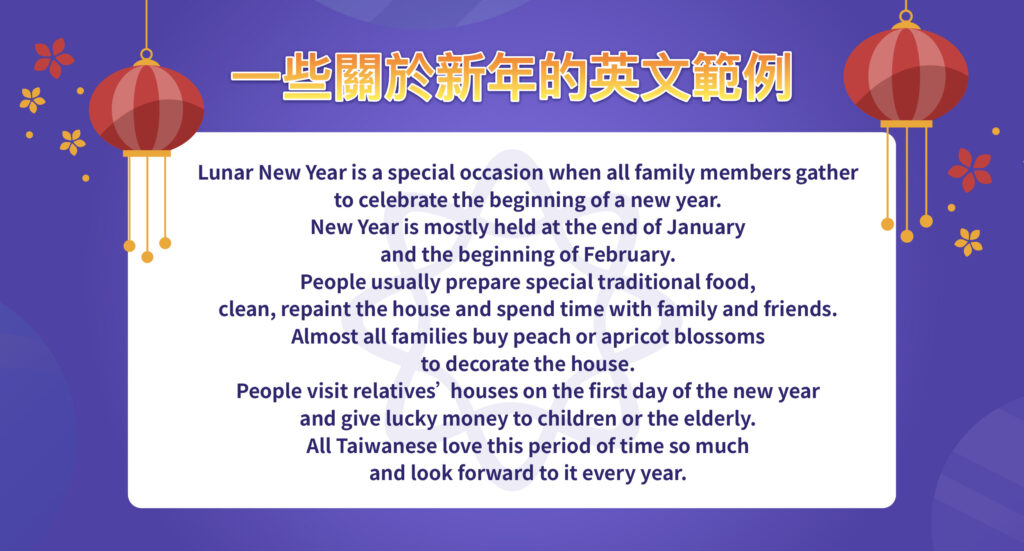
常見問題
迎接新的一年英文是什麽?
迎接新的一年 的英文是 Welcoming the New Year 或 Embracing the New Year.
提前祝你新年快樂 英文是什麽?
提前祝你新年快樂 的英文是 Wishing you a Happy New Year in advance.
以上是 ELSA Speak 整理的關於新年快樂英文祝福語的文章, 希望在閱讀完這篇文章後,您能與家人、朋友共度一個愉快的節日。請繼續關注 ELSA Speak 的後續文章,更新在溝通交流英語專欄哦!
英語絕對是不可或缺的要求。因此,學英文對許多人來說可能是一個很難的挑戰。與 ELSA Speak 一起了解在家有效的自學秘訣 英文方法!
在家學習英語的好處
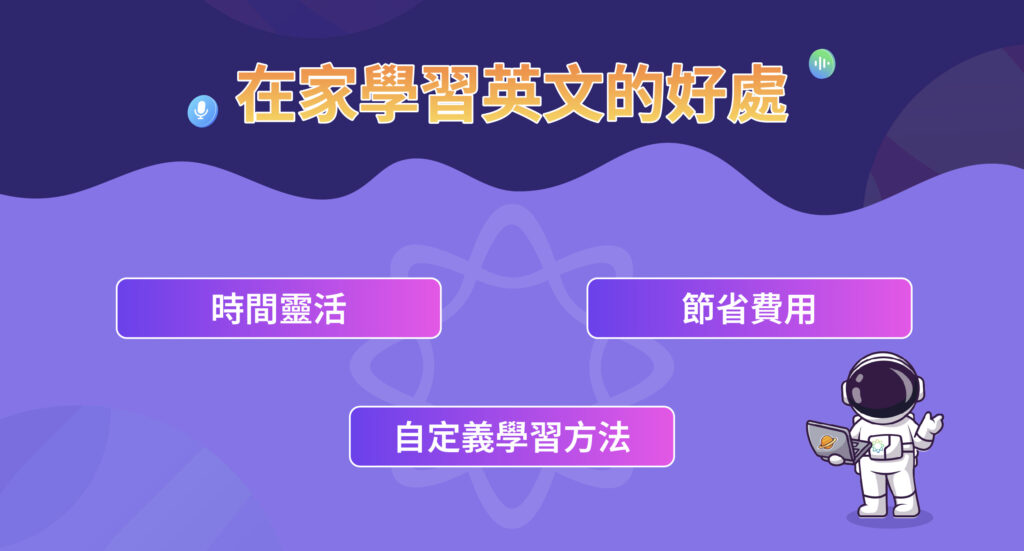
- 時間靈活:你可以按照自己的步調安排學習時間,符合你的個人日程,幫助你更好地維持學習。
- 隨便調整你的學習方法:自學時,你可以選擇最適合你學習風格的方法。無論是通過視頻、播客還是書籍,這都可以幫助你更有效、更愉快地吸收知識。
- 節省成本:在家自學英語有助於節省學費和走行費用,你可以使用許多免費的線上資源,從視頻到電子書,不但可以幫助提高你的技能,而且不需要花很多費用。
在家自學英文最有效的秘訣
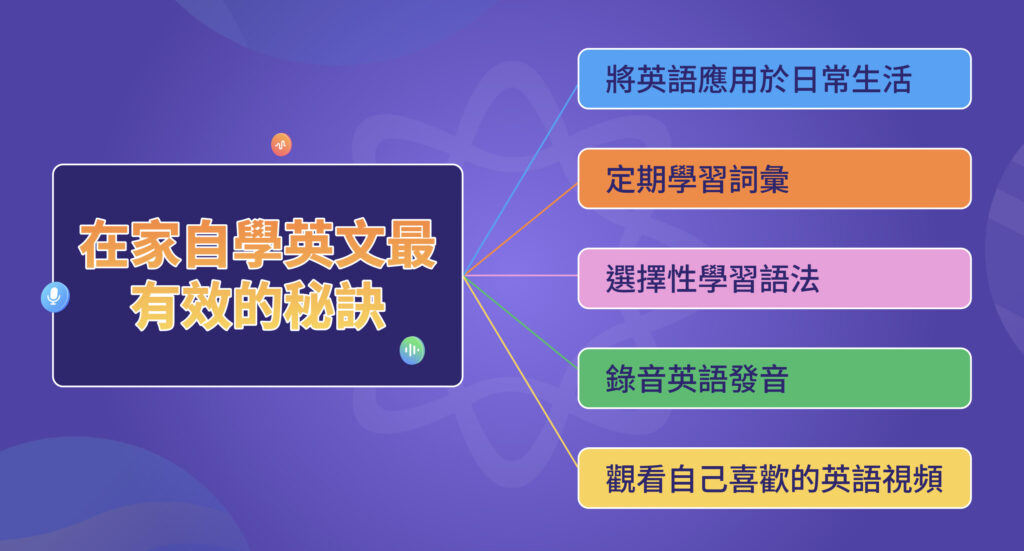
將英語帶入日常生活中
英文中有一個成語Use it or loss it,強調經常使用知識以免忘記。要有效地學習英語,你應該將知識應用到日常生活中。你可以從用英語命名周圍的物體開始。例如,在做飯時,你可以學習kitchen(廚房—)、pan(平底鍋)和saucepan(深平底鍋)等詞彙。
當你知道如何馬上説出來單詞後,你可以通過學習詞彙的詞類來提升你的技能,了解哪些是名詞(noun)和動詞(verb)以更好的練習造句句子。
例如:如果你想形容炎熱的天氣,除了說 It’s hot today!你可以說 It’s scorching weather! 來表達更炎熱的。
日積月纍的風格學習英語詞匯
詞彙是流利地使用英語最重要的因素,尤其是在溝通中。平均而言,你需要 3,000 – 10,000 個詞彙才能達到基礎水平。為了有效地學習英文單字,你應該按主題劃分詞彙並定期複習。使用記筆記,flashcard等方法,或在使用 ELSA Speak 應用程式進行學習,利用您選擇的時間的學習提醒功能或幫助您創建自己喜歡的單字清單的課程集功能。
>>更多單詞:綜合100+ 多益單字涵蓋所有主題,助你達到理想的分數。

有選擇性地學習語法
學校裡常常過度注重英語語法,導致大量時間花在枯燥的知識上。以有效地學習語法,請專注於常用知識,並通過閱讀和聽力英語材料來應用它。
學習文法的技巧:
- 憑記憶做筆記:先閱讀,後寫在紙上,不看文檔以增加記憶。
- 查閱以深入理解:了解台灣語解釋並做額外筆記。
- 用你自己的話語解釋:用你自己的話語重新表達句子模式。
- 做應用練習:通過選擇題、填空等不同類型的練習來鞏固知識。
錄音英語發音
初級英語發音學習時,從國際音標開始,使用發音練習視頻以可以正確學習。多次錄音並回聽以糾正錯誤。
一些常見錯誤:
- 不學IPA音標:只學字母表是不夠的,需要清楚了解IPA國際音標才能正確發音。
- 錯誤的重音:錯誤的重音會改變單字的意思。例如present(PREsent – 名詞)和preSENT(動詞)。
- 忽略結尾聲音:結尾聲音對於區分單字非常重要。例如thing, think和 thin。如果省略結結尾聲音,可能無法正確理解。
觀看有關您最喜歡的主題的英語視頻
看英語視頻是練習聽力和學習生詞的有效方法。為了保持這個習慣,請選擇有關你喜歡的主題(例如烹飪)或與你的工作相關的視頻。避免過於學術化的話題,以免降低興趣。
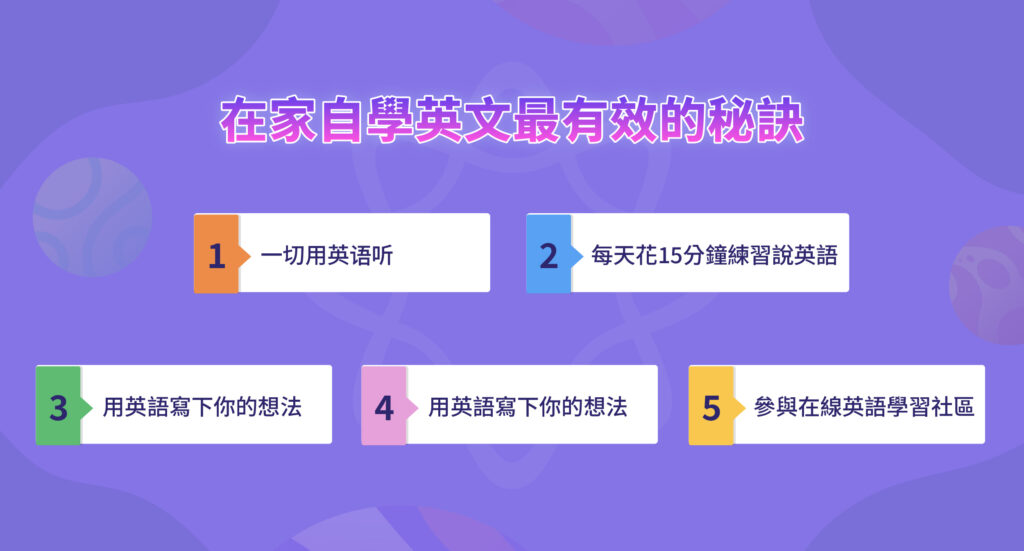
一切用英语听
英語聽力練習不僅限於考試或練習。你可以在空閒時間聽任何內容,以提高你的聽力反應。從短視頻,適中的節奏,簡單的詞彙開始。使用帶有字幕的 YouTube 頻道或英語學習播客、聽英語音樂或了解英語廣播電台的新聞。
請依照以下 4 個步驟有效地練習聽力:
1. 練習沒有字母進行聽力以熟悉語音和對話。
2. 確定主要關鍵詞以掌握句子的主要思想。
3. 一邊看字幕一邊聼以了解整個內容並分析未聽過的部分。
4. 關閉字幕再次看視頻以檢查進度。
每天花15分鐘練習說英語
口語技能很重要,但常常被忽視,尤其是在家學習英語時。為了提高口語能力,你可以每天對著鏡子練習說話,記錄你說的話以供評估,並養成用英語思考的習慣,而不是從台灣語翻譯成英語。當你遇到人、事或聽到聲音時,立即用英語思考或說話。儘管一開始你可能會犯錯誤,但定期練習將幫助你更信心並快速提高口語能力。
ELSA Speak 是一個可以幫助你每天練習口語 15 分鐘的應用程序,並在你每天選擇的時間提供學習提醒功能。
線上閱讀英文報紙和故事
要自然地使用英語,你需要定期從The New Yorker, The Guardian等知名來源或blog和故事中補充詞彙。在閱讀中保存好的詞彙和結構以便以後複習,有助於記住使用的語境。你可以使用 ELSA Speak – 英語-台灣語字典,其中包含英語發音和聽力單字。保持日常閱讀習慣將有助於提高你在生活中使用英語的能力。
養成用英語寫下你的想法的習慣
寫作是一項困難的技能,需要時間來提升。為了看到進步,你應該定期練習寫作,最好是每天練習。首先用英文寫一篇簡短的日記,記錄你在工作和生活中的感受。如果你在詞彙方面有困難,請每天練習寫簡單的句子,例如「I can sleep more than my sister 或者 I can’t wake up at 6 AM。至少花 30 分鐘或空閒時間用英語寫下你的想法。
加入線上英語學習社區
除了專業因素外,學習過程中保持積極的態度、心理的穩定性和毅力也很重要。在家學習英語時,你既是學習者,也是自己學習過程的監督者。為了能夠同時完成這兩項任務,不要害怕尋求英語學習社群的支持。
成年人學習英語的方法
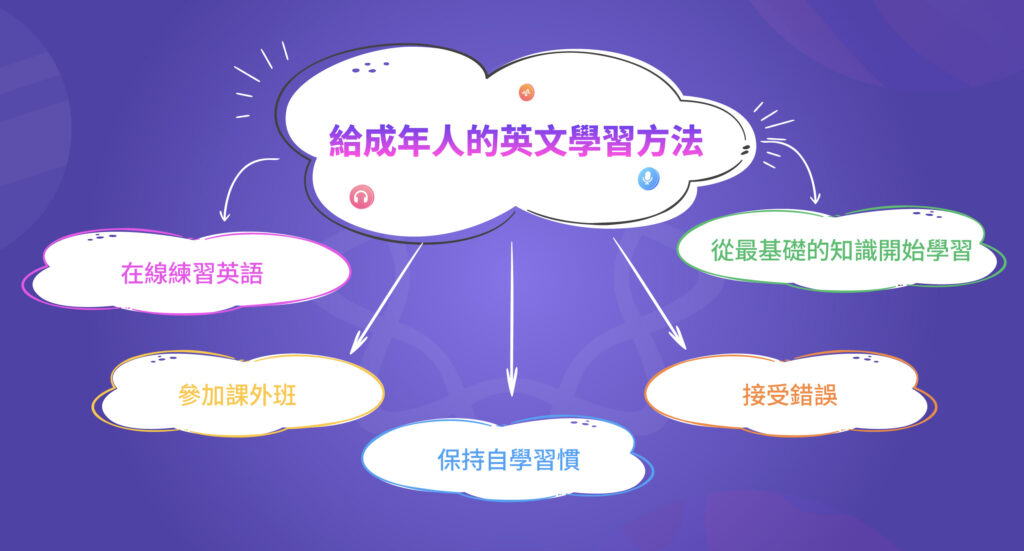
線上練習英語
對於成年人來說,由於日程繁忙,學習英語可能會很困難。 ELSA Speak 提供靈活的學習方法,適合個人需求和時間。憑藉先進的人工智慧(AI) 技術,該應用程式有助於快速提高溝通和發音技巧,讓你在工作環境中更加自信。
參加課外課程
定期參加一些特定主題或技能的課外課程可以幫助學習者培養用英語溝通的特定技能。練習發音,根據溝通情況練習口語的課外課程,鞏固英語知識體系或按主題增強詞彙量,幫助學習者更加熱愛學習英語,從此不再害怕、害怕錯誤,尤其會記住所學的知識。
保持自學的習慣
設定具體的英語學習目標並制定定期的學習時間表。為了取得進步,成年人每天需要至少花15-30分鐘學習和練習英語。制定一個固定的學習計劃並承諾堅持下去,即使時間有限。
接受錯誤
錯誤是學習過程的自然組成部分,也是改進的機會。不要害怕,而是接受錯誤並將其視為學習的一種方式。聽取他人、老師或英語學習社群的回饋以每天進步。
從最基本的東西開始學習
從學習最基本的英語知識開始,例如基本詞彙和語法。在繼續下一部分之前先打下堅實的基礎。學習文法的基礎知識和規則,並每天學習詞彙來豐富你的詞彙量。
常見問題
從零開始學英文該如何學?
在沒有英語基礎知識的情況下,應該從基本詞彙和語法結構開始,並定期練習聽力和口語。
沒基礎學英文該如何學?
從學習詞彙、發音、簡單句型開始,配合語言學習應用和多聽多說練習。
學習英文最簡單的方法是什麼?
學習英語最簡單的方法是:學英文 影集、學英文 app、學英文 youtube。
以上就是 ELSA Speak 整理的所有在家有效學習英語的秘訣,希望這篇文章可以幫助你更有效地學習英語。請觀看 ELSA Speak 的其他文章吧!在分享經驗專欄裏還有許多精彩内容等你探索喲!
星座 英文是 zodiac signs,它是占星學中的重要部分,幫助我們更好地理解自己和周圍的人。跟隨 ELSA Speak 一起探索星座的英文詞彙和對話,了解它們的主要特徵和性格吧!
星座概念
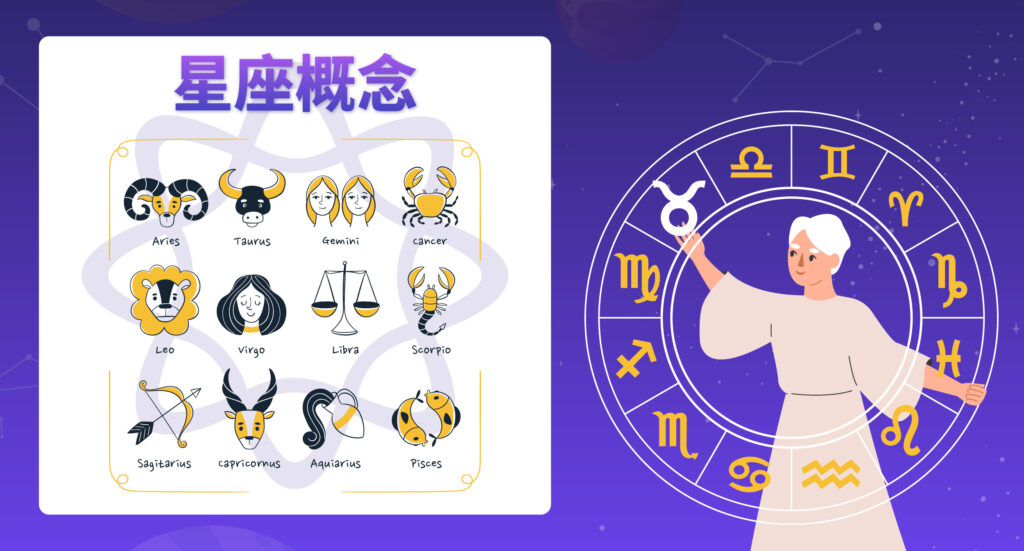
星座 英文是什麼?
星座英文horoscope sign 或者 zodiac sign。
2 個星座的英文稱為: “Horoscope Sign” 其中:
- Horoscope /’hɔrəskoup/: 意為「紫微」
- Astrology /əs’trɔlədʤi/: 意為「占星學」
星座的英文名稱也稱作 Zodiac, 源自希臘語,意思是 “靈物的圈”.
根據古代占星學,太陽會經過 12個星座,形成一個360度的圓圈,稱為黃道帶 (Zodiac)。這個圓圈與四季和一年的 12個月相對應。如果你出生時太陽在某個星座的位置,那麼你就屬於這個星座,每個星座都有不同的性格和命運。
12 星座 英文順序
| 英文 | 發音 | 中文 |
| Aries | /ˈɛəriːz/ | 白羊座 |
| Taurus | /ˈtɔːrəs/ | 金牛座 |
| Gemini | /ˈdʒɛmɪnaɪ/ | 雙子座 |
| Cancer | /ˈkænsər/ | 巨蟹座 |
| Leo | /liːoʊ/ | 獅子座 |
| Virgo | /ˈvɜːrɡoʊ/ | 處女座 |
| Libra | /ˈliːbrə/ | 天秤座 |
| Scorpio | /ˈskɔːrpioʊ/ | 天蠍座 |
| Sagittarius | /ˌsædʒɪˈtɛəriəs/ | 射手座 |
| Capricorn | /ˈkæprɪkɔːrn/ | 摩羯座 |
| Aquarius | /əˈkwɛəriəs/ | 水瓶座 |
| Pisces | /ˈpaɪsiːz/ | 雙魚座 |
>>閲讀更多: 一月到十二月的英文縮寫:閱讀方法和記憶技巧
英文詞彙在星座中的象徵性格和意義
白羊座 – Aries
- 中文名稱: 白羊座
- 英文名稱: Aries /ˈeəriːz/
- 生日日期: 3月21日 – 4月19日
- 符號: ♈ – 白色公羊
- 元素: 火元素
- 宣言: “我是我—你不是我!”
名稱意義
| 字母 | 英文詞彙 | 意義 |
| A | Assertive | 果斷 |
| R | Refreshing | 新鮮感 |
| I | Independent | 獨立 |
| E | Energetic | 能量 |
| S | Sexy | 魅力 |
性格
| 性格 | 意義 |
| Determined | 決心 |
| Honest | 誠實 |
| Confident | 自信 |
| Optimistic | 樂觀 |
| Quick-tempered | 急躁 |
| Short-tempered | 暴躁 |
| Selfish | 自私 |
| Arrogant | 傲慢 |
| Impulsive | 衝動 |
| Impatient | 缺乏耐心 |
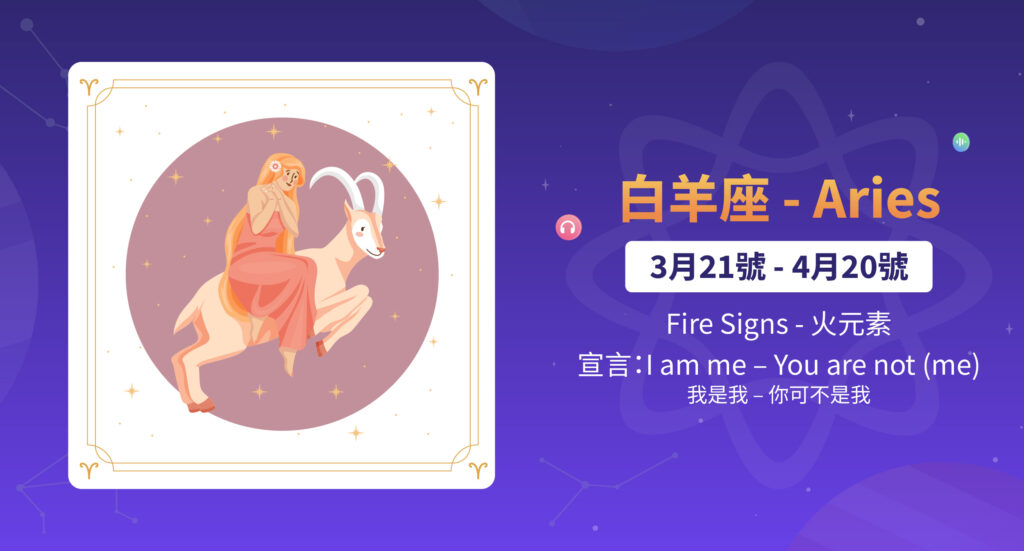
金牛座 – Taurus
- 中文名稱: 金牛座
- 英文名稱: Taurus /’tɔ:rəs/
- 生日日期: 4月20日 – 5月20日
- 符號: ♉ – 黃牛
- 元素: 土元素
- 宣言: “任何可以買到的東西就是我的。”
名稱意義
| 字母 | 英文詞彙 | 意義 |
| T | Trailblazing | 開創者 |
| A | Ambitious | 野心 |
| U | Unwavering | 堅定不移 |
| R | Reliable | 可靠 |
| U | Understanding | 理解力 |
| S | Stable | 穩定性 |
性格
| 性格 | 意義 |
| Determined | 決心 |
| Patient | 耐心 |
| Devoted | 盡心 |
| Responsible | 負責任 |
| Practical | 實際 |
| Greedy | 貪婪 |
| Materialistic | 現實 |
| Stubborn | 頑固 |
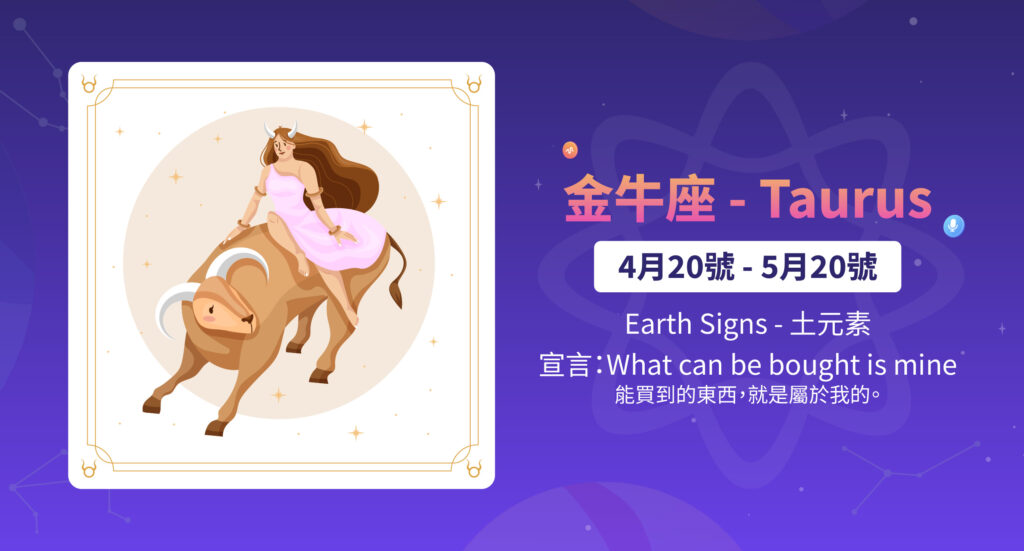
雙子座 – Gemini
- 中文名稱: 雙子座
- 英文名稱: Gemini /ˈdʒemənaɪ/
- 生日日期: 5月21日 – 6月21日
- 符號: ♊ – 雙胞胎
- 元素: 風元素
- 宣言: “我喜歡這個,繼續說下去!”
名稱意義
| 字母 | 英文詞彙 | 意義 |
| G | Generous | 慷慨 |
| E | Emotionally in tune | 共鳴感 |
| M | Motivated | 動力 |
| I | Imaginative | 想像力 |
| N | Nice | 美好 |
| I | Intelligent | 智慧 |
性格
| 性格 | 意義 |
| Witty | 幽默 |
| Eloquent | 辯才流利 |
| Gentle | 友善 |
| Restless | 不停歇 |
| Affectionate | 充滿愛意 |
| Curious | 好奇心 |
| Impatient | 缺乏耐心 |
| Tense | 緊張 |
| Indecisive | 優柔寡斷 |
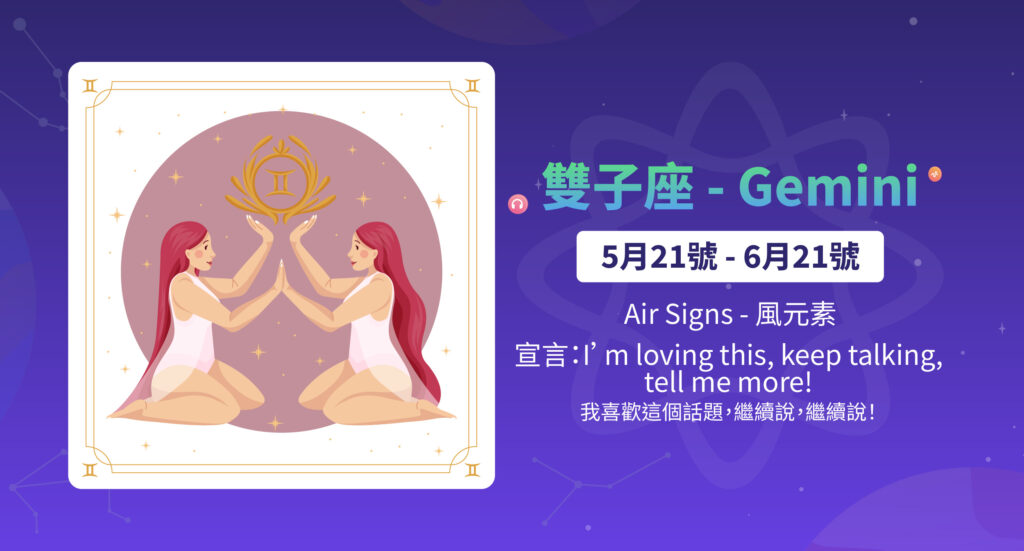
巨蟹座 – Cancer
- 中文名稱: 巨蟹座
- 英文名稱: Cancer /’kænsə/
- 生日日期: 6月22日 – 7月22日
- 符號: ♋ – 螃蟹
- 元素: 水元素
- 宣言: “說再見真的很痛心,所以請你不要離開。”
名稱意義
| 字母 | 英文詞彙 | 意義 |
| C | Caring | 關愛 |
| A | Ambitious | 野心 |
| N | Nourishing | 培養 |
| C | Creative | 創造力 |
| E | Emotionally intelligent | 情緒智慧 |
| R | Resilient | 堅韌 |
性格
| 性格 | 意義 |
| Intuitive | 直覺力 |
| Nurturing | 體貼 |
| Frugal | 簡單 |
| Cautious | 謹慎 |
| Moody | 憂鬱 |
| Self-pitying | 自憐 |
| Jealous | 嫉妒 |
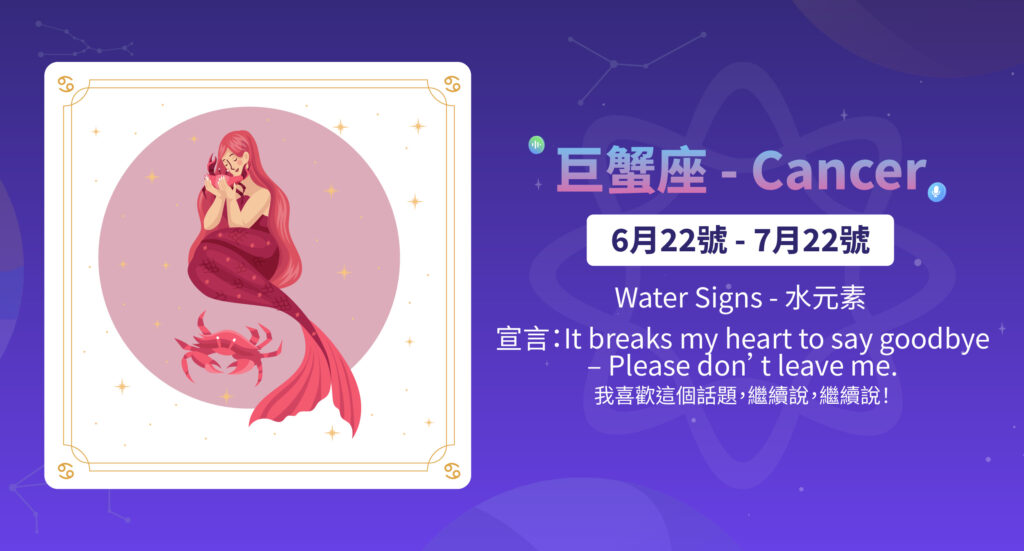
獅子座 – Leo
- 中文名稱: 獅子座
- 英文名稱: Leo /’li:ou/
- 生日日期: 7月23日 – 8月22日
- 符號: ♌ – 獅子
- 元素: 火元素
- 宣言: “表演必須繼續,讓我來表現吧!”
名稱意義
| 字母 | 英文詞彙 | 意義 |
| L | Leaders | 領導者 |
| E | Energetic | 能量 |
| O | Optimistic | 樂觀 |
性格
| 性格 | 意義 |
| Confident | 自信 |
| Independent | 獨立 |
| Dogmatic | 專橫霸道 |
| Vain | 幻想 |
| Bossy | 高傲 |
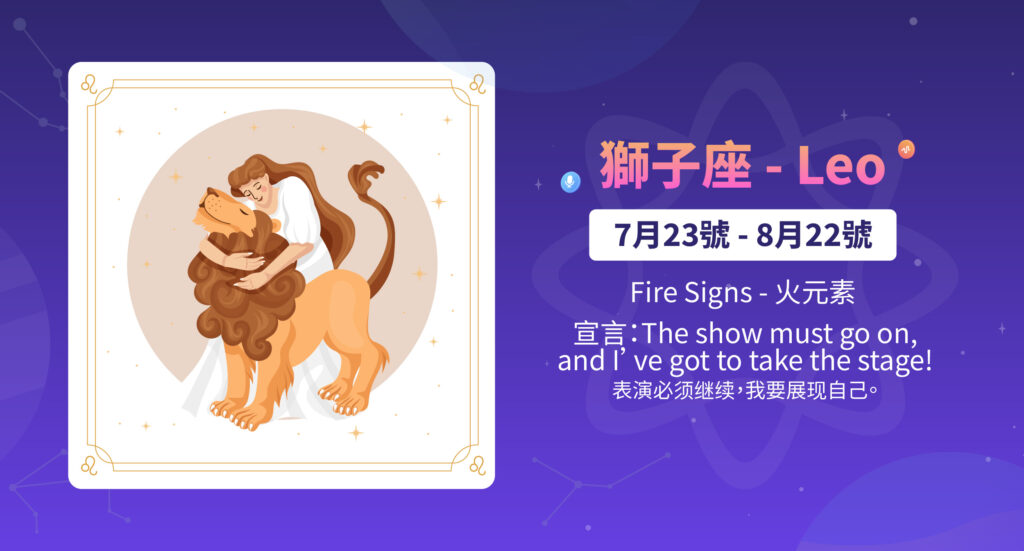
處女座 – Virgo
- 中文名稱: 處女座
- 英文名稱: Virgo /ˈvɜːrgəʊ/
- 生日日期: 8月23日 – 9月22日
- 符號: ♍ – 處女
- 元素: 土元素
- 宣言: “我剛做了一個清單,需要檢查兩遍。”
名稱意義
| 字母 | 英文詞彙 | 意義 |
| V | Virtuous | 德行 |
| I | Intelligent | 聰明 |
| R | Responsible | 責任 |
| G | Generous | 慷慨 |
| O | Optimistic | 樂觀 |
性格
| 性格 | 意義 |
| Analytical | 分析力 |
| Practical | 實際 |
| Precise | 細心 |
| Picky | 苛刻 |
| Inflexible | 固執不變 |
| Perfectionist | 完美主義 |
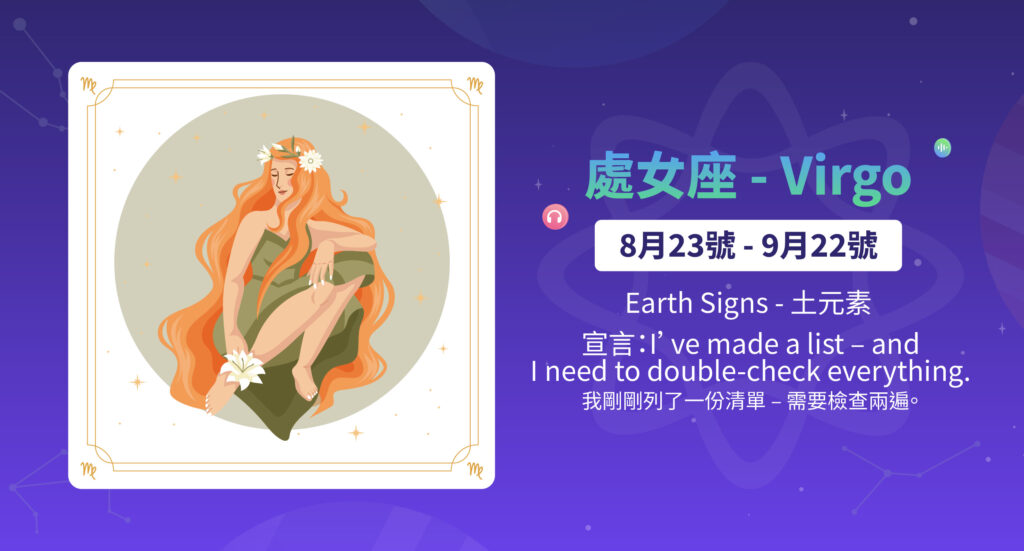
天秤座 – Libra
- 中文名稱: 天秤座
- 英文名稱: Libra /ˈliː.brə/
- 生日日期: 9月23日 – 10月22日
- 符號: ♎ – 天秤
- 元素: 風元素
- 宣言: “我們是一條船上的人,所以我們應該分一半吧。”
名稱意義
| 字母 | 英文詞彙 | 意義 |
| L | Loyal | 忠誠 |
| I | Inquisitive | 好學 |
| B | Balanced | 平衡 |
| R | Responsible | 責任 |
| A | Altruistic | 包容心 |
性格
| 性格 | 意義 |
| Diplomatic | 民主 |
| Easygoing | 隨和 |
| Sociable | 和睦 |
| Changeable | 善變 |
| Unreliable | 不可靠 |
| Superficial | 膚淺 |
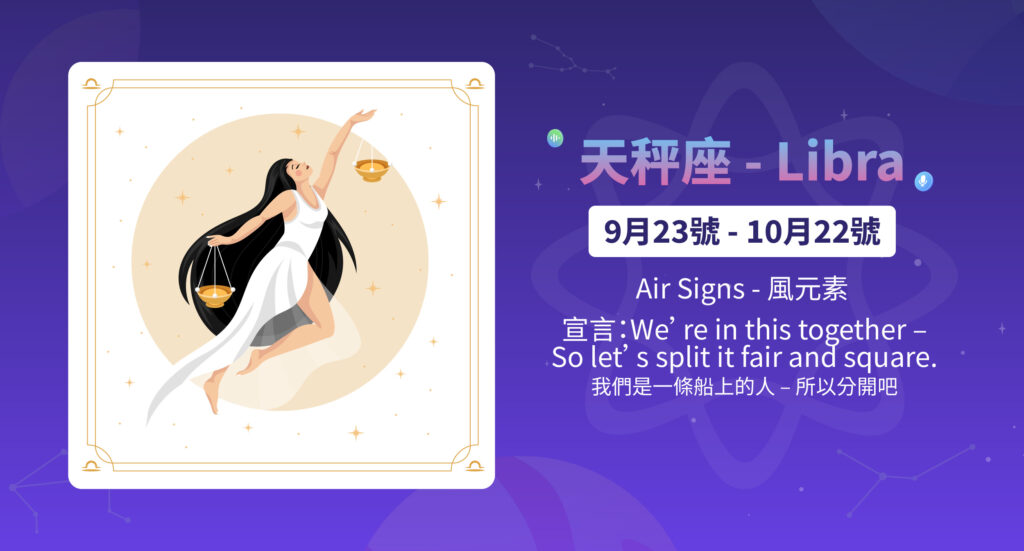
天蠍座 – Scorpio
- 中文名稱: 天蠍座 或 蠍子座
- 英文名稱: Scorpio /ˈskɔː.pi.əʊ/
- 生日日期: 10月23日 – 11月22日
- 符號: ♏ – 蠍子
- 元素: 水元素
- 宣言: “相信我,你不需要知道我的秘密!”
名稱意義
| 字母 | 英文詞彙 | 意義 |
| S | Seductive | 魅力 |
| C | Cerebral | 智慧 |
| O | Original | 原創 |
| R | Reactive | 反應 |
| P | Passionate | 熱情 |
| I | Intuitive | 直覺 |
| O | Outstanding | 突出 |
性格
| 性格 | 意義 |
| Passionate | 熱情 |
| Resourceful | 靈活 |
| Focused | 專注 |
| Narcissistic | 自負 |
| Manipulative | 控制欲強 |
| Suspicious | 懷疑 |
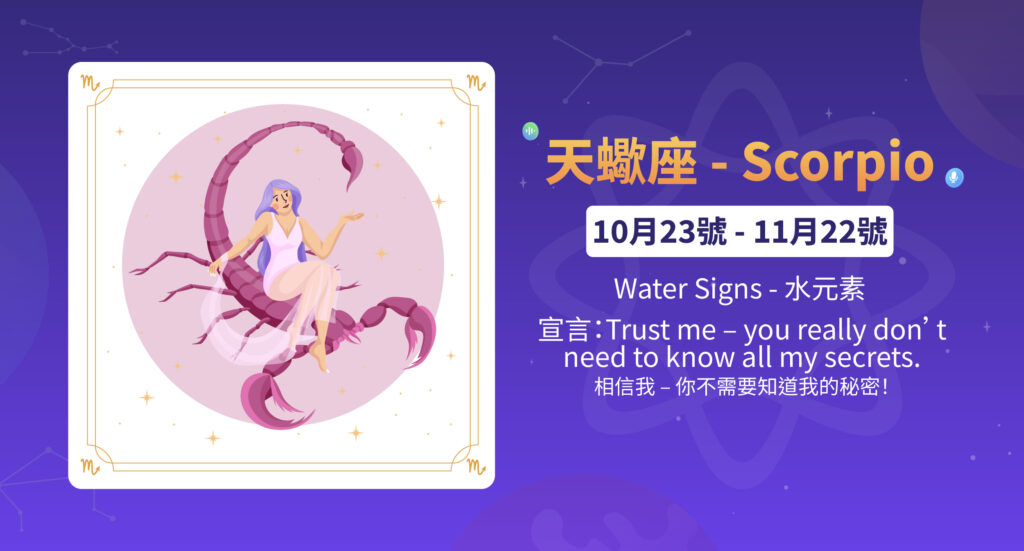
牡羊座 – Sagittarius
- 中文名稱: 射手座
- 英文名稱:: Sagittarius /,sædʤi’teəriəs/
- 生日日期: 11月23日 – 12月21日
- 符號: ♐ – 半人半馬,手持弓箭
- 元素: 火元素
- 宣言: “我一直相信,我們每個人都扮演著某種角色!”
名稱意義
| 字母 | 英文詞彙 | 意義 |
| S | Seductive | 魅力 |
| A | Adventurous | 冒險 |
| G | Grateful | 感恩 |
| I | Intelligent | 聰明 |
| T | Trailblazing | 先鋒 |
| T | Tenacious adept | 頑強,老練 |
| A | Adept | 老練 |
| R | Responsible | 責任 |
| I | Idealistic | 維心 |
| U | Unparalleled | 無雙 |
| S | Sophisticated | 細緻 |
性格
| 性格 | 意義 |
| Frank | 坦率真誠 |
| Buoyant | 樂觀自信 |
| Knowledgeable | 見多識廣 |
| Philosophical | 鎮定 |
| Benevolent | 善良 |
| Venturesome | 冒險 |
| Reckless | 魯莽 |
| Tactless | 應對能力不足 |
| Restless | 不耐煩 |
| Capricious | 多變 |
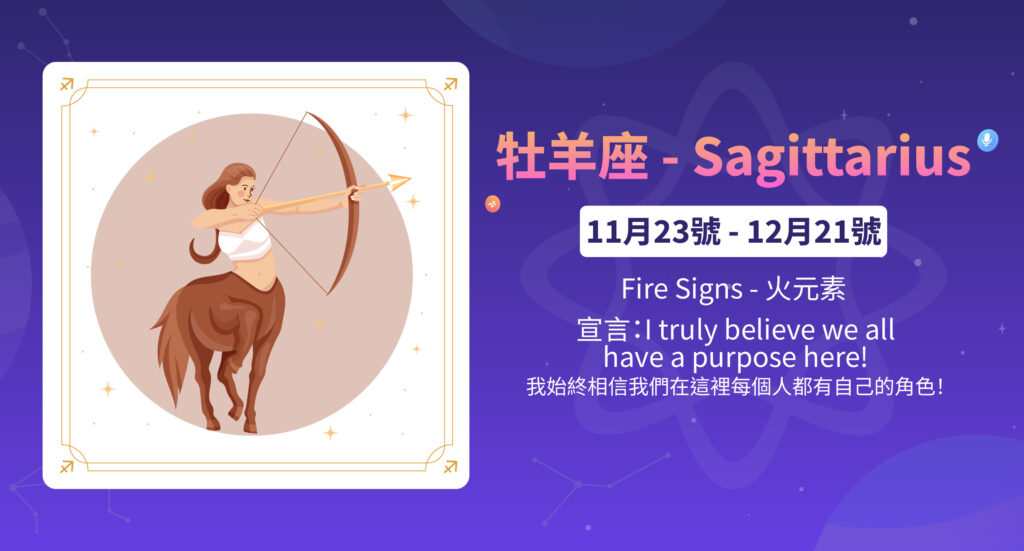
摩羯座 – Capricorn
- 中文名稱: 摩羯座
- 英文名稱: Capricorn /’kæprikɔ:n/
- 生日日期: 12月22日 – 1月19日
- 符號: ♑ – 半山羊半魚
- 元素: 土元素
- 宣言: “生活讓我等待,但我值得!”
名稱意義
| 字母 | 英文詞彙 | 意義 |
| C | Confident | 自信 |
| A | Analytical | 分析 |
| P | Practical | 實際 |
| R | Responsible | 責任 |
| I | Intelligent | 聰明 |
| C | Caring | 關心 |
| O | Organized | 有條理 |
| R | Realistic | 現實 |
| N | Neat | 整潔 |
性格
| 性格 | 意義 |
| Wise | 智慧 |
| Enterprising | 勇敢果斷 |
| Cautious | 謹慎 |
| Determined | 決心 |
| Disciplined | 紀律 |
| Sincere | 真誠 |
| Cynical | 多疑 |
| Mercurial | 情緒波動 |
| Self-centred | 自私 |
| Obdurate | 頑固 |
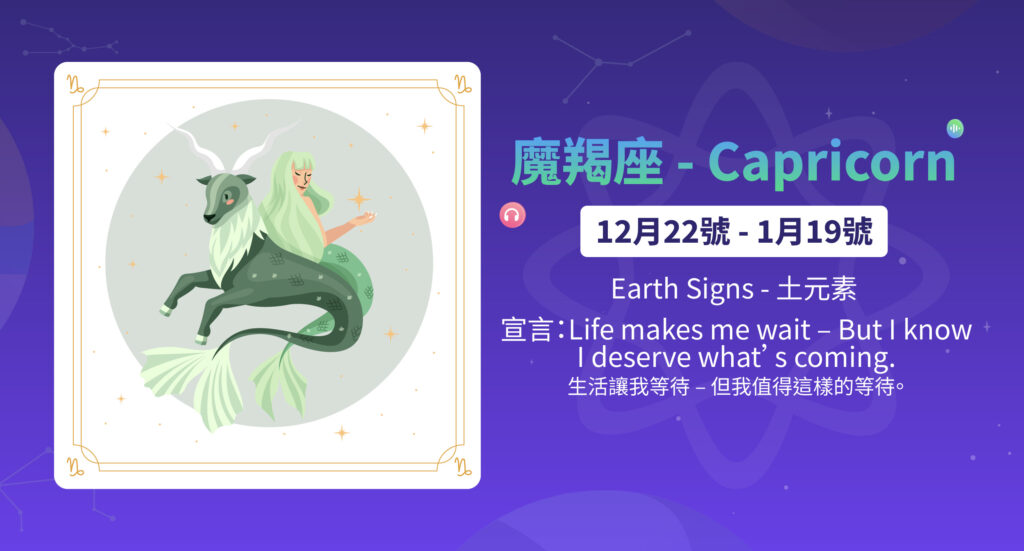
水瓶座 – Aquarius
- 中文名稱: 水瓶座
- 英文名稱: Aquarius /ə’kweəriəs/
- 生日日期: 1月20日 – 2月18日
- 符號: ♒ – 持水者
- 元素: 風元素
- 宣言: “我是圓圓的鍋蓋,扣在歪歪扭扭的鍋子上,生活在一個彎曲的世界裡!”
名稱意義
| 字母 | 英文詞彙 | 意義 |
| A | Analytical | 分析 |
| Q | Quirky | 古怪 |
| U | Uncompromising | 毫不妥協 |
| A | Action-focused | 專注行動 |
| R | Respectful | 尊重 |
| I | Intelligent | 智慧 |
| U | Unique | 獨一無二 |
| S | Sincere | 真誠 |
性格
| 性格 | 意義 |
| Honest | 誠實 |
| Impartial | 無私 |
| Inquisitive | 探索 |
| Tender | 溫和 |
| Candid | 勇敢 |
| Inventive | 創造力 |
| Unpredictable | 情緒多變 |
| Obstinate | 固執 |
| Extremist | 極端 |
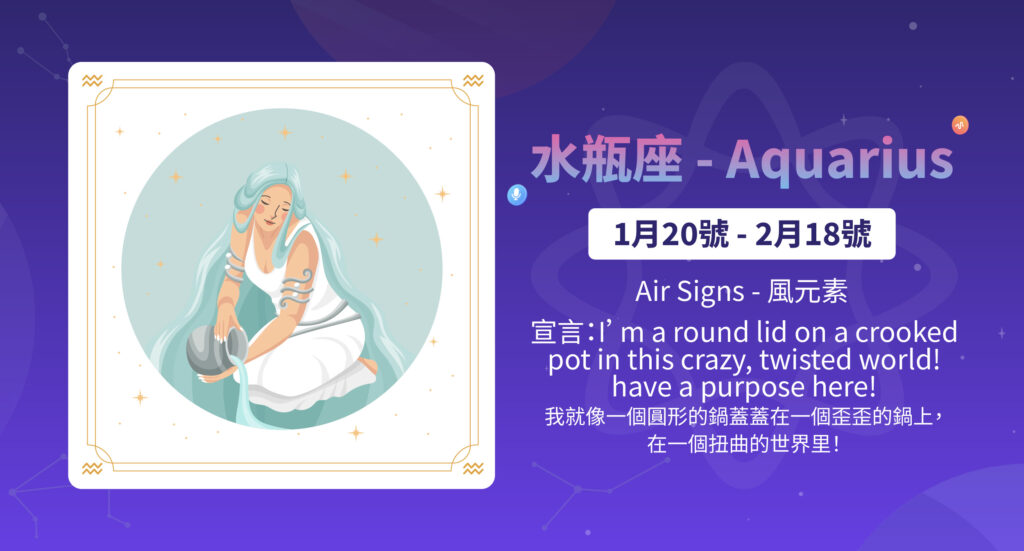
雙魚座 – Pisces
- 中文名稱: 雙魚座
- 英文名稱: Pisces /ˈpaɪ.siːz/
- 生日日期: 2月19日 – 3月20日
- 符號: ♓ – 兩條逆向游動的魚
- 元素: 水元素
- 宣言: “懷著一顆敞開的心,我將游向萬物最深的水域。”
名稱意義
| 字母 | 英文詞彙 | 意義 |
| P | Psychic | 通靈力 |
| I | Intelligent | 聰明 |
| S | Surprising | 驚訝 |
| C | Creative | 創意 |
| E | Emotionally-driven | 情感 |
| S | Sensitive | 敏感 |
性格
| 性格 | 意義 |
| Passionate | 熱情 |
| Sensitive | 敏感 |
| Compassionate | 同情心 |
| Selfless | 包容 |
| Creative | 創造力 |
| Irritable | 易怒 |
| Irresolute | 優柔寡斷 |
| Submissive | 無主見 |
| Sluggish | 遲鈍 |
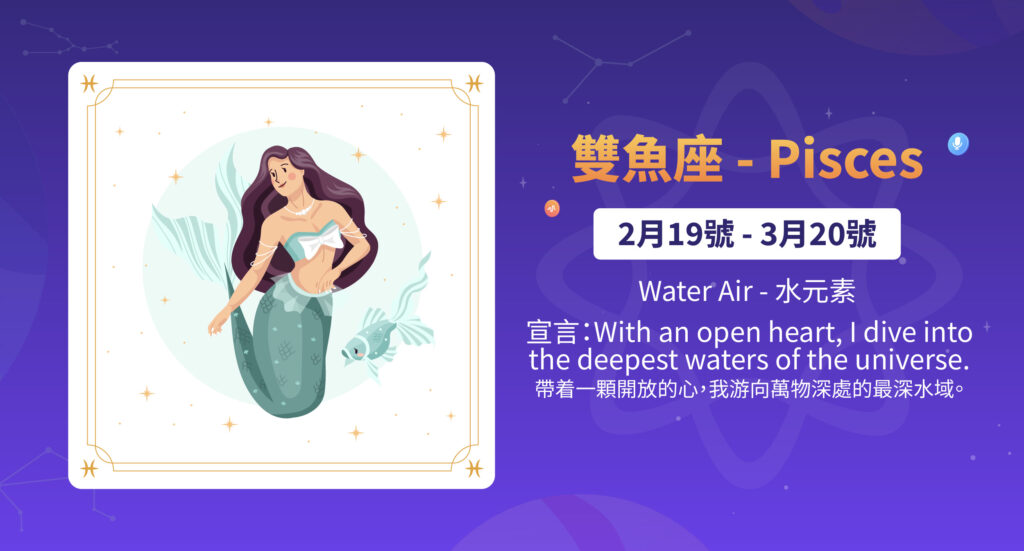
12星座的元素
火元素
星座: 白羊座, 獅子座、射手座
共同特點: 火元素代表強烈的生命力。屬於這個元素的人非常聰明、堅韌且靈活。他們有理想,並隨時準備面對挑戰。火象星座代表易怒和自負,但他們也容易原諒別人。他們充滿能量,為周圍的人帶來積極的動力。
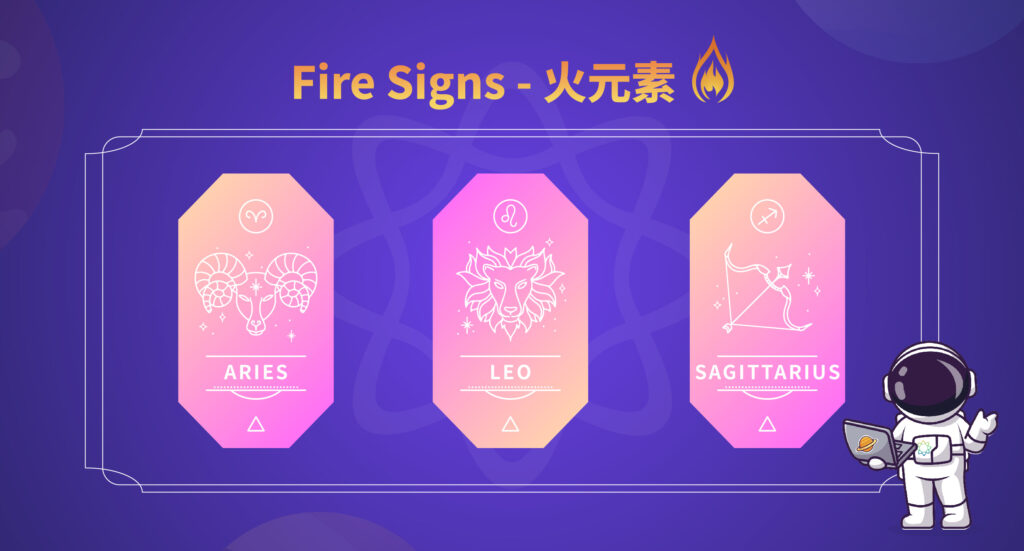
水元素
星座: 巨蟹座、天蠍座、雙魚座
共同特點: 水元素的人非常敏感,情感豐富,並且相對神秘。他們擁有深刻的靈魂,常能理解和同情他人。他們願意幫助並與周圍的人分擔困難。
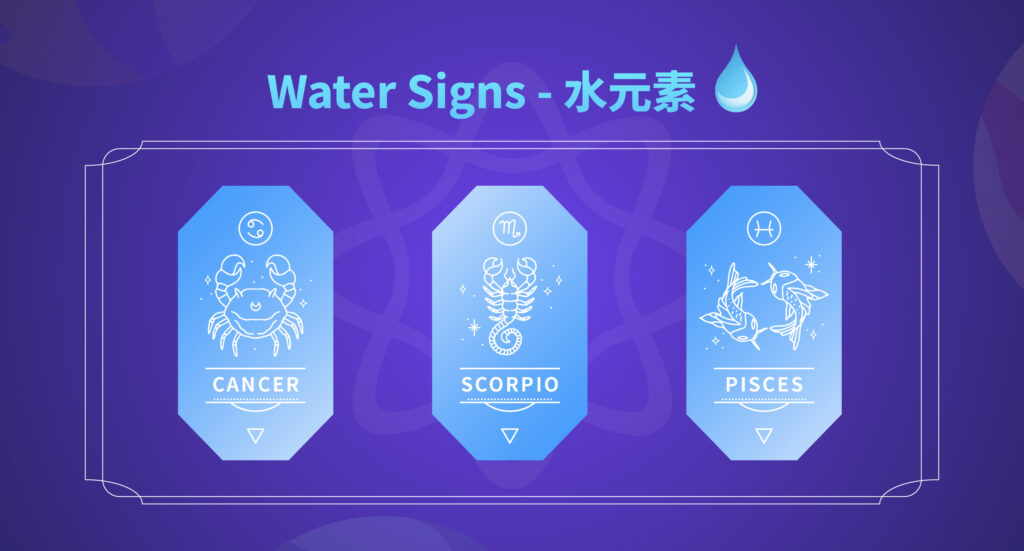
土元素
星座: 金牛座、處女座、摩羯座
共同特點: 屬於土元素的人通常溫和、實際且沉穩。他們以現實的原則為導向,有時可能顯得保守和固執。然而,當有需要時,他們非常樂於行俠仗義並同情他人。
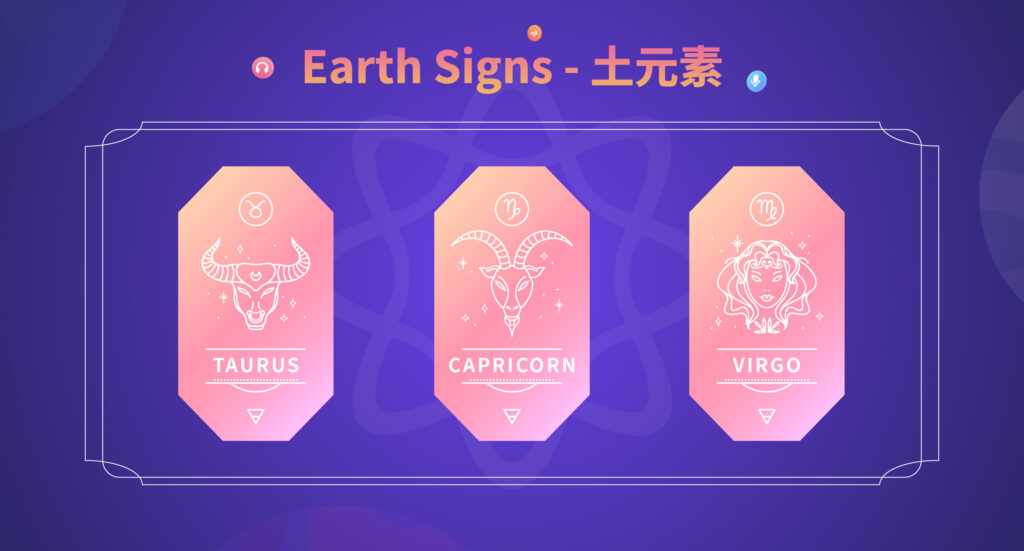
風元素
星座: 雙子座、天秤座、水瓶座
共同特點: 風元素覆蓋著廣大的空間,因此屬於這個元素的人通常外向、善於交際,並擁有廣泛的朋友關係。他們聰明,具有良好的分析能力,並且經常有哲學性的思考。他們樂於提供意見,但有時他們的意見可能顯得膚淺。
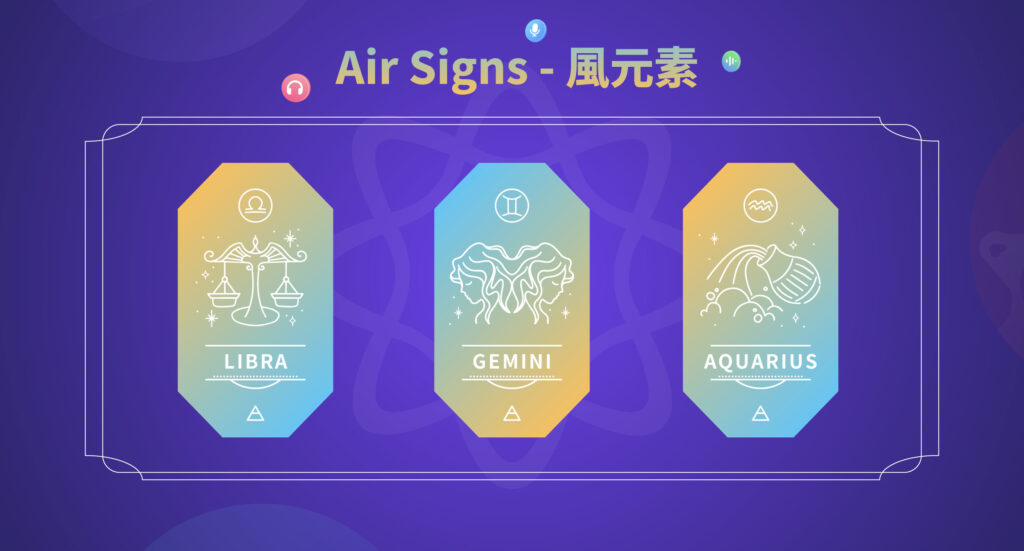
星座英文詞彙
| 詞彙 | 發音 | 翻譯 |
| Fire Signs | /ˈfaɪər saɪnz/ | 火元素 |
| Energy | /ˈɛnərdʒi/ | 能量 |
| Passion | /ˈpæʃən/ | 熱情 |
| Action | /ˈækʃən/ | 行動 |
| Courage | /ˈkɜːrɪdʒ/ | 勇氣 |
| Leadership | /ˈliːdərʃɪp/ | 領導力 |
| Earth Signs | /ɜːrθ saɪnz/ | 土元素 |
| Stability | /stəˈbɪləti/ | 穩定 |
| Practicality | /ˌpræktɪˈkæləti/ | 實際 |
| Materialism | /məˈtɪəriəlɪzəm/ | 物質 |
| Security | /sɪˈkjʊərɪti/ | 安全感 |
| Patience | /ˈpeɪʃəns/ | 耐心 |
| Air Signs | /ɛər saɪnz/ | 風元素 |
| Communication | /kəˌmjuːnɪˈkeɪʃən/ | 溝通 |
| Intellect | /ˈɪntəlɛkt/ | 智力 |
| Curiosity | /ˌkjʊərɪˈɒsɪti/ | 好奇心 |
| Socialization | /ˌsəʊʃəlaɪˈzeɪʃən/ | 社會融入 |
| Ideas | /aɪˈdiːəz/ | 想法 |
| Water Signs | /ˈwɔːtər saɪnz/ | 水元素 |
| Emotion | /ɪˈməʊʃən/ | 情感 |
| Intuition | /ˌɪntjuˈɪʃən/ | 直覺 |
| Sensitivity | /ˌsɛnsɪˈtɪvɪti/ | 敏感 |
| Compassion | /kəmˈpæʃən/ | 同情心 |
| Healing | /ˈhiːlɪŋ/ | 治癒 |
| Zodiac sign | /ˈzəʊdiæk saɪn/ | 星座 |
| Astrology | /əˈstrɒlədʒi/ | 占星學 |
| Horoscope | /ˈhɒrəskəʊp/ | 星盤 |
| Compatibility | /kəmˌpætɪˈbɪləti/ | 相容性 |
| Personality traits | /ˌpɜːsəˈnælɪti treɪts/ | 性格特徵 |
| Celestial body | /sɪˈlɛstɪəl ˈbɒdi/ | 天體 |
| Birth chart | /bɜːθ ʧɑːrt/ | 星圖 |
| Transit | /ˈtrænzɪt/ | 行星運動 |
| Moon sign | /muːn saɪn/ | 月亮星座 |
| Rising sign | /ˈraɪzɪŋ saɪn/ | 上升星座 (Ascendant) |
| Planetary influence | /ˈplænɪtəri ˈɪnfluəns/ | 行星影響 |
| Elemental balance | /ˌɛlɪˈmɛntl ˈbæləns/ | 元素平衡 |
| Solar sign | /ˈsəʊlər saɪn/ | 太陽星座 |
| Retrograde | /ˈrɛtrəʊgreɪd/ | 逆行 |
| Constellation | /ˌkɒnstəˈleɪʃən/ | 星座 |
| Ecliptic | /ɪˈklɪptɪk/ | 黃道帶 |
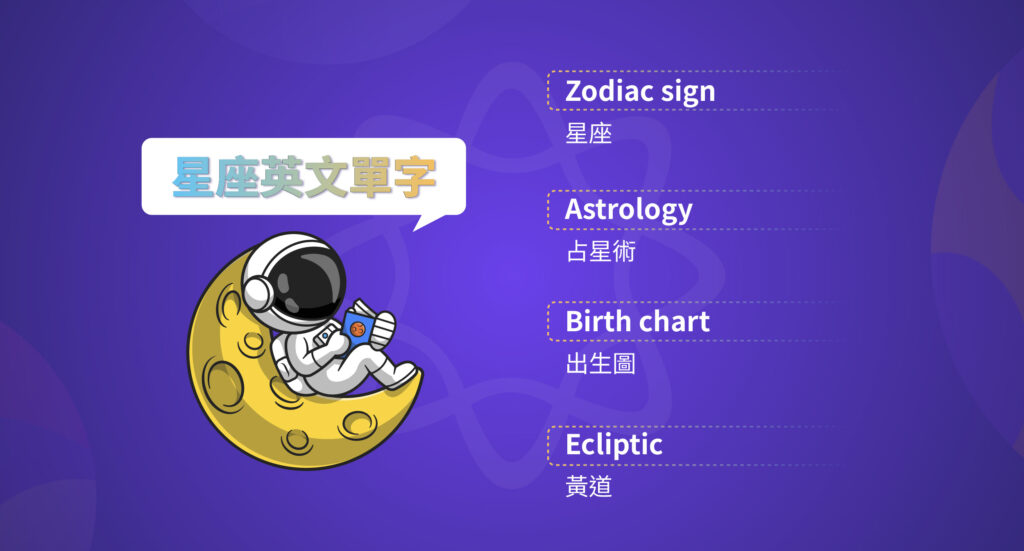
>>瞭解更多英語詞彙:40+個常見主題的常用英語詞彙總結:7000英文單字版本
星座英文介紹範文
範文 1
Hi, I’m an Aries. I’m known for my energetic and adventurous spirit. I love taking on new challenges and leading the way. My friends say I’m confident and always full of enthusiasm.
翻譯
你好,我是白羊座。我以活力充沛和喜愛冒險著稱。我喜歡面對新的挑戰並且總是領導他人。我的朋友們說我自信且充滿熱情。
範文 2
Hello, I’m a Taurus. People describe me as reliable and patient. I value stability and enjoy the finer things in life. I’m determined and always strive to achieve my goals.
翻譯
你好,我是金牛座。大家形容我是一個可靠且有耐心的人。我重視穩定,並且喜歡生活中的精緻事物。我決心達成目標,並且總是全力以赴。
範文 3
Hi there, I’m a Gemini. I’m very versatile and communicative. I have a curious mind and love learning new things. My friends think I’m quick-witted and full of ideas.
翻譯:
你好,我是雙子座。我很靈活,擅長溝通。我有強烈的好奇心,喜歡學習新事物。我的朋友們認為我反應敏捷,且充滿創意。
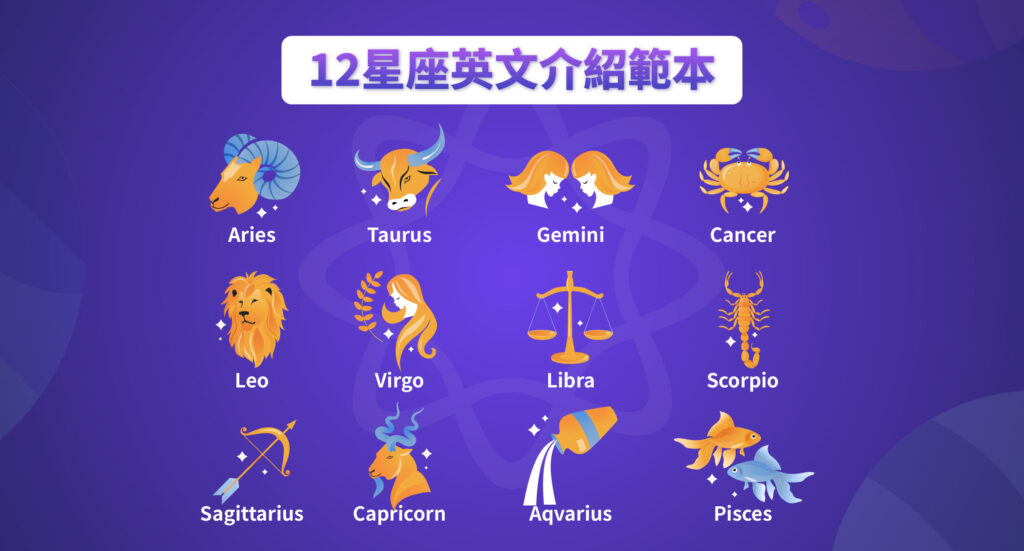
星座的英文交流句型
| 英文句型 | 翻譯 |
| What’s your zodiac sign? | 你的星座是什麼? |
| I’m a Leo. How about you? | 我是獅子座。你呢? |
| Do you believe in astrology? | 你相信占星學嗎? |
| What traits are common for Aries people? | 白羊座人的常見特徵是什麼? |
| I heard that water signs are very emotional. Is that true? | 我聽說水元素星座的人非常敏感。這是真的嗎? |
| How do fire signs usually act in relationships? | 火元素星座的人在關係中通常如何表現? |
| I’m an Earth sign, so I’m more practical and grounded. | 我是土元素星座,所以我比較實際且穩重。 |
| Which signs are most compatible with Virgo? | 哪個星座最適合處女座? |
| What’s your rising sign? Do you know how it affects your personality? | 你的上升星座是什麼?你知道它如何影響你的性格嗎? |
| Is there a specific zodiac sign you get along with the most? | 你覺得哪個星座最適合你? |
| I’ve read my horoscope today. It says I’ll have a great week ahead. | 我今天看了星座運勢。它說我即將迎來一個美好的一周。 |
| Do you think zodiac compatibility is important in relationships? | 你認為星座匹配在關係中重要嗎? |
| People say that Libras are great at balancing things in life. Do you feel that way? | 大家都說天秤座的人擅長在生活中找到平衡。你有這種感覺嗎? |
| What elements are represented by your zodiac sign? | 你的星座代表哪個元素? |


常見問題
星座 英文 怎麼 說
星座的英文是 zodiac sign 或簡稱 zodiac.
星座 英文 發音
星座的英文的發音如下:
- zodiac: /ˈzoʊ.di.æk/
- sign: /saɪn/
合在一起是 /ˈzoʊ.di.æk saɪn/.
你是什麼星座英文
你的星座是什麼的英文是: What’s your zodiac sign?
金牛座英文是什麼?
金牛座的英文是 Taurus.
金牛座是幾月份的?
金牛座(Taurus)是從4月20日到5月20日。
金牛座的性格是什麼樣的?
金牛座(Taurus)的性格是堅定、務實且可靠。
天蠍座英文是什麼?
天蠍座的英文是 Scorpio.
水瓶座英文是什麼?
水瓶座的英文是 Aquarius.
星座英文 horoscope 是什麼?
星座的英文是 Horoscope 或 Astrology.
星座英文 constellation 是什麼?
表示與星座相關的具體黃道十二宮,例如白羊座(Aries)或獅子座(Leo)。
上升星座的英文是什麼?
上升星座的英文是 Rising sign
以上是關於星座 英文的知識,希望這篇文章能幫助你更清楚地了解自己的名字意義和性格。請繼續關注 ELSA Speak 的其他文章在溝通交流英語專欄等你!
9 月 28 日對學生來說是個特別有意義的日子,表達「尊師重道」精神,感謝老師、對老師表示知恩。立即加入 ELSA Speak 尋找有意義的祝福以及感謝老師的祝福語,而不是「教師節快樂」!
教師節的由來
教師節的設立是為了表達對老師的感激之情。雖然不是國定假日,但值此之際,學校也會舉辦許多表揚教師的活動,例如頒獎給優秀教師、舉辦答謝儀式等。學生經常寫卡片或贈送小禮物來表達謝意,營造出溫馨、親切的氛圍。
教師節錄在 9 月 28 日,這一天是春秋時期偉大的思想家、教育家「至聖先師」-孔子的生日。他一生致力於教育事業,創立了「非歧視教育」、「因材施教」等多種教學方法,為許多普通人創造了學習機會,奠定了現代教育的基礎。相傳,孔子有三千多個弟子,其中《史記》記載的「賢人」有七十二位,幫助傳播孔子的思想。
鑑於孔子對教育的巨大貢獻,台灣政府於 1952 年將孔子的生 日 9 月 28 日定為教師節,以表彰所有教師。
教師節的英語詞彙
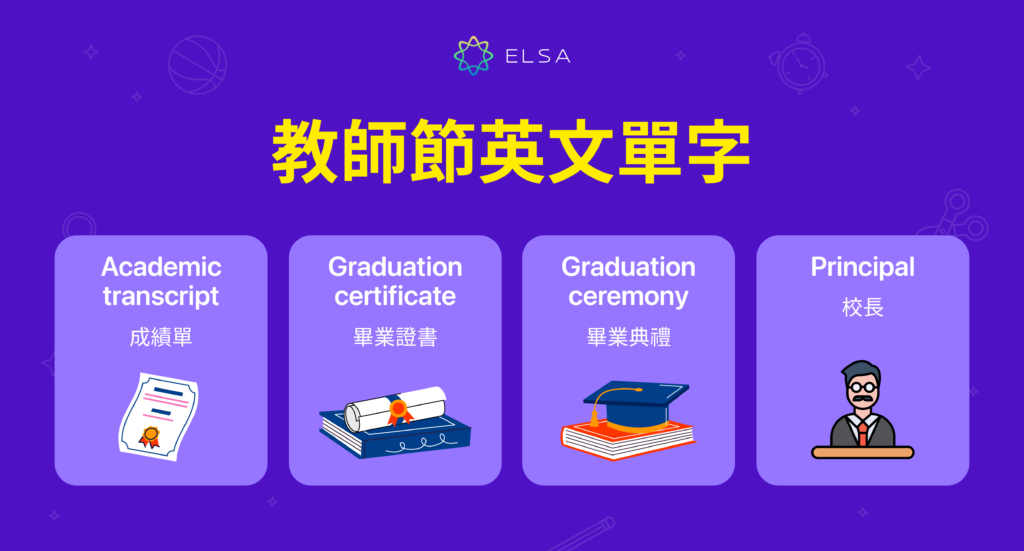
| 詞匯 | 拼音 | 翻譯 |
| Teacher’s Day | /ˌviːetnəˈmiːz ˈtiːtʃə(r) deɪ/ | 教師節 |
| Visit teacher’s house | /ˈvɪzɪt ˈtiːtʃə(r)’s haʊs/ | 看老師家 |
| Pay tribute | /peɪ ˈtrɪbjuːt/ | 表示感謝 |
| Dedication | /ˌdedɪˈkeɪʃn/ | 奉獻 |
| Venerable | /ˈvenərəbl/ | 可敬 |
| Success/attainment | /səkˈses/ – /əˈteɪnmənt/ | 成功/成就 |
| Vocational guidance | /vəʊˈkeɪʃənl ˈɡaɪdns/ | 職業指導 |
| Wholehearted | /ˌhəʊlˈhɑːtɪd/ | 全心 |
| Would-be teachers | /wʊd-bi ˈtiːtʃə(r)/ | 未來的教師 |
| Principal | /ˈprɪnsəpl/ | 校長 |
| Teacher | /ˈtiːtʃə(r)/ | 教師 |
| Lecture | /ˈlektʃə(r)/ | lecture |
| Professor | /prəˈfesə(r)/ | 教授 |
| Student | /ˈstjuːdnt/ | 學生 |
| Pupil | /ˈpjuːpl/ | 學生 |
| Postcard | /ˈpəʊstkɑːd/ | 卡片、賀卡 |
| Academic transcript | /ˌækəˈdemɪk ˈtrænskrɪpt/ | 學術成績單 |
| Grading schedule | /ˈɡreɪdɪŋ ˈskedʒuːl/ | 評分錶 |
| Results certificate | /rɪˈzʌlt sərˈtɪfɪkət/ | 結果證書 |
| Certificate | /sərˈtɪfɪkət/ | 證書 |
| Completion certificate | /kəmˈpliːʃn sərˈtɪfɪkət/ | 結業證書 |
| Graduation certificate | /ɡrædʒuˈeɪʃn sərˈtɪfɪkət/ | 畢業證書 |
| Class head teacher | /klæs hed ˈtiːtʃər/ | 班主任 |
| Classroom teacher | /ˈklæsruːm ˈtiːtʃər/ | 任課老師 |
| College | /ˈkɑːlɪdʒ/ | 大專 |
| Credit mania | /ˈkredɪt ˈmeɪniə/ | 成就病 |
| Credit-driven practice | /ˈkredɪt ˈdrɪvn ˈpræktɪs/ | 成就病 |
| Curriculum (pl. curricula) | /kəˈrɪkjələm/ | 課程 |
| Mark | /mɑːrk/ | 評分 |
| Score | /skɔː/ | 分數 |
| Subject head | /ˈsʌbdʒɪkt hed/ | 門課班主任 |
| Theme | /θiːm/ | 話題 |
| Topic | /ˈtɑːpɪk/ | 主題 |
| Technology | /tekˈnɑːlədʒi/ | 科技 |
| Tutorial | /tuːˈtɔːriəl/ | 輔導 |
| Train | /treɪn/ | 培訓 |
| Training | /ˈtreɪnɪŋ/ | 培訓 |
| Teacher training | /ˈtiːtʃər ˈtreɪnɪŋ/ | 教師培訓 |
| Distance education | /ˈdɪstəns ˌedʒuˈkeɪʃn/ | 遠距培訓 |
| Vocational training | /voʊˈkeɪʃənl ˈtreɪnɪŋ/ | 職業培訓 |
| Evaluation | /ɪˈvæljueɪt/ | 評估 |
| Measurement | /ˈmeʒərmənt/ | 評量 |
| Class management | /klæs ˈmænɪdʒmənt/ | 課室管理 |
| Pass | /pæs/ | 及格 |
| Credit | /ˈkredɪt/ | 一般 |
| Distinction | /dɪˈstɪŋkʃn/ | 良好 |
| High distinction | /haɪ dɪˈstɪŋkʃn/ | 優秀 |
| Request for leave of absence | /rɪˈkwest fər liːv əvˈæbsəns/ | 請假(學習、教學) |
| University | /ˌjuːnɪˈvɜːrsəti/ | 大學 |
| Undergraduate | /ˌʌndərˈɡrædʒuət/ | 大學生 |
| Plagiarize | /ˈpleɪdʒəraɪz/ | 抄襲 |
| Plagiarism | /ˈpleɪdʒərɪzəm/ | 抄襲行爲 |
| Geography | /dʒiˈɑːɡrəfi/ | 地理 |
| Teaching aids | /ˈtiːtʃɪŋ eɪdz/ | 教具 |
| Pass (an exam) | /pæs/ | 考過(考試) |
| Class observation | /klæs ˌɑːbzərˈveɪʃn/ | 課堂觀察 |
| Take/sit an exam | /teɪk/ /sɪt ən ɪɡˈzæm/ | 參加考試 |
| Realia | /reɪˈɑːliə/ | 視覺化教學工具 |
| Civil education/civics | /ˈsɪvl ˌedʒuˈkeɪʃn/ /ˈsɪvɪks/ | 公民教育/公民 |
| Continuing education | /kənˈtɪnjuː ˌedʒuˈkeɪʃn/ | 繼續教育 |
| Courseware | /kɔːrs wer/ | 電子課件 |
| Course book/textbook/teaching materials | /kɔːrs bʊk/ /ˈtekstbʊk/ /ˈtiːtʃɪŋ məˈtɪriəlz/ | 課件 |
| Lesson/unit | /lesn/ /ˈjuːnɪt/ | 課/單元 |
| Tutor | /tuːtər/ | 導師 |
| Visiting lecturer/visiting teacher | /ˈvɪzɪtɪŋ ˈlektʃərər/ ˈtiːtʃər/ | 客座講師/客座教師 |
| Voice recording | /vɔɪs rɪˈkɔːrdɪŋ/ | 錄音 |
| Homework | /ˈhəʊmwɜːrk/ | 作業 |
| Extra class | /ˈekstrə klæs/ | 輔導課 |
| Answer | /ˈænsər/ | 答案 |
| Task | /tæsk/ | 任務 |
| Term paper | /tɜːrm ˈpeɪpər/ | 學期論文 |
| Graduation ceremony | /ˌɡrædʒuˈeɪʃn ˈserəmoʊni/ | 畢業典禮 |
| Schoolyard | /skuːl jɑːrd/ | 校園 |
有關教師節活動的英語詞彙
| 詞彙 | 拼音 | 翻譯 |
| Appreciate teachers | /əˈpriː.ʃi.eɪt ˈtiː.tʃərz/ | 感恩老師 |
| Honor educators | /ˈɒn.ər ˈed.jʊ.keɪ.tərz/ | 致敬教師 |
| Give gifts | /ɡɪv ɡɪfts/ | 贈送禮物 |
| Send thank-you notes | /send θæŋk juː nəʊts/ | 發送感謝信 |
| Organize celebrations | /ˈɔː.ɡə.naɪz ˌsel.ɪˈbreɪ.ʃənz/ | 組織慶祝活動 |
| Show gratitude | /ʃəʊ ˈɡræt.ɪ.tjuːd/ | 表達感激之情 |
| Express admiration | /ɪkˈspres ˌæd.mɪˈreɪ.ʃən/ | 表示羡慕 |
| Prepare performances | /prɪˈpeər pəˈfɔː.mənsɪz/ | 準備表演 |
| Write letters | /raɪt ˈlet.əz/ | 寫信 |
| Plan events | /plæn ɪˈvents/ | 策劃活動 |
| Congratulate teachers | /kənˈɡræt.jʊ.leɪt ˈtiː.tʃərz/ | 祝賀教師們 |
| Share memories | /ʃeər ˈmem.ər.iz/ | 分享回憶 |
| Deliver speeches | /dɪˈlɪv.ər ˈspiː.tʃɪz/ | 發表演講 |
| Organize activities | /ˈɔː.ɡə.naɪz ækˈtɪv.ɪ.tiz/ | 組織活動 |
| Take photos | /teɪk ˈfəʊ.təʊz/ | 拍照 |
| Offer flowers | /ˈɒf.ər ˈflaʊ.ərz/ | 送花 |
| Sing songs | /sɪŋ sɒŋz/ | 唱歌 |
| Create thank-you videos | /kriˈeɪt θæŋk juː ˈvɪd.i.əʊz/ | 創建感謝視頻 |
| Arrange student performances | /əˈreɪndʒ ˈstjuː.dənt pəˈfɔː.mənsɪz/ | 安排學生的表演 |
| Prepare a tribute | /prɪˈpeər ə ˈtrɪb.juːt/ | 準備感謝的話 |

簡短,感情的教師節英文祝福語
以下是 ELSA Speak 爲你總結出的簡短感謝老師的祝福語,供你參考:
| 祝福語 | 翻譯 |
| To the greatest teacher in the world, Happy Teachers’ Day! Thank you for everything! | 祝福世界上最偉大的老師,教師節快樂!謝謝您所做的一切! |
| Thank you for helping me gain more knowledge. I’ve always been grateful for your teaching credit. | 感謝您幫助我獲得更多知識。我一直很感激您的教學功勞。 |
| In my eyes, you are the greatest teacher. I hope that you will always be dedicated as you are now. Happy Teachers’ Day. | 在我眼裡,您是最偉大的老師。我希望您永遠像現在一樣奉獻。教師節快樂。 |
| Do you know that you are the teacher I admire the most? Thank you for your valuable knowledge. Wishing you happiness and success in life! | 您知道您是我最敬佩的老師嗎?感謝您提供寶貴的知識。祝您生活幸福、成功! |
| Dear my teacher, thank you for always supporting and motivating me during my learning process. Have a wonderful Teachers’ Day! | 親愛的老師,感謝您在我學習過程中一直以來對我的支持與激勵。祝您教師節愉快! |
| Happy Teachers’ Day! Thank you for making the lesson more interesting! | 教師節快樂!感謝您讓課程更有趣! |
| You are the one who brings the light of knowledge to me. I love you so much! | 您是帶給我知識之光的人。我真的很愛您! |
| Thank you for helping me supplement my knowledge and studying skills. Wishing you happiness and good health. | 感謝您幫助我補充我的知識和學習技能。祝您幸福快樂、身體健康。 |
| Thank you for always taking care of us and reassuring us that all of us were doing well. You are the most wonderful teacher! Thank you for everything! | 感謝您一直以來對我們的照顧,並向我們保證我們所有人都做得很好。您是最棒的老師!謝謝您所做的一切! |
| Thank you for teaching and leading me to be successful as I am today. Happy Teachers’ Day! | 感謝您的教導和帶領我取得今天的成功。教師節快樂! |
| Thank you a lot, teacher! You gave us a lot of priceless advice so that I can complete myself. | 非常感謝您,老師們!您給了我們很多無價的建議,讓我能完善自己。 |
| My dear teachers, thank you for lighting up the dream fire in me. I love you so much! | 親愛的老師們,感謝您們點燃了我心中的夢想之火。我真的很愛您們! |
| On the occasion of Teachers’ Day, I wish you and your family good health, happiness, and success in life. | 在本教師節來臨之際,祝福您及家人身體健康、幸福美滿、生活順利。 |
| I feel grateful to have you in my life. You are not only my teacher who brings me knowledge but also my greatest inspirer. Happy Teachers’ Day! | 我很感激生命中有您。您不僅是我的老師,為我帶來了知識,也是我最大的啟發者。教師節快樂! |
| I have become a good citizen thanks to the teacher’s merit. I hope you are always happy and dedicated to work. Happy Teachers’ Day! | 感謝老師的功勞,我成為了好公民。我希望您永遠快樂並專注於工作。教師節快樂! |
| Your dedication is our inspiration. Thank you for always being devoted to the teaching profession. Happy Teachers’ Day! | 您的奉獻是我們的靈感。感謝您一直以來對教學事業的奉獻。教師節快樂! |
| Happy Teachers’ Day! We are grateful to you today and every day in life! | 教師節快樂!我們今天以及生活中的每一天都感謝您! |
| I am lucky to have you as a teacher. You are so wonderful. Wishing you a Teachers’ Day full of joy and happiness. | 我很幸運有您這樣的老師。您太棒了。祝您有個充滿歡樂和幸福的教師節。 |
| To the world you may be just a teacher but to me you are the most wonderful inspirer. Happy Teachers’ Day! | 對世界來說,您可能只是一位老師,但對我來說,您是最美妙的啟發者。教師節快樂! |
| Thanks for being my teacher. Happy Teachers’ Day! | 謝謝您成為我的老師。教師節快樂! |

最有意義的教師節英語祝福語
以下是 ELSA Speak 爲你總結出的有意義的感謝老師的祝福語,供你參考:
| 祝福語 | 翻譯 |
| To the greatest teacher in the world, I wish you a Happy Teachers’ Day! Thank teachers for everything! | 給世界上最棒的老師,祝您教師節快樂!感謝老師們所做的一切! |
| Dear teachers, Happy Teachers’ Day! You’re like a burning torch which lights the way for us. | 親愛的老師們,教師節快樂!您就像一把燃燒的火炬,為我們照亮前進的道路。 |
| On Teachers’ Day in Taiwan, we would like to send best wishes to you. Wishing you a glorious and steady step on your career path. | 值此台灣教師節之際,我們向您致以最美好的祝福。祝您在職業道路上邁出輝煌、穩健的一步。 |
| Thank you teachers for teaching and leading me to the success I have today. Happy Teacher’s Day, your day! | 感謝老師們的教導和帶領我取得今天的成功。教師節快樂,您的一天! |
| Teachers, you have always been the parents, the sibling, the friend who stayed by and followed us. I hope to stick with you in the years to come. | 老師們,您們一直是陪伴我們、追隨我們的父母、兄弟姊妹、朋友。我希望在未來的歲月裡能和您們在一起。 |
| It’s because of you, I’ve come to love English. | 因為您,我愛上了英文。 |
| My dear teachers, thank you for keeping up the dream in me, I love you, teachers! | 親愛的老師們,謝謝您們讓我堅持著夢想,我愛您們老師們! |
| You gave me the strength I needed to take the first step towards my dream with English. | 您給了我所需的力量,讓我朝著英語夢想邁出了第一步。 |
| Thank you for inspiring us, guiding us and making us what we are today. | 感謝您激勵我們、指導我們並使我們成為今天的我們。 |
| I have this day thanks to the teacher’s merit. I hope you will always be happy and happy. Grateful Teacher’s Day! | 我有今天,多虧了老師的功德。希望您永遠幸福快樂。感恩教師節! |
| You are the special person that illuminates my path. | 您是那個特別的人,照亮了我知識的道路。 |
| Thanks for teaching us how to read and write. Thanks for teaching us all the good things. | 感謝您教導我們如何閱讀和寫作。感謝您教導我們所有美好的東西。 |
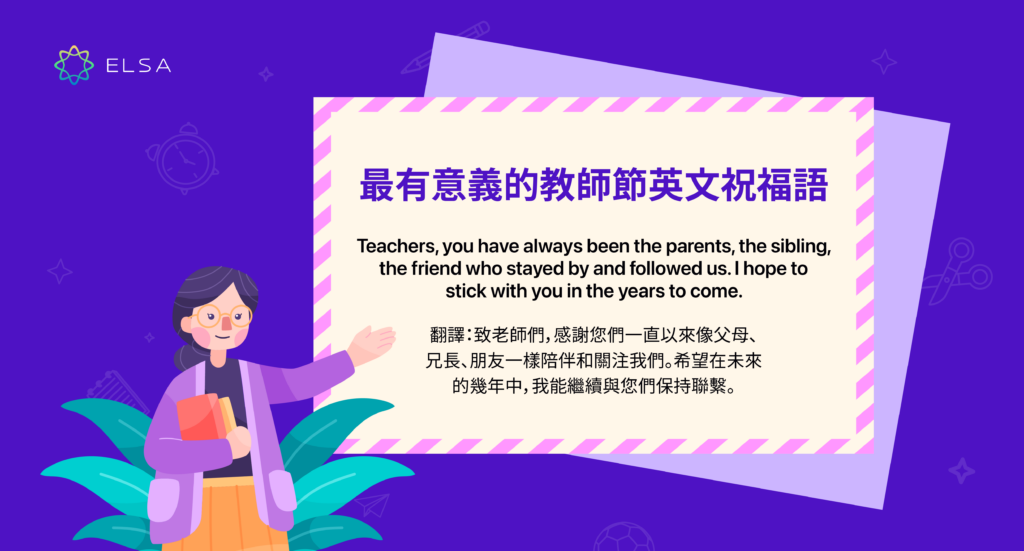
閲讀更多:
給班主任的英語祝福語
以下是 ELSA Speak 爲你總結出的感謝老師的祝福語,供你參考:
| 祝福語 | 翻譯 |
| Dear dedicated teacher, I would like to say thank you for all the valuable lessons you have taught us! You are our second father who gave us helpful advice to become who we are today. Happy Teachers’ Day! | 親愛的老師,我想對您教給我們的所有寶貴課程表示感謝!您是我們的第二位父親,為我們提供了有益的建議,使我們成為今天的人。教師節快樂! |
| You are the great ocean of knowledge. Thank you for dedicating yourself to the education career and teaching us to become good citizens as we are now. Wishing you good health and success. | 您就是知識的大海。感謝您致力於教育事業並教導我們成為現在這樣的好公民。祝福您身體健康、事業成功。 |
| On the occasion of Teachers’ Day, with all my heart, I wish you full of joy in life and success in the career path. | 值此教師節來臨之際,我衷心祝福您生活充滿歡樂,事業成功 |
| I wish that I could show my gratitude to you. However, it is hard to express by speech. I just hope this little card can show a part of my warmest appreciation from the bottom of my heart. | 我希望我能向您表達我的謝意。然而,很難用語言來表達。我只希望這張小卡片能一部分地表達我發自內心最熱烈的感激。 |
| I would like to say thank you to the one who led and accompanied me from the first step on my knowledge path. Wishing you a fulfilling and happy life. | 我要感謝從我知識之路的第一步起一直引領和陪伴我的人。祝您生活圓滿、幸福。 |
| You are a hero in my book. Happy Teachers’ Day to you! | 您是我書中的英雄。祝您教師節快樂! |
| Sir, you are the pinnacle of knowledge and diligence. I would be grateful to God if I could become half of you. Happy Teachers’ Day to the most respected teacher! | 先生,您是知識和勤奮的頂峰。如果我能成為您的一半,我會感激上帝。祝最受尊敬的老師教師節快樂! |
| You are my second mother. Wish you happiness, beauty and success in your career. | 您是我的第二個母親。祝您幸福、美麗、事業成功。 |
| Thank our teacher for loving us like a mother for the 3 academic years of high school. Wishing you a wonderful and full-of-love Teachers’ Day! | 感謝老師像母親一樣愛我們高中三年。祝您有個美好又充滿愛的教師節! |
| Wishing you will always be beautiful, talented and enthusiastic as you are at present! | 祝您永遠像現在一樣美麗、有才華、有熱情! |
| You are one of the most gorgeous people in my eyes. I hope you will never stop your dedication and enthusiasm in work. | 您是我眼中最美麗的人之一。我希望您永遠不會停止對工作的奉獻和熱情。 |
| You have taught me more than the books. You have especially taught me about patience and diligence which impressed me the most. I am blessed to have you in life! | 您教我的比書本上的還要多。您特別教給我的耐心和勤奮,這讓我留下了最深刻的印象。我很幸運生命中有您! |
| Without you, we could have been lost. Thank our teacher for guiding, inspiring and helping us to become who we are today. | 沒有您,我們可能會迷路。感謝我們老師的指導、啟發和幫助我們成為今天的我們。 |

給學科老師的教師節英語祝福語
以下是 ELSA Speak 爲你總結出的感謝老師的祝福語,供你參考:
| 祝福語 | 翻譯 |
| Thanks to my beloved teacher, I have got more knowledge of [the subject]. Thank you for everything! | 感謝我敬愛的老師,讓我對這門學科有了更多的了解。謝謝您所做的一切! |
| Thank you for all the lessons that you have taught me. I promise I will try my best to get better grades in your subject next semester! | 感謝您教給我的所有課程。我保證下學期我會盡力在您們的學科上取得更好的成績! |
| Thank you for teaching me a subject I thought I would never understand or be interested in. Thank you for making learning fun. | 感謝您教我一門我認為永遠無法理解或感興趣的學科。 感謝您讓學習變得有趣。 |
| It has been an honor to have learned so many things from you. Thanks for inspiring me! | 很榮幸能從您身上學到很多。謝謝您給我啟發! |
| It’s been a major honor to be in your classes. You taught us valuable lessons in the most straightforward and interesting way! Thank you for always being enthusiastic! | 能夠上您的課是我的榮幸。您以最直接、最有趣的方式給我們上了寶貴的一課!感謝您一直以來的熱情! |
| Thanks to you, I’ve loved this subject more than before. I hope you will always keep this positive energy and continue to inspire students in the future as you do at present. | 謝謝您,我比以前更喜歡這個學科了。希望您能一直保持這種積極能量並在未來繼續像現在一樣激勵給學生。 |
| I never thought I would love this subject without your inspiration. I sincerely thank you. | 如果沒有您的靈感,我從沒想過我會喜歡上這個主題。我真誠地感謝您。 |
| Thank you for lighting up the flame of love for the subject. | 感謝您點燃對這個主題的愛 |
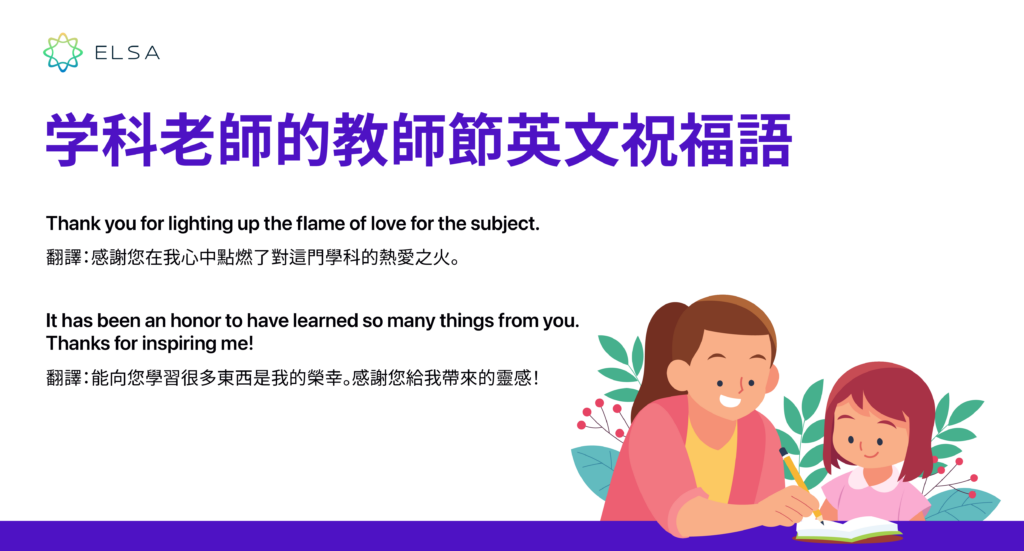
感謝老師的祝福語
| 短句 | 翻譯 |
| Thank you for being our teacher and giving us valuable advice! | 感謝您作為我們的老師並給予我們寶貴的建議! |
| Your dedication inspires us. Thank you for your devotion! | 您的奉獻精神激勵著我們。感謝您的奉獻! |
| I’m grateful to have met a teacher who inspires and helps me grow. | 我很慶幸能遇到了一位激勵我、幫助我成長的老師。 |
| I feel lucky to have a teacher who recognizes my talents and motivates me. | 我很幸運有一位能認得出我的才能並激勵我的老師。 |
| Your wisdom and kindness guide us to be better people. | 您的智慧和善良引導我們成為更好的人。 |

閲讀更多:
給老師的優美英文語錄
以下是 ELSA Speak 爲你總結出的優美感謝老師的祝福語,供你參考:
| 名言 | 作者 | 翻譯 |
| Let us remember: One book, one pen, one child, and one teacher can change the world. | Malala Yousafzai | 請記住:一本書、一支筆、一個孩子和一位老師可以改變世界。 |
| A teacher who loves learning earns the right and the ability to help others learn. | Ruth Beechick | 熱愛學習的老師有權利和能力幫助別人學習。 |
| Teaching is a very noble profession that shapes the character, caliber, and future of an individual. If the people remember me as a good teacher, that will be the biggest honor for me. | APJ Abdul Kalam | 教師是一個非常崇高的職業,它塑造一個人的品格、才幹和未來。如果人們記得我是一位好老師,那將是我最大的榮譽。 |
| The mediocre teacher tells. The good teacher explains. The superior teacher demonstrates. The great teacher inspires. | William Arthur Ward | 平庸的老師講述。好老師會解釋。優秀老師示範。偉大的老師鼓舞人心。 |

一些關於英語老師的名言
| 名言 | 翻譯 |
| The best teachers teach from the heart, not from the book. | 最好的老師是發自內心的教學,而不是書本上的教學。 |
| What the teacher is, is more important than what he teaches. | 老師是什麼,比他教什麼重要。 |
| I am not a teacher, but an awakener. | 我不是老師,而是覺醒者。 |
| The influence of a great teacher can never be erased. | 偉大導師的影響力是永遠無法抹去的。 |
| The art of teaching is the art of assisting discovery. | 教學的藝術就是協助發現的藝術。 |

關於教師節的英語範例段落
範例一
Taiwan Teachers’ Day, celebrated on September 28, holds significant meaning for every teacher and student. Upon arriving at school, my first impression is that the school looks more beautiful than usual today. The schoolyard is clean and adorned with neatly arranged rows of seats. Above the stage, the words “Taiwanese Teachers’ Day Celebration” are prominently displayed in the center of the banner. The ceremony starts promptly at seven-thirty. A crisp drum sound signals the students to settle down in their seats. Then, there are the opening musical performances. Next is the principal’s speech, followed by the students’ gratitude toward their teachers. After the ceremony concludes, my friends and I present fresh flower bouquets to our teachers. From the bottom of my heart, I feel immensely grateful to our teachers for educating us to become good individuals.
翻譯
9 月 28 日是台灣教師節,對每位老師和學生來說都具有重要的意義。到了學校,我的第一印像是今天的學校比平常漂亮多了。校園乾淨整潔,一排排座位排列整齊。舞台上,橫幅中央醒目地寫著「慶祝台灣教師節」的字樣。儀式於七點三十分準時開始。清脆的鼓聲響起,示意學生在座位上穩定坐下。然後是開幕音樂表演。接下來是校長致辭,接著是學生對老師的感謝。儀式結束後,我和我的朋友們向老師們獻上了鮮花。我從心底非常感謝老師們,教育我們成為好人。
範例二
Taiwanese Teachers’ Day is a meaningful occasion to express gratitude to those who have taught us to become individuals, imparting knowledge for everyone to build the future. That is why on this day, each of us is eager to find the most creative and meaningful gifts to present to our teachers. However, as students who have yet to earn money, we understand that precious gifts are not necessarily the most expensive; they come from our hearts. I remember last year when I gave my teacher a special gift—one that I made myself. It brought me happiness. I crafted it with all my heart, showing my respect for my teacher. I will always cherish my teachers and remember them in my heart for the rest of my life.
翻譯
台灣教師節是一個有意義的日子,向那些教導我們成人、為每個人傳授知識以建立未來的人表示感謝。這就是為什麼在這一天,我們每個人都渴望找到最有創意、最有意義的禮物來送給我們的老師。但是,身為還沒賺錢的大學生,我們明白,珍貴的禮物不一定是最貴的;而是來自我們的心意。我記得去年我給了老師一份特別的禮物──一份我自己做的。它給我帶來了快樂。這是我用心製作的,表達了我對老師的尊敬。我將永遠珍惜我的老師,並將他們銘記在心,終生難忘。
範例三
Teacher’s Day in Taiwan, celebrated on September 28th each year, has always been a special occasion for me. Every year, I eagerly look forward to this day to express my gratitude to the teachers who have taught and supported me throughout my studies. I usually prepare a bouquet of flowers and a congratulatory card to give to my teachers.
On this day, our school organizes many interesting cultural activities. I participate in a performance with my classmates, and the atmosphere is so joyful and warm. I feel very proud to stand on stage, along with everyone, to send our best wishes to our teachers. Teacher’s Day is not just an occasion for appreciation but also a beautiful memory that reminds me of the importance of education and the people who dedicate themselves to the noble profession of teaching.
翻譯
每年 9 月 28 日是台灣的教師節,對我來說一直是個特別的日子。每年,我都熱切地盼望著這一天,向在我求學期間教導和支持我的老師們表達我的謝意。我通常會準備一束鮮花和一張賀卡送給我的老師。
這一天,學校組織了許多有趣的文化活動。我和朋友們一起參加了音樂表演,氣氛愉快又熱烈。能夠站在講台上,和大家一起向我的老師們致以良好的祝愿,我感到非常自豪。教師節不僅是一個感恩的日子,更是一個美好的回憶,讓我想起教育的重要性,想起那些為人類成長事業奉獻的人。

以上是 ELSA Speak 想為您提供的所有教師節祝福語以及感謝老師的祝福語,希望您能在這篇文章之後與您的老師一起度過一個愉快的教師節!關注 ELSA Speak 官方網站,點進溝通交流英語專欄觀看更多!
母親節,又稱 Mother’s day,是人們對母親表達感激之情和孝順之情的一個重要、特殊的日子。與 ELSA Speak 參考母親節 英文祝福語吧!
2025 年母親節是什麼時候?
母親節 英文是 Mother’s Day,是全世界慶祝和紀念母親的日子。母親節通常在每年五月的第二個星期日。 2025 年的母親節將於 2025 年 5 月 11 日星期日舉行。

母親節的由來
母親節起源於古希臘和古羅馬的傳說,通常在春天慶祝。如今,希臘人經常隆重地組但是,一些資料認爲,母親節起源於英國,每年復活節前 40天左右舉行,以致敬母親們,孩子們經常向自己的母親贈送鮮花和蛋糕。直到 19世紀,這個活動已經不再多出現了。
母親節的意義

母親節受到每個人的歡迎和回應,因為這是孩子們向生養他們的人表達感激和尊重的機會。同時,這也是一個表彰母親和女性對家庭和社會的貢獻和功勞的機會。
有意義的母親節祝福語英文
| 祝福語 | 翻譯 |
|---|---|
| Sending you wishes to say you blossom up the world around me! Happy Mother’s Day! | 寄給媽媽最好的祝福以説明您讓我周圍的世界綻放!母親節快樂! |
| Mom, you are an amazing mother, a hero and a loving friend. Thank you for always supporting me. Happy Mother’s Day! Love you, mom! | 媽媽,您是一位了不起的母親,一位英雄,一位慈愛的朋友。謝謝媽媽一直以來對我的支持。母親節快樂!愛您媽媽! |
| You are an angel, you make everything more beautiful and you are the most loving mother in this world. You mean so much to me, mom. I love you! Happy Mother’s Day! | 媽媽,您是天使,您讓一切變得更加美麗,您是世界上最可愛的母親。媽媽對我來說是一個很有意義的人。我很愛您媽媽!母親節快樂! |
| Thank you for being such a great Mom, teacher and friend. Happy Mother’s Day! | 感謝您是如此出色的母親、老師和朋友。媽媽,母親節快樂! |
| Not only a beautiful woman, a great friend and a wonderful mother, you are all this to me and much more. I am so lucky and proud to have a mom like you. | 您不只是一個美麗的女人、一個好朋友、一個很棒的母親,對我來說,您就是一切。作為您的孩子,我感到非常幸運和自豪。 |
| Your love is like a rainbow that brings color into my world. I am such a lucky daughter/son. I love you so much! Happy Mother’s Day! | 母愛就像一道彩虹,為我的世界帶來美麗的色彩。您是一個非常幸運的女兒/兒子。我很愛您媽媽!母親節快樂! |
| Mom, thank you for never leaving me when I am down. I love you so much! Happy Mother’s Day! | 媽媽,我非常感謝您,因為每次我跌倒時您總是陪在我身邊。我很愛您媽媽!母親節快樂! |
| May your day be as wonderful and perfect as you are, mommy. Happy Mother’s Day! Always love you! | 我祝福您有一個像您一樣美好和完美的一天。母親節快樂!媽媽,我永遠愛您! |
| I hope to be a mother like you. Strong, loving, devoted, inspiring, wonderful and cool! Happy Mother’s Day. | 我希望將來我也能成為像您一樣的母親。堅強、充滿愛心、奉獻於家庭、鼓舞人心、精彩而平靜。母親節快樂。 |
| Every home, every heart, every feeling, every moment of happiness is incomplete without you. Only you can complete this world. Happy Mother’s Day! | 每一個家,每一顆心,每一種感覺,每一個幸福的時刻,沒有您都是不完整的。只有您才能完整這個世界。母親節快樂! |
| A beautiful woman, a great friend and a wonderful mother. You are all this to me and much more… I feel so lucky and proud to have a mom like you. | 一個美麗的女人,一個很好的朋友,一個很棒的母親。您對我來說就是這一切,還有更多……我為有一個像您這樣的媽媽感到非常幸運和自豪。 |
| Wishing you a day that’s just like you… really special | 祝您有一個像您一樣的一天…非常特別 |
| Happy Mother’s Day! I want you to be healthy, happy, loved each and every single day. I love you very much, mommy! | 母親節快樂!我希望您健康、快樂、熱愛每一天。我很愛您,媽媽! |
| Wishing you a day filled with goodness and warmth. Wishing you health and happiness, today and forever. Happy Mother’s Day! Love you, mama! | 祝您有個充滿美好和溫暖的一天。祝您今天到永遠健康快樂。母親節快樂!愛您,媽媽! |
| Dear mom, you have always been there, when ever i needed you the most. You have always guided me and shown me the right path. Happy Mother’s Day | 親愛的媽媽,當我最需要您的時候,您總是陪在我身邊。您一直指引著我,為我指明了正確的道路。母親節快樂 |
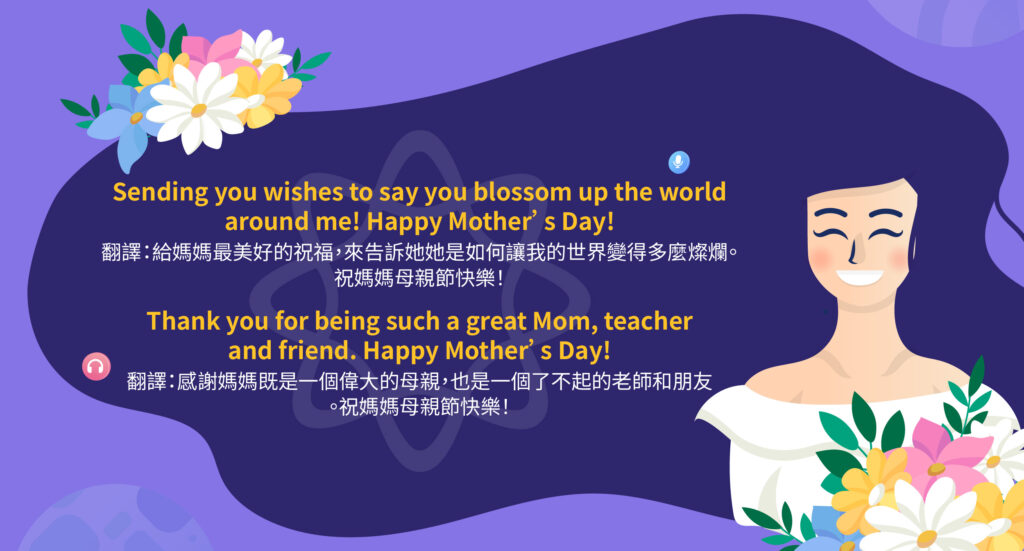
最簡單的母親節快樂英文祝福語
| 祝福語 | 翻譯 |
|---|---|
| Happy Mother’s Day to the multitasking mom! I am so grateful to have you as my mother. | 祝多任務的媽媽母親節快樂!我很感激有您作為我的母親。 |
| Mom! Your love paints a smile on my heart. Thank you for always being my pillar of strength and safety. | 媽媽!您的愛為我的心畫上微笑。感謝您一直是我的力量和安全支柱。 |
| Today is your day! Now, let’s celebrate your great life and your tireless efforts to help us become the best versions of ourselves. | 今天是您的日子!現在,讓我們慶祝您的美好生活以及您為幫助我們成為最好的自己所做的不懈努力。 |
| My beloved mother, your wisdom and compassion shaped me into who I am today. Happy Mother’s Day! | 我親愛的母親,您的智慧和慈悲塑造了我今天的樣子。母親節快樂! |
| Happy Mother’s Day to the greatest woman, the best friend, the most talented chef and the most fashion-savvy stylist in the world. | 祝福世界上最偉大的女人、最好的朋友、最有才華的廚師和最時尚的造型師母親節快樂。 |
>>閲讀更多:520最適合情侶的浪漫英語短句
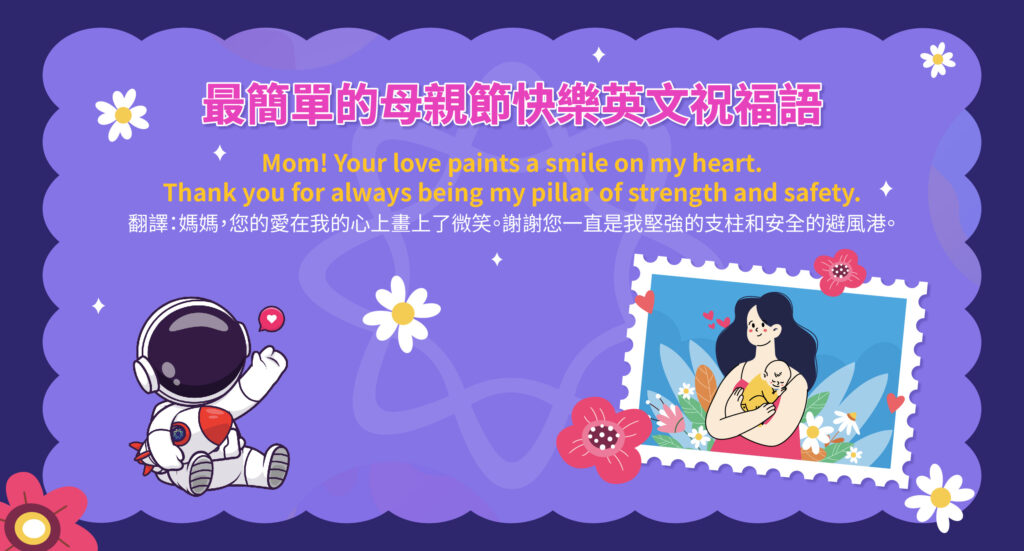
最好的母親節祝福語英文
| 祝福語 | 翻譯 |
|---|---|
| I love you so much. Your warmth and love have always made me feel safe and loved. I hope this moment will bring all the happiness you deserve. | 我真的很愛您。您的溫暖和愛一直讓我感到安全和被愛。我希望這一刻能帶給您所有應得的幸福。 |
| Today, I want to thank you for everything that you have done for me throughout my life. I hope you have a happy, peaceful and joyful life. | 今天,我要感謝您一生中為我所做的一切。我希望您有一個幸福、平靜、快樂的生活。 |
| Wishing that all your dreams come true. I want to express my gratitude for the love and care you give me. I hope you always remain healthy. | 祝您所有的夢想成真。我想對您給予我的愛和關心表示感謝。我希望您永遠保持健康。 |
| You are a symbol of kindness, gentleness, and lots of love. I deeply appreciate everything you’ve done for me. I love you, Mom, very much! | 您是善良、溫柔和充滿愛情的象徵。我深深感謝您為我所做的一切。我愛您,媽媽,非常愛您! |
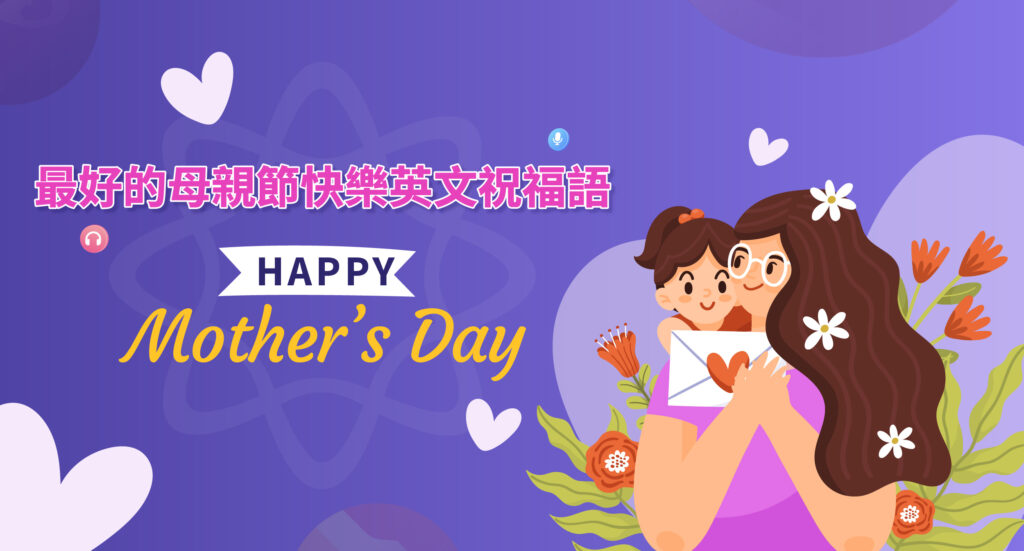
最有趣的母親節快樂英文祝福語
| 祝福语 | 翻译 |
|---|---|
| Thank you for being my first and forever IG friend, Mom. Best wishes for Mother’s Day! | 媽媽,謝謝您成為我第一個也是永遠的 IG 朋友。母親節最美好的祝福! |
| Raising me needed a lot of patience; thank you for everything you’ve done! | 養育我需要很大的耐心;感謝您所做的一切! |
| Although Mom always jokes about picking me up from the trash can, I know it’s not true (chuckles). Happy Mother’s Day to my dear mom. | 雖然媽媽總是開玩笑說要把我從垃圾桶裡撿起來,但我知道這不是真的(笑)。祝我親愛的媽媽母親節快樂。 |
| I wonder why Mom always knows where things are, even if we’ve looked everywhere and can’t find them. You are the true MVP! | 我想知道為什麼媽媽總是知道東西在哪裡,即使我們找遍了所有地方都找不到它們。您才是真正的MVP! |
| Thank you, Mom, for patiently answering our foolish questions from childhood to now. You are the ultimate Google! Happy Mother’s Day. | 媽媽,謝謝您從童年到現在耐心地回答我們的愚蠢問題。您是超级棒的谷歌!母親節快樂。 |
| Mom, thank you for tolerating us through our rebellious era. You deserve a medal and many spa days. | 媽媽,謝謝您包容我們度過了叛逆的時代。您值得一枚獎牌和許多水療日。 |
| I was looking for an ideal Mother’s Day gift for you. But then I realized you had already received it [number] years ago – it’s me! | 我正在為您尋找一份理想的母親節禮物。但後來我意識到您幾年前就已經收到它了 – 是我! |
| Sometimes I feel sorry for other people because I have the best mother in the world! Mommy, I love you a lot. | 有時我會為別人感到遗憾,因為我有全世界最好的媽媽!媽媽,我很愛您。 |
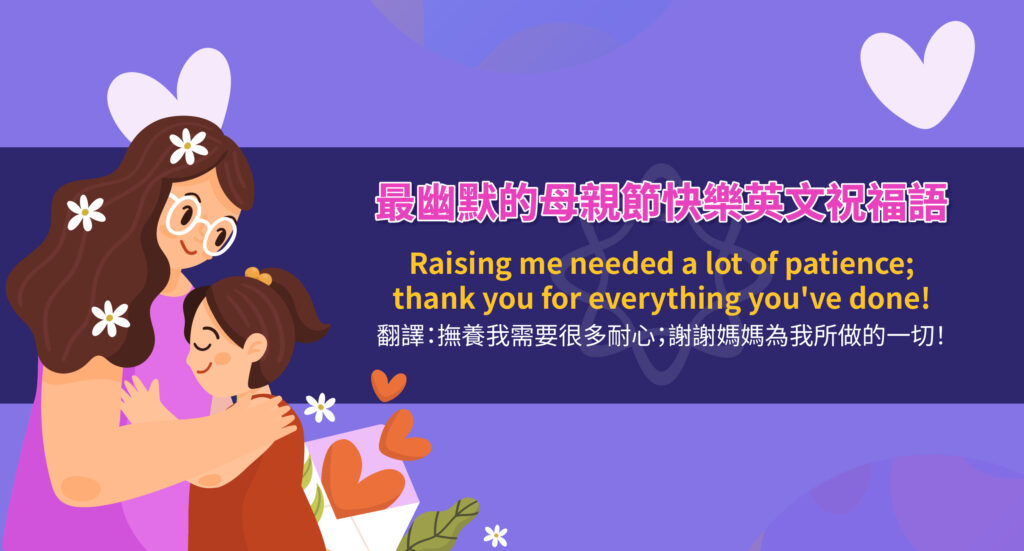
給媽媽的母親節祝福語英文
| 祝福语 | 翻译 |
|---|---|
| Today? No. Every day is Mother’s Day. Every day, I want to say “I love you”. I will from now on. | 今天?不,每天都是母親節。每一天,我都想說「我愛您」。從現在開始我會的。 |
| Sometimes God sends angels. When he can’t, he gives us moms. | 有時上帝會派遣天使。當他不能時,他給了我們媽媽。 |
| I wish we could be together today, so I could give you the warmest embrace and tell you in person that you’re the greatest person on this Earth and that I am the luckiest to have you as my mother. | 我希望我們今天能在一起,這樣我就能給您最溫暖的擁抱,並親自告訴您,您是這個地球上最偉大的人,有您作為我的母親是我最幸運的。 |
| Even though I may not be able to call or visit you regularly, I sincerely hope you know that I do love and miss you so much. Always have been and always will be. Today and every other day. | 儘管我可能無法定期打電話或看您,但我真誠地希望您知道我非常愛您並想念您。過去一直如此,將來也永遠如此。今天和每一天。 |
| You may think that nothing you do is noticed, but I do want you to know how much I value everything you do, no matter how minor. Every single time. I will never stop being grateful for that. | 您可能認為您所做的一切都不會被注意到,但我確實想讓您知道我有多重視您所做的一切,無論多麼微小。每一次。我永遠不會停止對此表示感激。 |
| Everything I am now is because you love me. | 我現在的一切都是因為您愛我。 |
| Today I hope that you will always feel cherished, encouraged and respected, because that is exactly how you make me feel every single day. | 今天,我希望您永遠感到被珍惜、被鼓勵和被尊重,因為這正是您每天讓我感受到的。 |
| Thank you for always encouraging me to be who I am and having faith in my ability to do anything. | 感謝您一直鼓勵我做我自己,並相信我有能力做任何事。 |
| This Mother’s Day, I just want you to know that I forgive you for all the times you got mad at me for something that [insert sibling name here] did. | 这个母親節,我只想讓您知道,我原諒您每次因為[在此填兄弟姐妹的名字]所做的事情而生我的氣。 |
| Money may not grow on trees, but thankfully there has always been plenty in the bottom of your purse. | 錢可能不會從樹上長出來,但值得慶幸的是,您的錢包裡總是有足夠的錢。 |
| Mom, please let me, dad, and [insert sibling name here] do everything for you: laundry, dishes, meals, you name it. Please, enjoy your day to the fullest! | 媽媽,請讓我、爸爸和[在此填兄弟姊妹的名字]為您做一切:洗衣、洗碗、吃飯,等等。請盡情享受您的一天! |
| So much of what I adore about my mom inherits from you. I will be forever grateful to have you both. | 我對我媽媽的愛有很多遺傳自外婆。我將永遠感激有您們倆。 |
| I understand what unconditional love looks like because of you. Thank you from the bottom of my heart for giving me so much affection. | 因為您,我明白了無條件的愛是什麼樣子。我從心底感謝您給了我這麼多的感情。 |
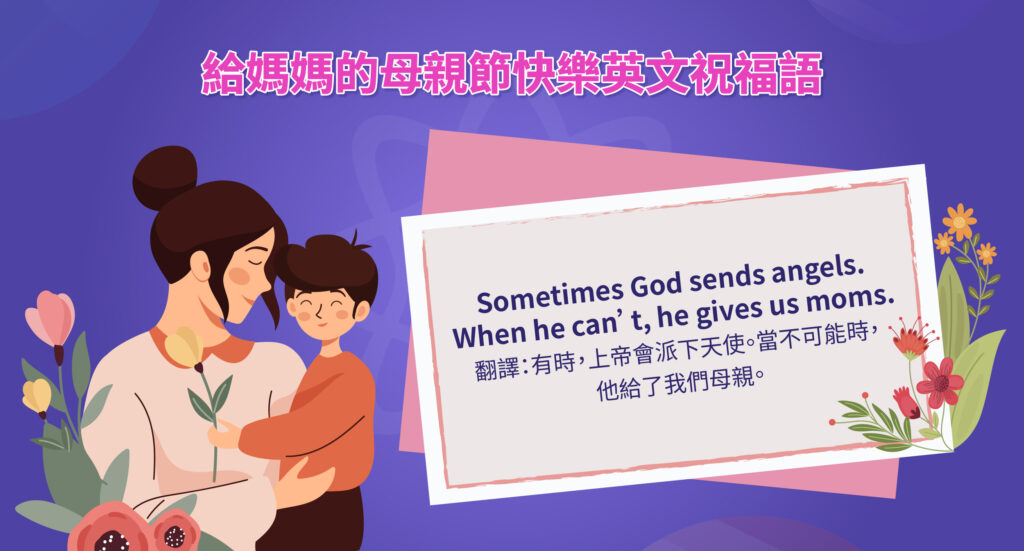
母親節 英文短語
| 句子 | 翻譯 |
|---|---|
| A mother’s love is unconditional. | 母親的愛是無條件的。 |
| The bond between a mother and child is unbreakable. | 母親和孩子之間的連結是牢不可破的。 |
| A mother is a child’s first teacher. | 母親是孩子的第一位老師。 |
| A mother’s hug can heal all wounds. | 母親的擁抱可以治癒一切傷口。 |
| A mother’s love knows no boundaries. | 母親的愛是沒有邊界的 |
| A mother’s love is forever. | 母親的愛是永遠的。 |
| A mother is the heart of the family. | 母親是家庭的心臟。 |
| A mother’s love is a beautiful flower that never fades. | 母愛是一朵美麗的花,永不凋謝。 |
| A mother’s love is a symphony of love and tenderness. | 母愛是一首愛與溫柔的交響曲。 |
| A mother’s love is a gentle breeze on a summer’s day. | 母愛是夏日裡的一陣微風。 |
| A mother’s love is a steady hand in a turbulent sea. | 母愛是洶湧大海中堅定的手。 |
| A mother’s love is a guiding light in the darkness. | 母愛是黑暗中的指路明燈。 |

母親節 英文對話範例
| 説話者 | 英文 | 翻譯 |
|---|---|---|
| Mom | Hello, Xiao Hua is speaking. | 您好,小花在聼。 |
| Child | Mom, it’s me, your favorite child. | 媽媽,是我,您最愛的孩子。 |
| Mom | Hi there. How’s it going? | 您好呀。怎麼樣了? |
| Child | I’m doing good. Mom, do you know what day it is? | 我做得很好。媽媽,您知道今天是什麼日子嗎? |
| Mom | I don’t know. The day when my silly but rich child comes home and takes me out to the biggest shopping mall in town? | 我不知道。有一天,是我愚蠢但富有的孩子回家並帶我去城裡最大的購物中心賣衣服嗎? |
| Child | I wish I could. Mom, I’m afraid that I might not be able to be with you today because of my business trip. | 我希望我能。媽媽,我今天因為出差,恐怕不能陪您了。 |
| Mom | Oh, I’m gonna be so sad. | 哦,我會很難過的。 |
| Child | Mom, I wish I could be home right now, so I could give you the warmest embrace and tell you in person that you’re the greatest person on this Earth and that I am the luckiest to have you as my mother. | 媽媽,我希望我現在就可以回家,這樣我就可以給您最溫暖的擁抱,並親自告訴您,您是這個地球上最偉大的人,有您作為我的母親是我最幸運的。. |
| Mom | Don’t make me cry today, ok? It’s my day. | 今天別讓我哭好嗎?這是我的一天。 |
| Child | Today? No. Every day is Mother’s Day. Every day, I want to say “I love you”. I will from now on. | 今天?不,每天都是母親節。每一天,我都想說「我愛您」。從現在開始我會的。 |
| Mom | Gosh! What’s with that smooth-talk? Did your colleagues teach you? | 天哪!這麼圓滑的談話是怎麼回事?您的同事教過您嗎? |
| Child | Everything I am now is because you love me. | 我現在的一切都是因為您愛我。 |
| Mom | I’m crying, indeed. | 我在哭的,真的 |
| Child | I miss you a lot, mom. | 我很想念您,媽媽。 |
| Mom | What? I don’t even know about that! | 什麼?我怎麽不知道! |
| Child | Mom… | 媽媽… |
| Mom | Just kidding! Please take care. As you said, every day is Mother’s Day, right? So try to finish your trip and pay me a visit as soon as possible, will you? | 只是在開玩笑!請保重。正如您所說,每天都是母親節,對嗎?所以,請盡快完成您的出差並來看我越早越好,好嗎? |
| Child | Definitely. | 肯定的。 |
| Mom | Alright. Don’t worry too much. I’m gonna have your dad take me shopping. | 好吧。別太擔心。我要讓您爸爸帶我去購物。 |
| Child | Mom, please know that I do love and miss you so much. Always have been and always will be. Today and every other day. | 媽媽,請知道我很愛您、想您。過去一直如此,將來也永遠如此。今天和每一天。 |
| Mom | Ok I’ve got it now. I love you too. | 好的,我現在明白了。我也愛您。 |
| Child | I love you more. | 我更愛您。 |
| Mom | Ok. I’m hanging up. See ya. | 好的。我掛了。再見。 |
| Child | Bye mom. | 再見媽媽。 |
| Mom | Gosh! Cringe. But cute. | 天哪!太肉麻了。但很可愛。 |

母親節 英文詞彙
| 英文單字 | 音標(IPA) | 翻譯 |
|---|---|---|
| Mother / Mom | /ˈmʌðər/ / /mɒm/ | 媽媽 |
| Adorable | /əˈdɔːr.ə.bəl/ | 可愛 |
| Attractive | /əˈtræk.tɪv/ | 吸引人 |
| Beautiful | /ˈbjuː.tɪ.fəl/ | 美麗 |
| Benevolent | /bəˈnev.ə.lənt/ | 仁慈 |
| Capable | /ˈkeɪ.pə.bəl/ | 有能力 |
| Compliant | /kəmˈplaɪ.ənt/ | 合規 |
| Faithful | /ˈfeɪθ.fəl/ | 忠實 |
| Industrious | /ɪnˈdʌs.tri.əs/ | 勤勞 |
| Lovely | /ˈlʌv.li/ | 可愛 |
| Elegance | /ˈel.ɪ.ɡəns/ | 優雅 |
| Painstaking | /ˈpeɪn.steɪ.kɪŋ/ | 勤苦 |
| Resilient | /rɪˈzɪl.iənt/ | 堅强 |
| Resourceful | /rɪˈsɔːrs.fəl/ | 足智多謀 |
| Sacrificial | /ˌsækrɪˈfɪʃ.əl/ | 犧牲 |
| Virtuous | /ˈvɜːr.tʃu.əs/ | 有德行 |
| Thrifty | /ˈθrɪf.ti/ | 節儉 |
| Tidy | /ˈtaɪ.di/ | 整齊 |
| Graceful | /ˈɡreɪs.fəl/ | 優美 |
| Sensitive | /ˈsen.sə.tɪv/ | 敏感 |
| Soothing | /ˈsuː.ðɪŋ/ | 舒緩 |
| Change | /tʃeɪn(d)ʒ/ | 改變 |
| Clean her house | /kliːn hɜːr haʊs/ | 打掃她的房子 |
| Female | /ˈfiːmeɪl/ | 女性 |
| Go shopping | /ɡəʊ ˈʃɒpɪŋ/ | 去購物 |
| Go out with friends | /ɡəʊ aʊt wɪð hɜːr frɛndz/ | 和朋友出去 |
| Prepare | /prɪˈpɛː/ | 準備 |
| Prepare meals for family | /prɪˈpɛː mɪəlz fɔːr hɜːr ˈfæmɪli/ | 為家人準備飯菜 |
| Take care of children | /teɪk keər əv hɜːr ˈʧɪldrən/ | 照顧孩子 |
| Unequal | /ʌnˈiːkw(ə)l/ | 不公平 |
| Violence | /ˈvaɪələns/ | 暴力 |
| Visit parents | /ˈvɪzɪt hɜːr ˈpɛərənts/ | 看父母 |
| Work to get money | /wɜːk tə ɡɛt ˈmʌni/ | 工作是為了賺錢 |

常見問題:母親節英文縮寫是什麽?
母親節的英文縮寫是 Mother’s Day,通常縮寫為 MD.
以上是 ELSA Speak 整理的英文母親節祝福語文章,希望學習者在看完這篇文章後,能夠運用以上的祝福來表達對母親的愛!瞭解更多節日的單字與祝福,點進溝通交流英語專欄盡情觀看吧!
為了讓文章更具吸引力、流暢且容易贏得讀者的青睞,我們需要使用連接詞來連接句子,例如 while。跟著 ELSA Speak 一起來學習 while例句及其相關用法吧!
While 結構是什麼?

While 結構用於句子中,表示 “當……時” 或 “在……期間”,當兩件事情或行動同時發生時會使用這個結構。為了更清楚地了解這個結構,我們來看看以下例句:
- While my mom is cooking a meal, I am doing my homework.
大致翻譯: 當我媽媽在做飯時,我正在做作業。
- While my husband was fixing the fan, I was eating fruit.
大致翻譯: 當我丈夫在修理風扇時,我正在吃水果。
while 用法
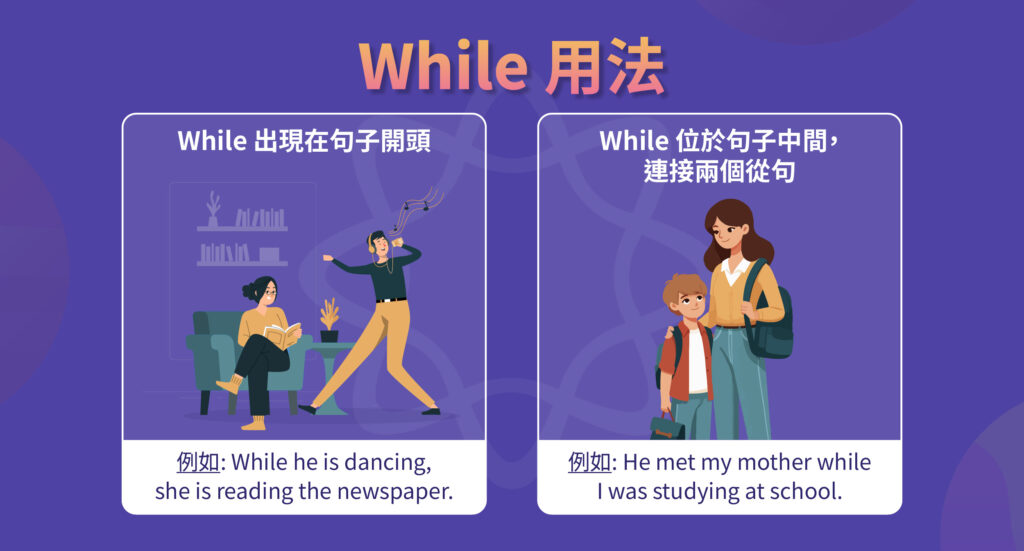
在英語中,while 用法有兩種也就是説 while 在句子中有兩個位置,這是日常生活中常見的用法。我們來看看下面的表格,了解如何在句子中使用 while 結構以及具體例句。
| While 結構 | While 結構公式 | 例句 |
| While 位於句首 | While 主語 + 動詞,主語 + 動詞 | While he is dancing, she is reading the newspaper. 大致翻譯: 當他在跳舞時,她正在看報紙。 |
| While 位於句中連接兩個子句 | 主語 + 動詞 while 主語 + 動詞 | He met my mother while I was studying at school. 大致翻譯: 當我在學校學習時,他遇到了我媽媽。 |
閲讀更多:
- If 用法,概念,結構與練習: 一、二、三,混合
- Used to, be used to, get used to 的構造在英文中的用法是什麼?區別和練習示例以避免混淆
- 使役動詞 (Causative Verb): 定義、用法、結構和避免用錯的應用練習
含有 while 的特殊短語
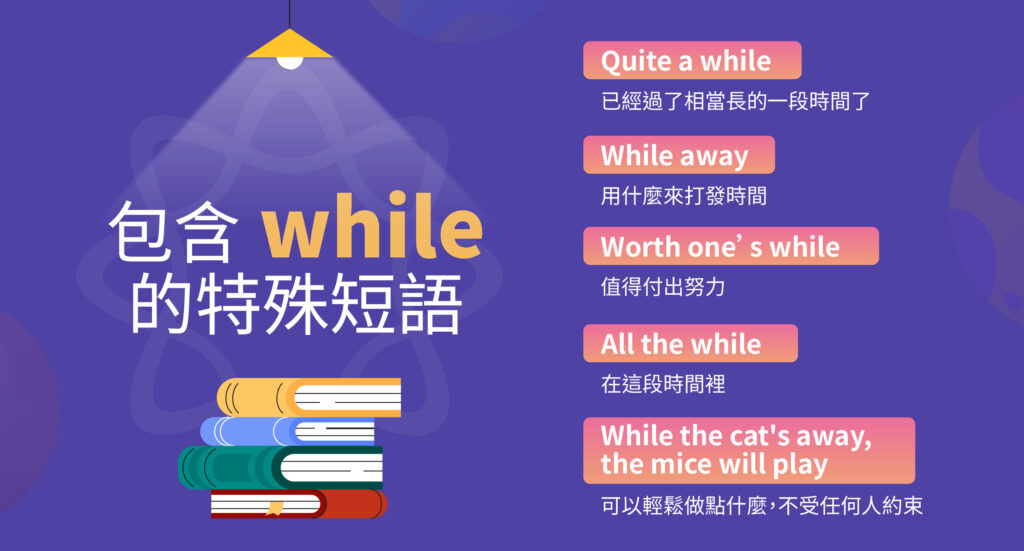
“While” 還可以與其他短語結合,形成在考試如 IELTS、TOEIC、TOEFL 等中常見的高分詞彙。以下是一些相關短語供大家參考。
| 包含 while 的短語 | 意思 | 例句 |
| Quite a while | 已經過了一段很長的時間 | It has been quite a while since I last saw Jack. 大致翻譯: 自從我上次見到 Jack 已經過了很久了。 |
| While away | 用某事消磨時間 | I whiled away the morning by talking with my best friends. 大致翻譯: 我通過與最好的朋友們聊天來打發早上的時間。 |
| Worth one’s while | 值得付出努力 | It would be worth your while reading this research about the environment because it is full of rare information. 大致翻譯: 研究這個環境是值得的,因為它充滿了罕見的信息。 |
| All the while | 這段時間以來 | There I was thinking you studied hard at school but you slept all the while. 大致翻譯: 我以為你在學校努力學習,但你卻一直在睡覺。 |
| While the cat’s away, the mice will play | 可以隨意做事,沒人管 | I’d never leave my children at a place where they can be alone while I’m going on business. As they say, while the cat’s away, the mice will play. 大致翻譯: 當我出差時,我絕不會讓我的孩子獨處,正如他們所說:貓不在,老鼠翻天。 |
when while 差異
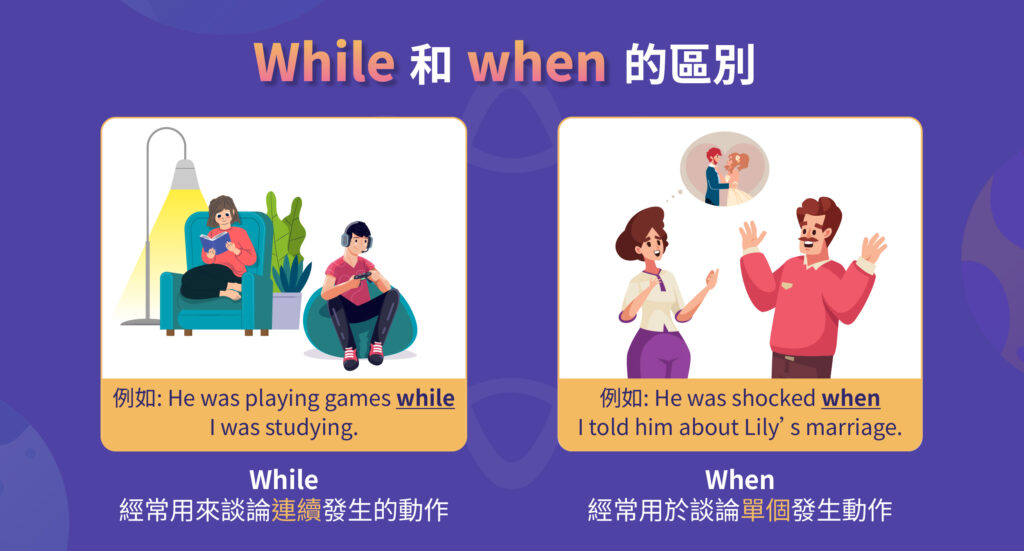
| While 的結構 | When 的結構 | |
| 用法 | While 結構通常用於描述兩個動作同時發生,並且可能持續一段時間,常用進行時態。 | When 結構通常用來描述單一動作,發生時間很短,常用一般過去時或一般現在時。 |
| 例句 | He was playing games while I was studying. 大致翻譯: 當我學習時,他在玩遊戲。 | He was shocked when I told him about Lily’s marriage. 大致翻譯: 當他聽到我說 Lily 的婚禮時,他感到震驚。 |
whilst while分別

相似點
當作為連接詞或關係副詞時,”whilst” 和 “while” 意思相同,可以互換使用。
例子: Alex felt so bored whilst/while Sam was away for school.
大致翻譯: 當 Sam 去遠處上學時,Alex 感到非常無聊。
不同點
| While 結構 | Whilst 結構 | |
| 用法 | “While” 比 “Whilst” 使用更為普遍 While 是日常生活中使用更為常見。 | 然而,在書面語中,”whilst” 結構會讓句子顯得更加正式。 |
| 例子 | Would you like something to drink while we’re waiting? 大致翻譯: 我們等的時候你想喝點什麼嗎? | Whilst I appreciate your help, I want to do this by myself. 大致翻譯: 我感謝你的幫助,但我想自己完成這件事。 |

While 練習題附答案
練習 1: 填入 While 或 When
1. I often ate chocolate, ……..I was a child.
2. We saw the first signs of summer,…………………..we were driving down the road.
3. We first met each other……….we were staying in Korea.
4. …………… Alex got up yesterday, the rain was falling.
5. I will text you…………….I get home.
答案
| 1 | 2 | 3 | 4 | 5 |
| when | while | while | when | when |
練習 2: 選擇正確的詞填入句子
1. I saw her while/when I was on my way home.
2. While/when he was young, he used to smoke.
3. Tom had a terrible accident while/when he was a child.
4. While/when Mary was taking a bath, the phone rang.
5. While/when we lived in Korea, we met many interesting people.
6. Where are my friends while/when I most need them?
7. While/when I was driving, I listened to a radio program.
8. Who did you meet while/when you arrived at the party?
9. While/when I was speaking, they were thinking of something else.
10. I had many problems while/when I was a teenager.
答案
| 1 | 2 | 3 | 4 | 5 |
| while | When | When | While | When |
| 6 | 7 | 8 | 9 | 10 |
| when | While | when | While | when |
練習 3: 重新寫句子,使用 “when” 或 “while”
1. I was making dinner. My brother was watching television.
2. We were watching a movie. A friend came over.
3. We were watching the movie. We were laughing.
4. The movie ended. I turned off the TV.
5. I was talking on the phone. My friend was reading a newspaper.
6. My friend stood up to leave. It was midnight.
7. He touched the door knob. We heard a thud on the roof.
答案
1. While I was making dinner, my brother was watching television.
2. We were watching the movie when a friend came over.
3. While we were watching the movie, we were laughing.
4. When the movie ended, I turned off the TV.
5. While I was talking on the phone, my friend was reading a newspaper.
6. My friend stood up to leave when it was midnight.
7. When he touched the doorknob, we heard a thud on the roof.
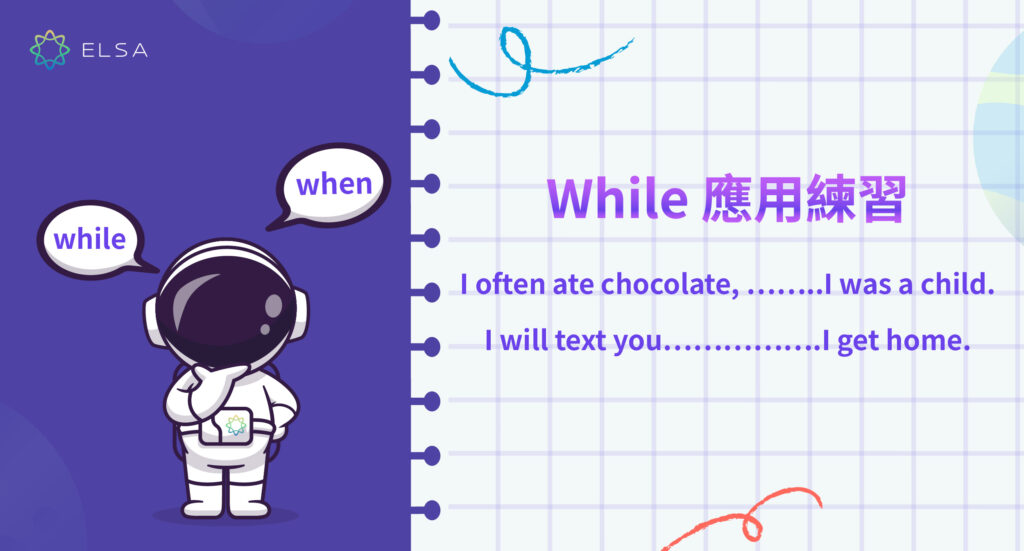
常見問題
While 中文是什麼?
While 在中文是「在…期間」。
While 後面加什麼?
在 “while” 後面通常加一個子句,描述同時發生的行動。
While 發音是什麽?
“While” 在英語中的發音是 /waɪl/.
以上是關於 while 結構的用法和分別的介紹,希望這些信息能幫助你更好地掌握這兩個連接詞,請繼續關注 ELSA Speak 的其他文章哦!
在辦公環境中,使用英文進行溝通的其中一個情況就是當你需要請假時。和ELSA Speak一起學習如何撰寫專業的英文請假單吧!
| Key takeaways |
| – 英文請假email的目的是通知公司外國老闆或合資企業上級您的請假事宜。 – 英文請假email的結構包括:問候語、請假目的、請假原因、具體請假時間、承諾在請假期間或之後完成的事項、聯絡信息及簽名。 – 一些常見的英文請假單範本:年假請假單、產假請假單、旅遊假請假單、婚假請假單、喪假請假單、請假學校範本。 |
什麼是請假單?
請假單是一種文件或行政手續。此單用於某人因某些原因希望在特定時間內請假不工作的情況。
基本的請假單類型包括:
- 病假請假英文單(Application for sick leave)
- 上課請假英文單 (Leave application for school)
- 婚假請假英文單 (Marriage leave application)
- 旅遊請假英文單(Vacation leave application)
- 產假請假英文單 (Application for maternity leave)
- 年假請假英文單 (Annual leave application)
- 喪假請假英文單 (Funeral leave)
- 臨時請假英文單 (Application for sudden leave)
- 半天請假英文單 (Application for half-day leave)
請假單的目的
在公司中,如果老闆或上級是外國人,或在外資合資企業中,員工需要用英文寫請假郵件,以確保雙方的理解。
同時,請假單也適用於那些在國外學習或工作,或者在國際環境中工作,或者從事勞務出口的人。
因此,為了確保擁有最準確、最符合具體情況的請假單,讀者需要了解並掌握請假單的主要信息和結構,正如ELSA Speak在下文中介紹的內容。
請假單的結構
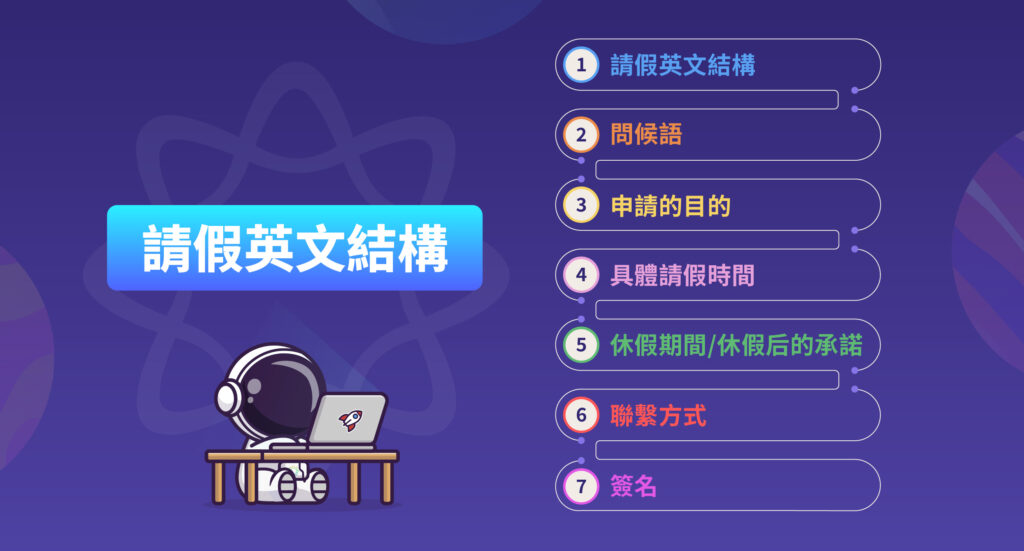
請假單的基本信息
一些必要的信息,讀者應該在請假單中提及,依次為:
- 問候語
- 請假單的目的
- 請假原因
- 具體請假時間
- 承諾在請假期間或之後完成的事項
- 聯絡信息
- 簽名
結構
開頭部分
英文請假單的名稱 (Annual leave application, maternity leave application,…) 通常寫在郵件的主旨欄。
>>參考此文:總結5種簡單且常見的英文email開頭方式
正文部分
- 問候語
結構: Dear Ms./Mr./Mrs.
大致翻譯: 親愛的 Ms./Mr./Mrs. <收件人名字>
- 請假單的目的、請假原因和請假時間
| 結構 | 大致翻譯 |
| I am writing this letter to ask for your permission for [date]. | 我寫這封信是為了請假,原因是<請假原因>,時間為<日期>。 |
| I would like to request approval of my leaves from [date] to [date] for [reason]. | 我想請假從<日期>到<日期>。 |
- 工作交接(如有需要)
結構: I have discussed my situation with [Name], and he/she accepted to cover my work in my absence.
大致翻譯: 我已將重要的工作交接給<名字>。他/她將會處理這些工作直到我回來。
- 表達自己的期望
| 結構 | 大致翻譯 |
| So please accept my leave from (date to date). I will be thankful to you. I regret any inconvenience. | 請接受我從<日期>到<日期>的缺席。如因我的缺席造成任何不便,我深感抱歉。 |
| I hope you understand my situation and authorize my request as soon as possible. | 我希望您能理解我的情況,並儘快批准我的請假申請。 |
結尾部分
祝福語/結尾語,簽名
| 結構: Yours sincerely,/Best regards,/Yours truly,/Sincerely, |
翻譯: 敬上,
>>參考此文:英文信件結尾不要只寫 Best regards ,總結寫英文信件結尾的方法
英文請假範例

當面直接請假
| 句型 | 大致翻譯 |
| Excuse me. May I ask for tomorrow morning off? | 抱歉,我明早可以請假嗎? |
| I’m sorry, I think I may not be able to work tomorrow as I’m not feeling well right now. | 抱歉先生,我覺得我明天無法上班,我身體不太舒服。 |
| Wouldn’t it be possible for me to take a day off this Tuesday? | 我可以請假這個星期二嗎? |
| Wouldn’t it be possible for me to take this Friday morning off because I have a family matter? | 我週五早上有些家庭事務,可以請假那個早上嗎? |
| I want to take a day off to see a doctor. | 我想請一天假去看醫生。 |
| I got an afternoon off and went to the hospital. | 我下午請假去醫院可以嗎? |
| Wouldn’t it be possible for me to take the day off this Friday? | 這週五我可以請一天假嗎? |
請假英文email
| 句型 | 例如 |
| I would like to ask permission for a day off from work on ….. (date) because ….. (reason): 我寫這封信是為了請求(您)讓我在<日期>請一天假,因為<原因>。 | I would like to ask permission for a day off from work on August 8th since I have to go to hospital. 大致翻譯: 我寫這封信是為了請求您讓我在8月8日請一天假,因為我需要去醫院。 |
| I am writing to request your approval for a day off on ….(date) for (reason): 我寫這封信是為了請求在<日期>請一天假,因為<原因>。 | I am writing to request your approval for a day off on this Monday for a family matter. 大致翻譯: 我寫這封信是為了請求在這個星期一請一天假,因為家庭原因。 |
| I am writing this letter to let you know that I am in need of a long-term leave, from …. to… (date): 我寫這封信是為了通知您我需要長期請假,從<日期>到<日期>。 | I am writing this letter to let you know that I am in need of a long-term leave, from September 1st to September 15th because I have to hospitalize to treatment. 大致翻譯: 我寫這封信是為了通知您我需要長期請假,從9月1日到9月15日,因為我需要住院治療。 |
| I am writing to request your approval for …. day leave for … (reason):我寫這封信是為了請求您批准我請<天數>天假,因為<原因>。 | I am writing to request your approval for 3 days leave for a vacation. 大致翻譯: 我寫這封信是為了請求您批准我請3天假去旅遊。 |
| I am writing this letter to inform you that I need to take (day) of absence from … to … (date): 我寫這封信是為了通知您我需要從<日期>到<日期>請假<天數>天。 | I am writing this letter to inform you that I need to take 3 days of absence from August 10th to August 12th. 大致翻譯: 我寫這封信是為了通知您我需要從8月10日到8月12日請假3天。 |
上課請假英文範例
| 上課請假英文例句 | 中文翻譯 |
|---|---|
| I’m sorry, I can’t attend class today because I’m not feeling well. | 抱歉,我今天身體不適,無法上課。 |
| I would like to ask for leave from class today due to a personal matter. | 我想因私事請假,不參加今天的課。 |
| I have a family emergency and won’t be able to join the class. | 我家裡有緊急狀況,無法參加課堂。 |
| Please excuse my absence from class tomorrow. | 請原諒我明天無法上課。 |
| I will miss today’s class. Could you please let me know what I missed? | 我今天會缺課,可以請您告訴我我錯過了什麼內容嗎? |
| I need to take a day off from class on [date]. | 我需要在[日期]請一天假不上課。 |
| May I be excused from class today? | 我今天可以請假不上課嗎? |
| I apologize for missing class. I will catch up on the work. | 很抱歉缺課,我會補上進度的。 |

請假英文 用法
對話範例
Ling: Excuse me. May I ask for tomorrow morning off?
Mei: Oh. What is the reason?
Ling: I’m not feeling well right now. I need to see a doctor tomorrow.
Mei: Okay. Have you arranged your work tomorrow?
Ling: I have done all the work. If it has any mistake, you can ask Mr.Hung to fix for me.
Mei: All right. Take a day off to rest. If I need more days off, please send an email for me.
Ling: Thank you.
大致翻譯
Ling: 抱歉,我可以請假明天早上嗎?
Mei: 哦,什麼原因呢?
Ling: 我感覺不太舒服,明天需要去看醫生。
Mei: 好的。明天的工作你已經安排好了嗎?
Ling: 我已經完成所有工作了。如果有問題,你可以請啊興先生幫我處理。
Mei: 好的。你就好好休息一天吧。如果需要更多假期,請發郵件給我。
Ling: 謝謝你。
Email 範例
Subject: Sick leave application
Dear Mr Brown,
I am writing to notify you that I need sick leave from work because of a several viral infection. I caught the infection yesterday evening and since then have been feeling very weak.
As per the doctor, I take medication for 5 days, along with proper rest for at least a week.
Kindly allow me a week-long leave, until July 25th. If I need an extended period off, I will let you know as early as possible.
Thank you for your quick attention to this matter.
Sincerely,
Zack Seraphine
大致翻譯
主題:請假申請
致 Mr Brown,
我寫這封信是想通知您,由於我感染了病毒,我需要請病假。我昨晚開始生病,從那時起我感覺非常虛弱。
根據醫生的建議,我需要5天的治療時間,並且至少需要1周的充分休息。
請允許我請假1周,至7月25日。如果我需要更多的休息時間,我會及時通知您。
感謝您的關注。
敬上,
Zack Seraphine
>>相關内容:英文 email 結尾:20+ 種專業且禮貌地結束 email 的合輯
英文請假單範本

年假請假單範本 (Annual leave)
Dear Ms./Mr./Mrs. ,
I am writing this letter to ask for your permission for my annual leave, between {start date} and {end date}.
I have transferred my important tasks to. He/she will take over my project while I am away. I have already handed over all material regarding the project to him/ her, and expect there to be no exigencies in my absence.
I hope you will understand my situation and response to my request.
I will be grateful for a positive reply on my leave request.
Thank and regards,
大致翻譯
{Your Name}
親愛的 Ms./Mr/Mrs.(收件人名字),
我寫這封信是為了請求批准我從 {開始日期} 到 {結束日期} 的年假。
我已經將我的重要任務移交給(接收任務者名字)。他/她將在我不在的期間負責我的項目。我已經將所有與項目相關的文件交接給他/她,希望在我缺席的期間不會有緊急情況發生。
我希望您能理解我的情況,並儘快回覆我的申請。
如果能收到您的積極回覆我的請假申請,我將不勝感激。
感謝並敬上,
{你的名字}
產假請假單範本 (Maternity leave)
Dear Ms. /Mr. /Mrs. ,
I would like to inform you that I am approaching the end of my pregnancy and plan to take maternity leave. I am planning to start my maternity leave on and go back to work by…
In my absence, [Name] can be in charge of [specific parts of your job]. I have trained him/her about all the necessary daily tasks. If you have any concerns, please let me know so we can address them.
See my attached maternity leave plan for further details.
Thank you for your attention. I wish you good health.
Yours sincerely,
大致翻譯
親愛的Ms./Mr./Mrs.,
我想通知您,我即將進入孕期尾聲,並計劃開始產假。我打算從{日期}開始產假,並預計在{日期}回來上班。
在我缺席的期間,{名字}將負責{你的具體工作內容}。我已經對他/她進行了所有必要的日常工作培訓。如果您有任何疑問,請隨時告訴我,我們可以一起解決。
請參考隨附的產假計劃,了解更多詳情。
感謝您的關注,並祝您身體健康。
敬上,
旅遊假請假單範本 (Family vacation)
Dear Ms./Mr./Mrs. ,
I hope this email finds you well.
I am writing this letter to request your approval for a 14-day-leave for my family vacation. I would like to start my vacation from [date] to [date] .
In the meanwhile, my teammate, Mr./Ms. {enter name} has been authorized to take up any pressing matters in terms of my job duties. I am confident that my team will perform well during my absence.
I look forward to your approval.
Best wishes,
大致翻譯
親愛的Ms./Mr./Mrs.,
希望您一切安好。
我寫這封信是為了徵求您的意見,請求批准我14天的家庭旅遊假。我計劃從[日期]到[日期]開始度假。
在此期間,我的同事{輸入名字}已經被授權處理與我的工作相關的緊急事務。我相信我的團隊在我不在的期間會有效運作。
期待您的批准。
祝您一切順利,
婚假請假單範本 (Marriage leave)
Dear Ms./Mr./Mrs. ,
I am [Name] and it is joyful to inform you that I am getting married on [date] at [time] .
I would like to request approval of my leaves from [date] to [date] .
I will go back to the office to work on [Date]. I have discussed my situation with [Name], and she accepted to cover my work in my absence.
I will make sure to finish my tasks by [date]. I have also transferred some of my duties to [Name].
Please kindly grant me leaves for the mentioned dates and celebrate the wedding with me.
Awaiting a positive response from you.
Yours truly,
大致翻譯
親愛的Ms./Mr./Mrs.,
我是[您的名字],很高興告訴您,我將於 [日期] 在 [時間] 結婚。
我想徵求您的意見,請求從 [日期] 到 [日期] 請婚假。我將於[日期]返回工作。我已經和[替代者名字]討論了我的情況,她已同意在我缺席期間接手我的工作。我會確保在[日期]前完成我的所有任務,也已將部分工作轉交給[替代者名字]。
請允許我在上述時間內請假,並與我共同慶祝婚禮。
期待您的積極回覆。
敬上,
喪假請假單範本
Dear Ms. /Mr. /Mrs. ,
I am writing this letter to request a leave for day(s) due to a death of a close relative, and I must go home immediately so I can attend the funeral.
So please accept my leave from (date to date). I will be thankful to you. I regret any inconvenience.
I look forward to hearing from you soon.
Sincerely,
大致翻譯
親愛的Ms./Mr./Mrs.,
我寫這封信是因為家中發生不幸,我需要立即回鄉參加葬禮。
因此,請批准我從[日期]到[日期]的請假申請。我非常感謝您的批准,並對任何可能造成的不便表示歉意。
期待儘快收到您的回覆。
敬上,
上課請假英文範本
範例一:因病請假 Sick Leave
Subject: Sick Leave Request
Dear [Teacher’s Name],
I am writing to inform you that I am not feeling well today and will not be able to attend class. I kindly request your understanding and permission for my absence. I will catch up on the class materials as soon as possible.
Thank you for your attention.
Sincerely,
[Your Name]
中文翻譯:
主旨:請病假
親愛的[老師姓名],
我今天身體不適,無法上課,特此請假。懇請您體諒並批准我今天的缺席。我會儘快補上課程內容。
感謝您的理解。
此致
敬禮
[你的名字]
範例二:家庭事務請假 Personal Leave for Family Matter
Subject: Leave Request for Personal Matter
Dear [Teacher’s Name],
I hope this message finds you well. Due to a family matter that requires my attention, I will be unable to attend class on [date]. I apologize for any inconvenience this may cause and will make sure to review the materials I miss.
Thank you for your understanding.
Best regards,
[Your Name]
中文翻譯:
主旨:因私事請假
親愛的[老師姓名],
您好!因家中有要事需處理,我將無法於[日期]參加課堂。對因此造成的不便,我深感抱歉,並會自行補上所缺課程內容。
謝謝您的理解。
此致
敬禮
[你的名字]
請假學校範本
Dear Ms. /Mr. /Mrs.
My name is [Name], class [insert class]. I am writing this letter to request your permission for day(s) off due to sickness. have been prescribed by our family doctor to take proper rest for at least [number of days]. The doctor has advised me to rest from today to [date].
I shall be really grateful to you.
Yours obediently,
大致翻譯
親愛的Ms./Mr./Mrs.,
我叫[您的名字],是[班級名稱]的學生。我寫這封信是因為生病需要請假。我的家庭醫生建議我至少需要[天數]天的充分休息。醫生建議我從今天開始休息到[日期]。
我非常感謝老師您的理解。
敬上,
學生病假請假單範本
Dear Mr./Mrs [Name of the recipient]
Most respectfully, I would like to announce that I can’t go to school because I have a fever. I have been prescribed by the doctor to rest for at least [number of days]. Hence, kindly grant me leave from [date] to [date]. I shall be really grateful to you.
Thanking you,
Yours obediently,
[Class].
大致翻譯
尊敬的[收件人名字]老師,
我最尊敬的老師,我想通知您,由於發燒,我無法到校上課。醫生建議我至少需要[天數]天的休息。因此,請允許我從[日期]到[日期]請假。我非常感謝您。
衷心感謝。
敬上,
[班級名稱]
半天假請假單範本
Subject: Request for Half-Day Leave
Dear [Recipient’s Name],
I hope this email finds you well. I am writing to request half-day leave on [Date] due to [Reason for Half-Day Leave]. I have taken care of my morning responsibilities and will ensure a smooth handover of any pending tasks to a colleague.
I understand the impact of my absence on the team and assure you that I will make myself available via email or phone in the afternoon, should any urgent matters arise that require my attention.
Please let me know if there are any specific procedures or documentation required for the half-day leave request.
Thank you for your understanding and support.
Best regards,
大致翻譯
主題:半天請假申請
親愛的[收件人名字],
希望這封郵件到您時,您一切安好。我寫這封信是為了申請在[日期]請半天假,原因是[半天請假的理由]。我已經完成了上午的工作,並且會確保交接未完成的工作或指派給其他同事處理。
我明白我的缺席可能會影響團隊的工作進度,因此我承諾在下午可以通過電子郵件或電話聯絡,以應對任何需要我處理的緊急事務, 如果這次半天請假需要提供任何具體的手續或文件,請您告知。
感謝您的理解與支持。
敬上,
臨時假請假單範本
Subject: Request for Urgent Leave
Dear [Recipient’s Name],
I am writing this email to request an urgent leave from [Start Date] to [End Date]. I am compelled to take this leave due to a sudden personal emergency that requires my immediate attention. I apologize for the inconvenience caused and understand the disruption it may cause to the team.
I have informed [Name of Colleague/Supervisor] about my absence, and they have agreed to cover for me during this period. I will ensure a smooth transition of my responsibilities and provide any necessary documentation or information to assist in my absence.
Please let me know if there are any specific procedures or documentation required for the leave request. I will be available via email during my absence to address any urgent matters that may arise.
Thank you for your understanding and support in this matter.
Sincerely,
大致翻譯
主題:臨時請假申請
親愛的[收件人名字],
我寫這封信是為了申請從[開始日期]到[結束日期]的臨時假期。由於我必須處理一個緊急的個人事務,這需要立即處理。我對由此帶來的不便表示歉意,也明白這可能會影響團隊的工作。
我已經告知了[同事/管理者名字]我的缺席情況,他們同意在此期間代替我的工作。我會確保順利交接所有工作,並提供必要的文件或資訊以支援團隊在我缺席期間的工作。
如果這次請假需要任何額外的程序或文件,請告知我。在我不在的期間,我會隨時通過電子郵件處理任何可能發生的緊急問題。
感謝主管對此事的理解與支持。
敬上,
>>閲讀更多:如何用英語寫辭職信來代替 quit 和 resign
“請假”相關的英文單字
為了讓您的請假單更加豐富和專業,以下是一些您可以使用的重要單字和短語:
| 單字 | 發音 | 翻譯 |
| Leave of absence | /ˈliːv əv æbˈsɛns/ | 請假 |
| Vacation | /vəˈkeɪʃən/ | 假期 |
| Sick leave | /ˈsɪk liːv/ | 病假 |
| Family emergency | /ˈfæməli imˈɜːdʒənsi/ | 家庭事故 |
| Itinerary | /aɪˈtɪnərɪ/ | 行程表 |
| Request | /rɪˈkwɛst/ | 請求 |
| Reason | /ˈriːzən/ | 原因 |
| Approval | /əˈpruːvəl/ | 批准 |
| Return to work | /rɪˈtɜːn tuː ˈwɜːrk/ | 返回工作 |
| Emergency leave | /ɪˈmɜːdʒənsi liːv/ | 不可抗力請假 |
| Time off | /taɪm ɒf/ | 休假時間 |
| Return date | /rɪˈtɜːn deɪt/ | 回來日期 |
| Absence | /ˈæbsəns/ | 缺席 |
| Prior notice | /ˈpraɪər ˈnoʊtɪs/ | 提前通知 |
| Substitute | /ˈsʌb.stɪˌtjuːt/ | 替代者 |
| Furlough (n) | /ˈfɜːlɔː/ | 休假政策 |
| Furlough (v) | /ˈfɜːlɔː/ | 批准某人休假 |
| Paid leave | /peɪd liːv/ | 帶薪假 |
| Unpaid leave | /ʌnˈpeɪd liːv/ | 無薪假 |
| Paternity leave | /pəˈtɜːnɪti liːv/ | 產假 |
常見問題
我今天請假英文是什麽?
我今天請假英文是:I am taking a day off today / I am on leave today.
跟老師請假英文是什麽?
跟老師請假英文是:I would like to request leave from class / I need to ask for leave from the class.
上班請假英文是什麽?
上班請假英文是:I would like to request a day off from work/ I need to take a leave from work.
在以上文章中,ELSA Speak 為您分享了各種英文請假範本,希望這篇文章能對您有所幫助。請關注 ELSA Speak,獲取最新文章更新在英語根據對象專欄裏!
英語證書 雅思 已成為留學申請的必要條件,也是許多國際公司招聘的重要標準。ELSA Speak 將為您提供最詳盡的雅思 考試資訊,幫助讀者對這個考試有全方位的認識。
雅思 – ielts 是什麼?
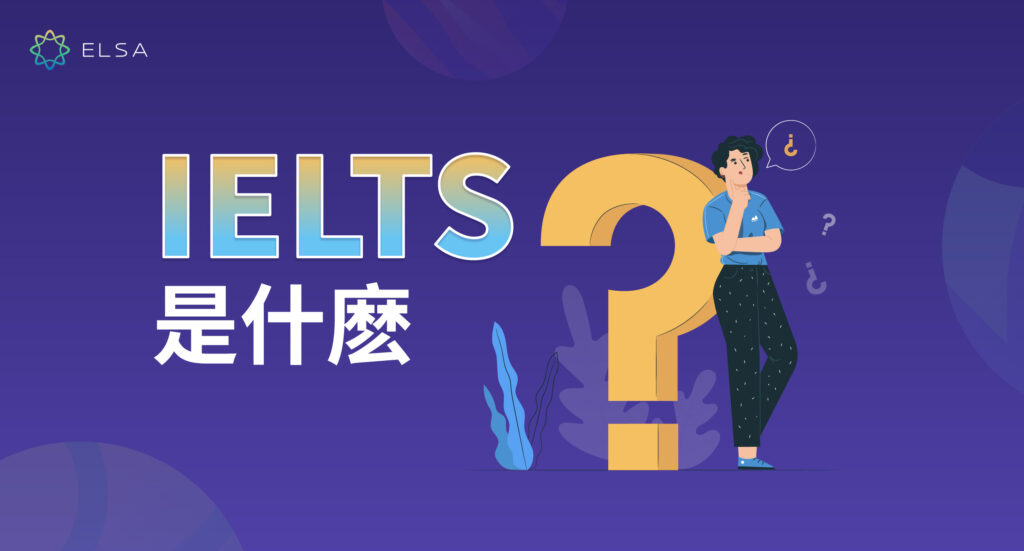
雅思 (International English Language Testing System) 是國際英語測試系統,由英國文化協會、澳大利亞 IDP 教育機構和劍橋大學 ESOL 考試部於1989年創立。
目前,雅思 考試已在全球 150個國家設有超過 1200個考試中心。超過 12,000所大學、學院及機構要求申請者提供 雅思 證書,以評估其英語水平。
學習雅思的好處

- 雅思 是進入英聯邦國家大學的入場券
英聯邦國家的大學,特別是澳大利亞,承認 雅思。只需達到要求的 雅思 成績並符合其他條件,您將成為正式的學生,無需額外考試。
- 雅思 獲得許多外國企業的認可
許多外國企業,尤其是英聯邦國家的公司,要求員工具備英語能力。雅思 證書能使應聘者在這些公司求職時更具競爭力。
- 學習 雅思 能全面提升英語能力
雅思 測試聽、說、讀、寫四項技能,幫助學習者改善實際的英語運用能力,特別是加強弱項如聽力和口語。

應該考雅思 Academic 還是雅思 General Training
雅思 考試主要有兩種形式:雅思 Academic 和 雅思 General Training。
- Academic 考試 適合想要申請大學、學院或國際培訓課程的人。
- General Training 考試 適合在使用英語國家申請工作、學徒或移民需求的人。
這兩種考試都包括:聽力、口語、閱讀、寫作四個部分。然而,閱讀和寫作部分會因考試目的的不同而有所差異。雅思 證書有效期為自考生收到成績單之日起兩年。
雅思考試結構
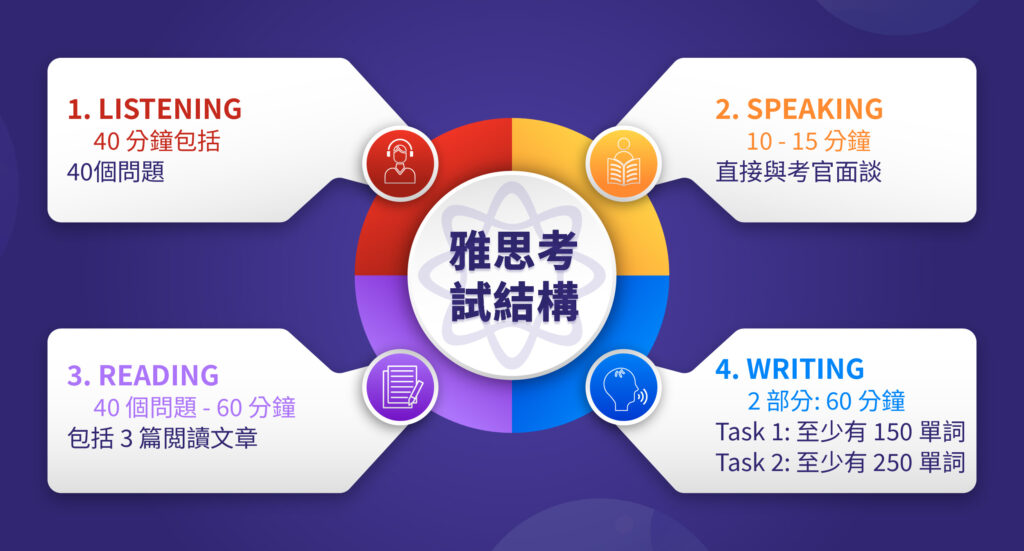
聽力部分結構
Academic 和 General Training 的 雅思 聽力部分的內容和形式結構完全相同。雅思 聽力部分考題包括4個部分,每個部分有一段音頻。考生需聽4段音頻並回答40個問題,每部分10個問題,難度逐漸增加。
計分方式:每個問題對應1分,總共40題滿分40分。
需要注意的是,每段音頻在考試中只播放一次,音頻中可能包含不同地區的口音,如英國、澳大利亞、新西蘭、美國和加拿大。
各部分的內容分配如下:
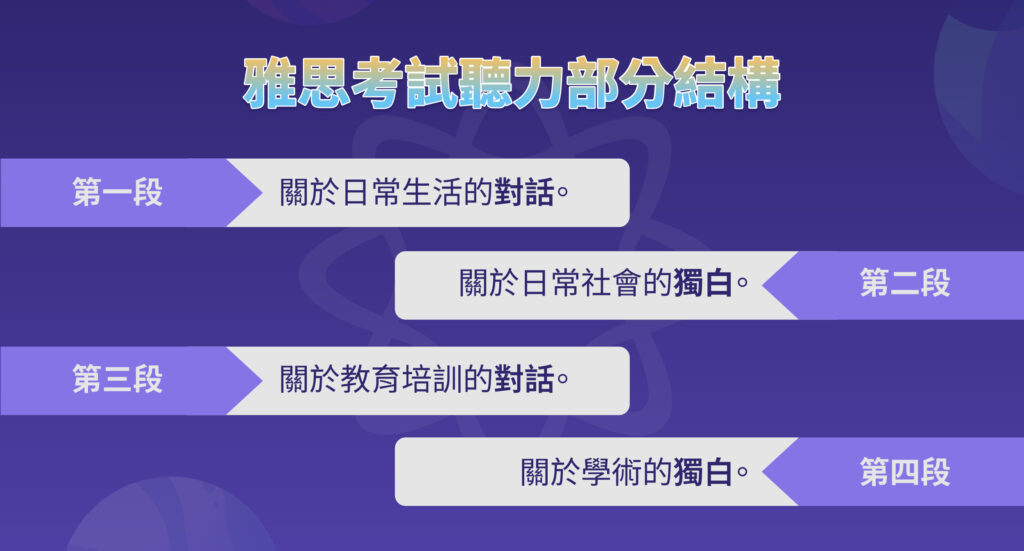
| 部分 | 考試內容 |
| 第一段(10個問題) | 兩個人之間的日常生活對話。 |
| 第二段(10個問題) | 關於社會生活的獨白。 例如:描述當地設施的感受。 |
| 第三段(10個問題) | 多人(2-4人)的對話,通常與教育或培訓相關。例如:學生與導師討論某個作業。 |
| 第四段(10個問題) | 關於學術主題的獨白。 例如:老師在課堂上的講解。 |
根據 IDP 和英國文化協會的官方信息,無論是 Academic 還是 General Training 形式,聽力部分的考試時間均為 30 分鐘。在每部分考試開始前,考生將有 1 分鐘的時間閱讀問題。
這部分的考試題型設計多樣化,包括:
- Multiple choice: 從給定選項中選擇最正確的答案。
- Matching: 將問題與答案匹配,使其與聽力內容相符。
- Labeling a Map/Diagram: 填寫答案以完成一個方案,地圖或圖表。
- Form, note, table, flowchart, summary completion: 在提供的表格中填寫空缺細節。
- Short answer question: 根據聽力內容回答問題。
- Sentence completion (句子填空): 考生需要根據聽力內容,在段落、表格或圖中填寫單詞或詞組(最多 3 個單詞)。
閱讀部分結構
雅思 閱讀部分結構包括 3 篇文章,共 40 道問題,難度逐漸增加。Academic 閱讀和 General Training 閱讀的題型結構相同,但是兩者的內容和主題有所不同:
計分方式:每個正確答案得 1 分,共 40 道問題滿分為 40 分。
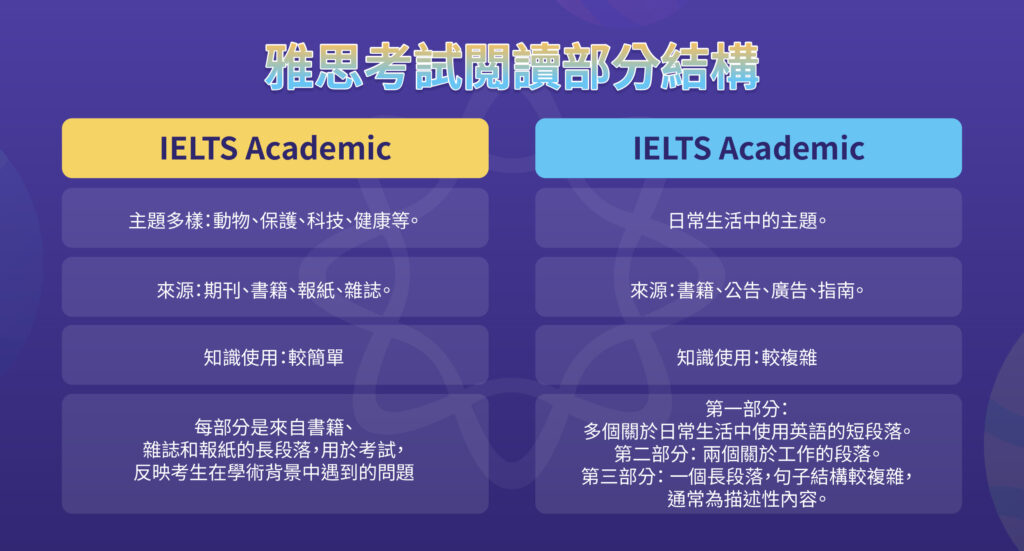
注意:每部分的問題數量並不固定。
雅思 閱讀部分的總考試時間為 60 分鐘。
這部分的考試設計有多種題型,包括:
- Multiple choice (選擇題): 選擇正確的答案。
- True, False 和 Not Given: 考生根據文章信息對陳述進行分類。
- Yes/No/Not Given: 與 True, False, Not Given 類似, 不同之處在於需要判斷問題是否與文章一致。
- Matching Information: 查找文章中的具體信息。
- Matching Headings: 將給出的標題與文章中的段落進行匹配。
- Matching Features: 將一組信息與選項列表進行匹配。
- Matching Sentence Ending: 將句子的前半部分與文章內容進行匹配。
- Sentence Completion: 在空格中填入單詞或/和數字。
- Notes/Table/Flowchart Completion: 完成表格、圖表中的空白部分。
- Diagram Labelling: 根據文章描述完成圖表標籤。
- Short Answer Questions: 回答與文章信息相關的問題。
寫作部分結構
雅思 寫作部分結構包括兩個部分:Writing Task 1 和 Writing Task 2。
計分方式:寫作部分根據四個評分標準評分,每個標準占 25%。每個標準的評分範圍為 0 到 9 分,四個標準的平均分將四捨五入取最近的整數,作為最終寫作成績。
- 雅思 Writing Task 1
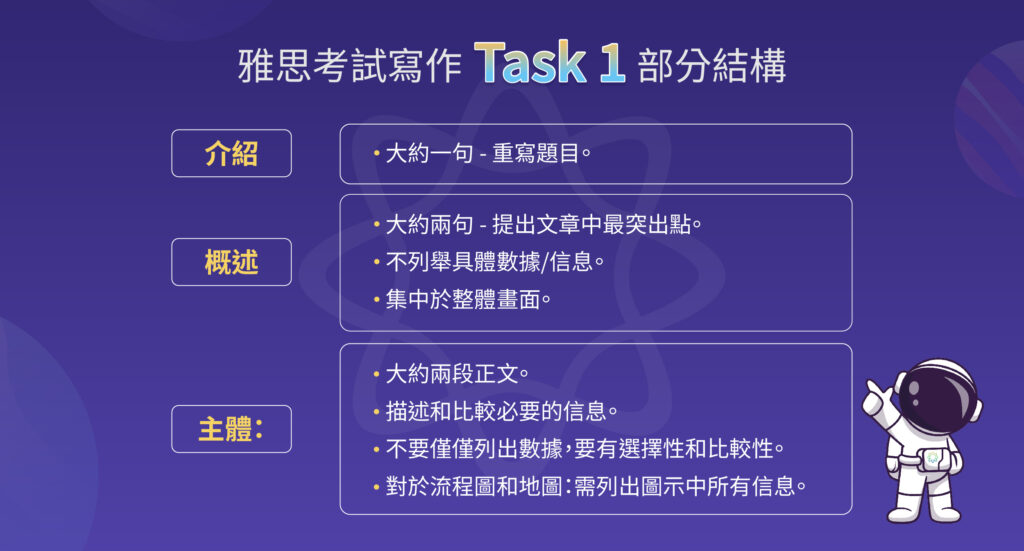
雅思 Academic 和 雅思 General Training 的通用信息:
- Writing 部分的 Task 1 佔總分的 1/3。
- 考生應該分配 20 分鐘來完成這部分(1/3 * 60 分鐘 = 20 分鐘)。
| 標準 | Task 1 – 雅思 Academic | Task 1 – 雅思 General Training |
| 題目 | 考生需根據圖表、圖畫、數據圖等描述主要信息。 | 考生需寫一封回應生活中常見情境的信件。 例如:給招聘者寫電子郵件,解釋最近遇到的困難。 |
| 語體 | 學術或 semi-formal/neutral | Informal, semi-formal 或 formal, 取決於收信人。(考生需根據情境自行判斷應使用何種語體) |
| 最低字數 | 150字,少於 150 字會被扣分 | 150 字,少於 150 字會被扣分 |
- 雅思 Writing Task 2
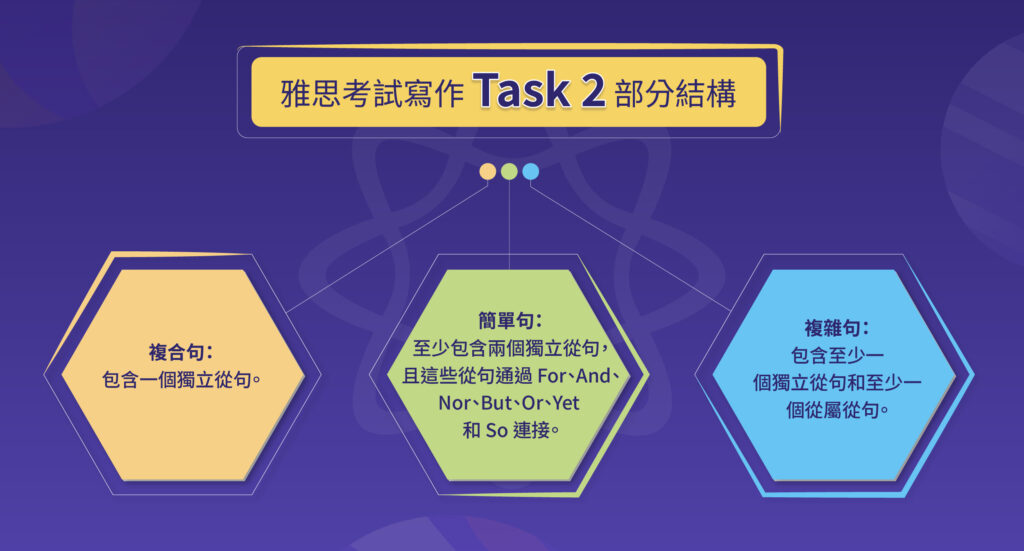
雅思 Academic 和 雅思 General Training 的通用信息:
- Task 2 佔 Writing 部分總分的 2/3。
- 考生應分配 40 分鐘來完成 Task 2(2/3 * 60 分鐘 = 40 分鐘)。
| Task 2 – 雅思 Academic | Task 2 – 雅思 General Training | |
| 題目 | 考生需根據題目要求對某一主題進行討論。 | 題目可能給出觀點、論點或問題,要求考生解決該問題。 例如:根據提供的信息提出觀點、解決方案或創意。 |
| 語體 | 學術或 semi-formal/neutral | Semi-formal/ neutral |
| 最低字數 | 250 字,少於 250 字會被扣分。 | 250 字,少於 250 字會被扣分。 |
Writing 部分適用於 雅思 Academic 和 General Training 的總考試時間為 60 分鐘
此部分的考試題型設計如下:
Writing Task 1
- 描述所提供信息中的趨勢或變化。
- 比較來自兩個或多個來源的數據。
- 描述提供的信息的具體細節。
Writing Task 2
- Task 2 的題目通常提出一個問題或情境,要求考生對此表達自己的觀點。
- 題目要求考生同意或不同意某一觀點。
- 題目要求考生提出解決方案來解決一個問題。
- 題目要求考生比較兩種對立觀點。
Speaking 部分的結構
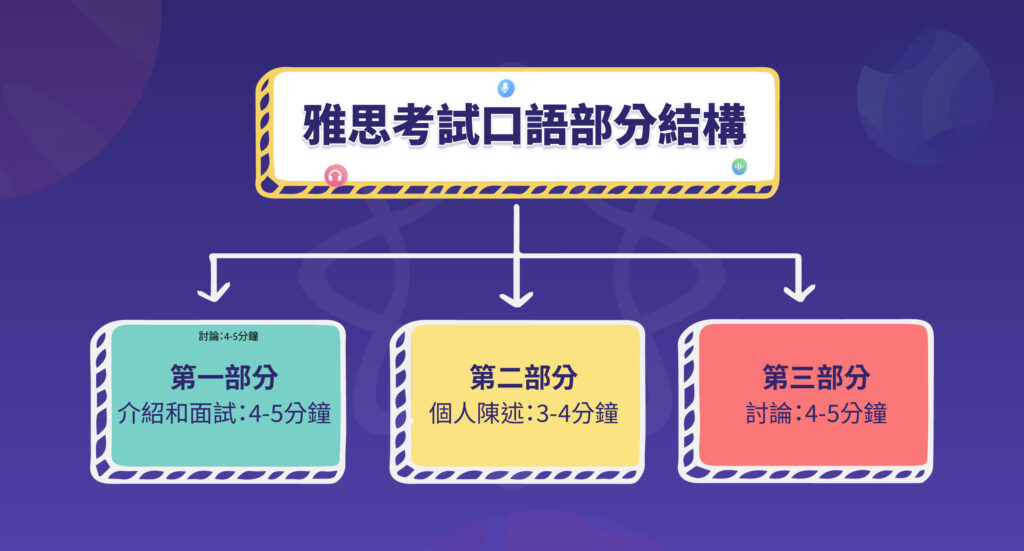
雅思 Speaking 考試分為三個部分,總時長約 11-14 分鐘。考生在開始每個部分之前有 1 分鐘的準備時間。無論是 雅思 Academic 還是 雅思 General Training,Speaking 考試的內容都相同。
雅思 Speaking 考試的結果將由考官當場打分,但不會向考生公開。考試的最終結果會與其他部分一起公佈。此部分的考試過程將被錄音,用於內部審核或考生申請重新評分的情況。
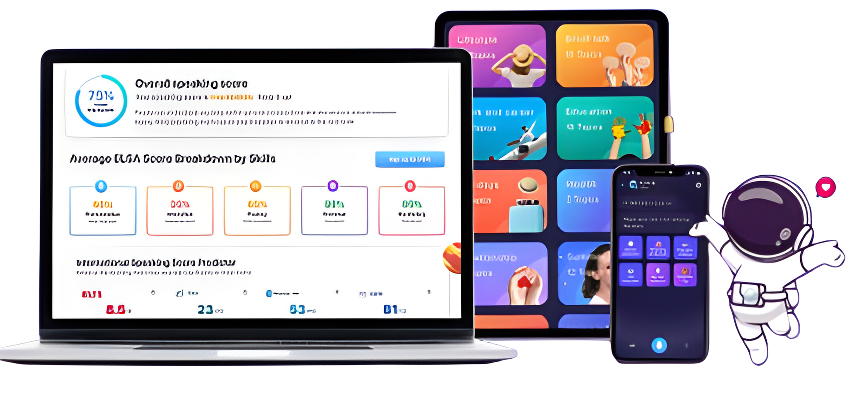
不要錯過具有大量功能的英語學習包
ELSA Premium 終身套餐 – 最優惠
原價:9,450元 現在 5,260 元
ELSA Premium 還有另外以下的學習包:
ELSA Premium 一年:原價:5,250元 現在 2,465 元
ELSA Premium 三個月:原價:2,100元 現在 1,106 元
考試各部分內容如下:
| 考試部分 | 內容 |
| 部分 1 | 自我介紹及與考官的面試。考官會問考生一些關於個人、家庭、愛好和工作等的問題。時長 4-5 分鐘。 |
| 部分 2 | 考官提供一個主題以及提示問題(Cue Card),要求考生發表演講。考生將有 1 分鐘準備時間,隨後進行 2 分鐘的演講。在考生結束演講後,考官可能會進一步提問(非必須)。 |
| 部分 3 | 進一步討論與部分 2 主題相關的問題。時長約 4-5 分鐘。 |
以下是 雅思 Speaking 的一些問題示例
| 考試部分 | 主題 |
| 部分 1 | 主題: Work/ Study – Are you a student or do you work? – Do you enjoy what you study? |
| 部分 2: | Describe an English lesson you had and enjoyed. You should say: – What it was about – When you had it – What the teacher did – And explain why you enjoyed the lesson. |
| 部分 3: | – Why do you think people learn multiple languages? – What is a good English teacher? – Many people think that it’s normal for children to like to break the rules, right? – Are there any signs on those vehicles? |
雅思考試時間
雅思 的 Listening、Reading 和 Writing 三個部分的考試時間總計 3 小時,通常安排在上午 9:00 至 12:00 進行。Speaking 考試的時間和地點會通過考試通知單、電子郵件或電話通知。
考生可以選擇每週大多數日子舉行的機考,或每月 3-4 次的紙筆考試。考生應定期查看考試日程,以選擇合適的時間。
雅思报名考試指引
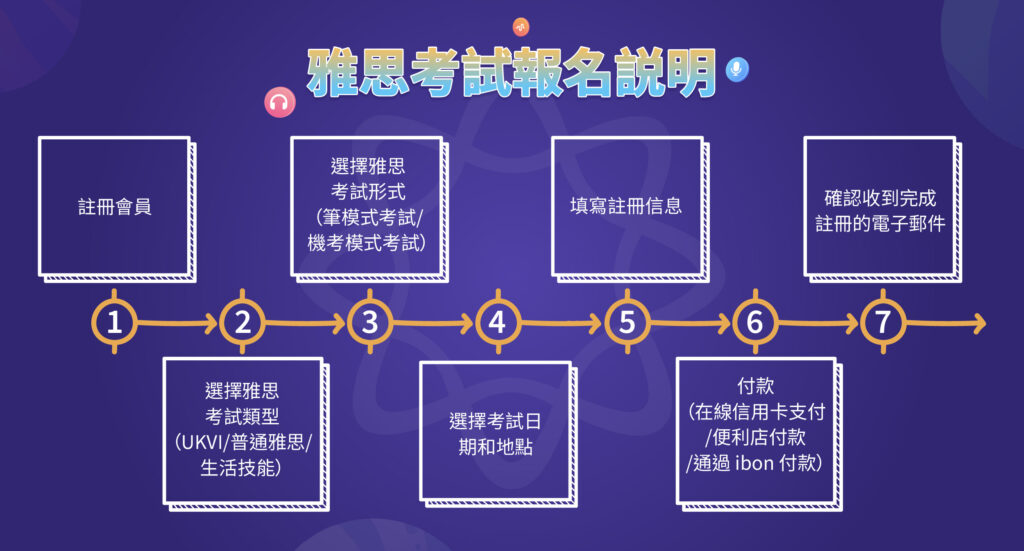
- 在線報名
1. 註冊會員
2. 選擇 雅思 考試類型 (UKVI/雅思 通用/Life Skills)
3. 選擇 雅思考試形式 (機考/紙筆考試)
4. 選擇考試日期和地點
5. 填寫報名信息
6. 支付 (可通過在線信用卡/便利店支付/ibon 支付)
7. 確認收到報名完成的電子郵件
- 雅思 機構直接報名
1. 下載 雅思 報名表和填寫範例。
2. 帶上填寫好的報名表和有效護照副本前往授權的 雅思 報名中心。
3. 現場報名只接受現金支付。
雅思考試前應做的準備
- 除了攜帶完整的個人證件和考試確認書,按時到達指定地點外別遲到,請務必帶上所有必要的文件,以免在考試過程中遇到問題。
- 在考試前 3 到 4 週進行溫習與做模擬測試,熟悉考試結構和時間壓力。
- 不要在考前一天學習新的知識,保持精神放鬆,記住簡單的考試技巧,專注於考試。
- 在考試前一週,明確自己想要達到的分數,調整自己的努力方向。
- 確保在考前充分休息,保持身體健康和精神清醒,以便在考試中取得最佳表現。
比較雅思與多益和托福
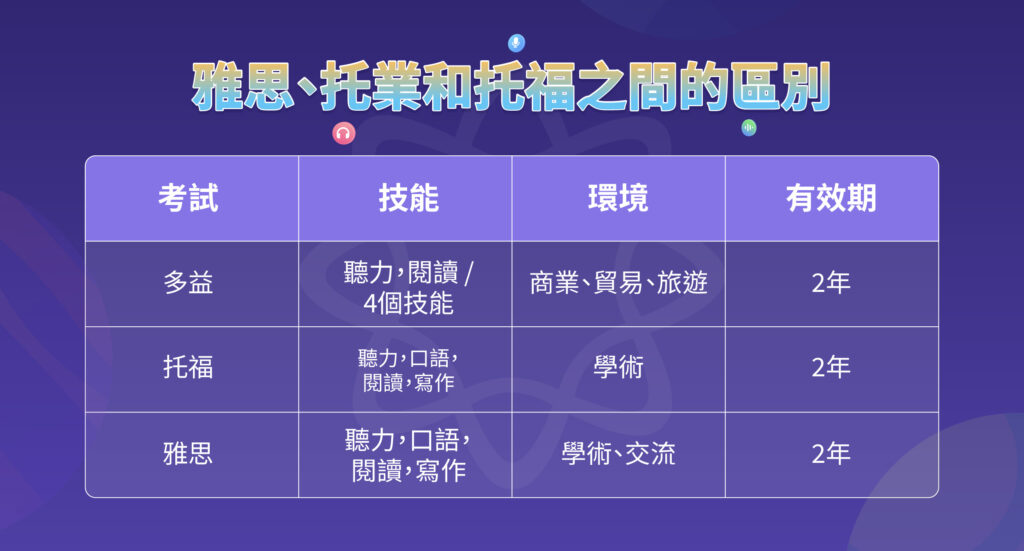
相似點
- 英語評估: 皆評估考生的英語運用能力。
- 技能: 均測試聽、說、讀、寫四項技能。
- 價值: 證書有效期為兩年。
- 國際認可: 在全球範圍內被廣泛認可。
- 報名要求: 均要求提前報名,可在線或在授權中心進行。
不同點
| 考試 | 技能 | 環境 | 組織機構 | 考試次數 | 有效期 | 費用 |
| 多益 | 聽力、閱讀 / 四項技能 | 商業、貿易、旅遊 | ETS | 每天 (週一至週六) | 2 年 | 1.700 元 – 3.300 元 |
| 托福 | 聽力、口語、閱讀、寫作 | 學術 | ETS | 每月 4-5 次 | 2 年 | 約 6.900 元 |
| 雅思 | 聽力、口語、閱讀、寫作 | 學術、交流 | 劍橋大學, BC, IDP | 每月 3-4 次 | 2 年 | 7.500 元 |
>>多益相關信息:
常見問題
雅思考什麼技能?
雅思: 測試聽力、口語、閱讀、寫作四項技能,適用於學術和日常交流環境。
雅思考試費用是多少?
雅思考試費用: 約為 7.500 元。
我可以在哪裡練習雅思 準備考試?
您可以在 雅思 培訓中心或在線進行考試準備。
多益 托福 雅思哪個考試更難?
雅思、多益 和 托福 的難度取決於考生的目標和使用情境。對於專注於學術和日常交流的考生來說,雅思 可能更具挑戰性;對於需要在大學學術環境中使用英語的考生來說,托福 可能更難;而對於需要測試商業和職場英語能力的人,多益 通常較容易。
以上是 ELSA Speak 提供的最新 雅思 考試資訊,希望本文能幫助您更好地了解 雅思,請關注 ELSA Speak 的後續文章!觀看各課程/考試專欄瞭解更多精彩内容吧!